1.1 What Is Economics, and Why Is It Important?
Learning objectives.
By the end of this section, you will be able to:
- Discuss the importance of studying economics
- Explain the relationship between production and division of labor
- Evaluate the significance of scarcity
Economics is the study of how humans make decisions in the face of scarcity. These can be individual decisions, family decisions, business decisions or societal decisions. If you look around carefully, you will see that scarcity is a fact of life. Scarcity means that human wants for goods, services and resources exceed what is available. Resources, such as labor, tools, land, and raw materials are necessary to produce the goods and services we want but they exist in limited supply. Of course, the ultimate scarce resource is time- everyone, rich or poor, has just 24 expendable hours in the day to earn income to acquire goods and services, for leisure time, or for sleep. At any point in time, there is only a finite amount of resources available.
Think about it this way: In 2015 the labor force in the United States contained over 158 million workers, according to the U.S. Bureau of Labor Statistics. The total land area was 3,794,101 square miles. While these are certainly large numbers, they are not infinite. Because these resources are limited, so are the numbers of goods and services we produce with them. Combine this with the fact that human wants seem to be virtually infinite, and you can see why scarcity is a problem.

Introduction to FRED
Data is very important in economics because it describes and measures the issues and problems that economics seek to understand. A variety of government agencies publish economic and social data. For this course, we will generally use data from the St. Louis Federal Reserve Bank's FRED database. FRED is very user friendly. It allows you to display data in tables or charts, and you can easily download it into spreadsheet form if you want to use the data for other purposes. The FRED website includes data on nearly 400,000 domestic and international variables over time, in the following broad categories:
- Money, Banking & Finance
- Population, Employment, & Labor Markets (including Income Distribution)
- National Accounts (Gross Domestic Product & its components), Flow of Funds, and International Accounts
- Production & Business Activity (including Business Cycles)
- Prices & Inflation (including the Consumer Price Index, the Producer Price Index, and the Employment Cost Index)
- International Data from other nations
- U.S. Regional Data
- Academic Data (including Penn World Tables & NBER Macrohistory database)
For more information about how to use FRED, see the variety of videos on YouTube starting with this introduction.
If you still do not believe that scarcity is a problem, consider the following: Does everyone require food to eat? Does everyone need a decent place to live? Does everyone have access to healthcare? In every country in the world, there are people who are hungry, homeless (for example, those who call park benches their beds, as Figure 1.2 shows), and in need of healthcare, just to focus on a few critical goods and services. Why is this the case? It is because of scarcity. Let’s delve into the concept of scarcity a little deeper, because it is crucial to understanding economics.
The Problem of Scarcity
Think about all the things you consume: food, shelter, clothing, transportation, healthcare, and entertainment. How do you acquire those items? You do not produce them yourself. You buy them. How do you afford the things you buy? You work for pay. If you do not, someone else does on your behalf. Yet most of us never have enough income to buy all the things we want. This is because of scarcity. So how do we solve it?
Visit this website to read about how the United States is dealing with scarcity in resources.
Every society, at every level, must make choices about how to use its resources. Families must decide whether to spend their money on a new car or a fancy vacation. Towns must choose whether to put more of the budget into police and fire protection or into the school system. Nations must decide whether to devote more funds to national defense or to protecting the environment. In most cases, there just isn’t enough money in the budget to do everything. How do we use our limited resources the best way possible, that is, to obtain the most goods and services we can? There are a couple of options. First, we could each produce everything we each consume. Alternatively, we could each produce some of what we want to consume, and “trade” for the rest of what we want. Let’s explore these options. Why do we not each just produce all of the things we consume? Think back to pioneer days, when individuals knew how to do so much more than we do today, from building their homes, to growing their crops, to hunting for food, to repairing their equipment. Most of us do not know how to do all—or any—of those things, but it is not because we could not learn. Rather, we do not have to. The reason why is something called the division and specialization of labor , a production innovation first put forth by Adam Smith ( Figure 1.3 ) in his book, The Wealth of Nations .
The Division of and Specialization of Labor
The formal study of economics began when Adam Smith (1723–1790) published his famous book The Wealth of Nations in 1776. Many authors had written on economics in the centuries before Smith, but he was the first to address the subject in a comprehensive way. In the first chapter, Smith introduces the concept of division of labor , which means that the way one produces a good or service is divided into a number of tasks that different workers perform, instead of all the tasks being done by the same person.
To illustrate division of labor, Smith counted how many tasks went into making a pin: drawing out a piece of wire, cutting it to the right length, straightening it, putting a head on one end and a point on the other, and packaging pins for sale, to name just a few. Smith counted 18 distinct tasks that different people performed—all for a pin, believe it or not!
Modern businesses divide tasks as well. Even a relatively simple business like a restaurant divides the task of serving meals into a range of jobs like top chef, sous chefs, less-skilled kitchen help, servers to wait on the tables, a greeter at the door, janitors to clean up, and a business manager to handle paychecks and bills—not to mention the economic connections a restaurant has with suppliers of food, furniture, kitchen equipment, and the building where it is located. A complex business like a large manufacturing factory, such as the shoe factory ( Figure 1.4 ), or a hospital can have hundreds of job classifications.
Why the Division of Labor Increases Production
When we divide and subdivide the tasks involved with producing a good or service, workers and businesses can produce a greater quantity of output. In his observations of pin factories, Smith noticed that one worker alone might make 20 pins in a day, but that a small business of 10 workers (some of whom would need to complete two or three of the 18 tasks involved with pin-making), could make 48,000 pins in a day. How can a group of workers, each specializing in certain tasks, produce so much more than the same number of workers who try to produce the entire good or service by themselves? Smith offered three reasons.
First, specialization in a particular small job allows workers to focus on the parts of the production process where they have an advantage. (In later chapters, we will develop this idea by discussing comparative advantage .) People have different skills, talents, and interests, so they will be better at some jobs than at others. The particular advantages may be based on educational choices, which are in turn shaped by interests and talents. Only those with medical degrees qualify to become doctors, for instance. For some goods, geography affects specialization. For example, it is easier to be a wheat farmer in North Dakota than in Florida, but easier to run a tourist hotel in Florida than in North Dakota. If you live in or near a big city, it is easier to attract enough customers to operate a successful dry cleaning business or movie theater than if you live in a sparsely populated rural area. Whatever the reason, if people specialize in the production of what they do best, they will be more effective than if they produce a combination of things, some of which they are good at and some of which they are not.
Second, workers who specialize in certain tasks often learn to produce more quickly and with higher quality. This pattern holds true for many workers, including assembly line laborers who build cars, stylists who cut hair, and doctors who perform heart surgery. In fact, specialized workers often know their jobs well enough to suggest innovative ways to do their work faster and better.
A similar pattern often operates within businesses. In many cases, a business that focuses on one or a few products (sometimes called its “ core competency ”) is more successful than firms that try to make a wide range of products.
Third, specialization allows businesses to take advantage of economies of scale , which means that for many goods, as the level of production increases, the average cost of producing each individual unit declines. For example, if a factory produces only 100 cars per year, each car will be quite expensive to make on average. However, if a factory produces 50,000 cars each year, then it can set up an assembly line with huge machines and workers performing specialized tasks, and the average cost of production per car will be lower. The ultimate result of workers who can focus on their preferences and talents, learn to do their specialized jobs better, and work in larger organizations is that society as a whole can produce and consume far more than if each person tried to produce all of their own goods and services. The division and specialization of labor has been a force against the problem of scarcity.
Trade and Markets
Specialization only makes sense, though, if workers can use the pay they receive for doing their jobs to purchase the other goods and services that they need. In short, specialization requires trade.
You do not have to know anything about electronics or sound systems to play music—you just buy an iPod or MP3 player, download the music, and listen. You do not have to know anything about artificial fibers or the construction of sewing machines if you need a jacket—you just buy the jacket and wear it. You do not need to know anything about internal combustion engines to operate a car—you just get in and drive. Instead of trying to acquire all the knowledge and skills involved in producing all of the goods and services that you wish to consume, the market allows you to learn a specialized set of skills and then use the pay you receive to buy the goods and services you need or want. This is how our modern society has evolved into a strong economy.
Why Study Economics?
Now that you have an overview on what economics studies, let’s quickly discuss why you are right to study it. Economics is not primarily a collection of facts to memorize, although there are plenty of important concepts to learn. Instead, think of economics as a collection of questions to answer or puzzles to work. Most importantly, economics provides the tools to solve those puzzles.
Consider the complex and critical issue of education barriers on national and regional levels, which affect millions of people and result in widespread poverty and inequality. Governments, aid organizations, and wealthy individuals spend billions of dollars each year trying to address these issues. Nations announce the revitalization of their education programs; tech companies donate devices and infrastructure, and celebrities and charities build schools and sponsor students. Yet the problems remain, sometimes almost as pronounced as they were before the intervention. Why is that the case? In 2019, three economists—Esther Duflo, Abhijit Banerjee, and Michael Kremer—were awarded the Nobel Prize for their work to answer those questions. They worked diligently to break the widespread problems into smaller pieces, and experimented with small interventions to test success. The award citation credited their work with giving the world better tools and information to address poverty and improve education. Esther Duflo, who is the youngest person and second woman to win the Nobel Prize in Economics, said, "We believed that like the war on cancer, the war on poverty was not going to be won in one major battle, but in a series of small triumphs. . . . This work and the culture of learning that it fostered in governments has led to real improvement in the lives of hundreds of millions of poor people.”
As you can see, economics affects far more than business. For example:
- Virtually every major problem facing the world today, from global warming, to world poverty, to the conflicts in Syria, Afghanistan, and Somalia, has an economic dimension. If you are going to be part of solving those problems, you need to be able to understand them. Economics is crucial.
- It is hard to overstate the importance of economics to good citizenship. You need to be able to vote intelligently on budgets, regulations, and laws in general. When the U.S. government came close to a standstill at the end of 2012 due to the “fiscal cliff,” what were the issues? Did you know?
- A basic understanding of economics makes you a well-rounded thinker. When you read articles about economic issues, you will understand and be able to evaluate the writer’s argument. When you hear classmates, co-workers, or political candidates talking about economics, you will be able to distinguish between common sense and nonsense. You will find new ways of thinking about current events and about personal and business decisions, as well as current events and politics.
The study of economics does not dictate the answers, but it can illuminate the different choices.
As an Amazon Associate we earn from qualifying purchases.
This book may not be used in the training of large language models or otherwise be ingested into large language models or generative AI offerings without OpenStax's permission.
Want to cite, share, or modify this book? This book uses the Creative Commons Attribution License and you must attribute OpenStax.
Access for free at https://openstax.org/books/principles-economics-3e/pages/1-introduction
- Authors: Steven A. Greenlaw, David Shapiro, Daniel MacDonald
- Publisher/website: OpenStax
- Book title: Principles of Economics 3e
- Publication date: Dec 14, 2022
- Location: Houston, Texas
- Book URL: https://openstax.org/books/principles-economics-3e/pages/1-introduction
- Section URL: https://openstax.org/books/principles-economics-3e/pages/1-1-what-is-economics-and-why-is-it-important
© Jan 23, 2024 OpenStax. Textbook content produced by OpenStax is licensed under a Creative Commons Attribution License . The OpenStax name, OpenStax logo, OpenStax book covers, OpenStax CNX name, and OpenStax CNX logo are not subject to the Creative Commons license and may not be reproduced without the prior and express written consent of Rice University.
Economics Essay Topics: Valuable Tips

Economics is a subject that has gained immense popularity in recent times. It deals with interesting economics topics like the production, distribution, and consumption of goods and services. Moreover, it is a social science that provides insights into how individuals, businesses, and governments make decisions that affect the overall economy. Given its importance, economics essays have become a crucial part of the curriculum for students pursuing various degrees.
Short Description
In this article, our essay writer will take you on a journey through various exciting topics in economics. We'll cover everything from big-picture concepts like macroeconomics to more focused ideas like microeconomics, international trade, and economic policy. Our goal is to help you find the perfect topic for your economics essay—one that matches your interests and demonstrates your understanding of how economics affects the real world.
🎓 What is Economics: Understanding the Importance
Before we dive into the different economics essay topics, it is crucial to understand what economics is and its importance. Economics is a social science that deals with the production, distribution, and consumption of goods and services. It is concerned with how individuals, businesses, and governments make decisions about allocating resources to satisfy their unlimited wants and needs.
Economics as a science provides a framework for analyzing society's production, distribution, and consumption of goods and services. It helps us understand how markets work and how they can be improved to increase efficiency and welfare. Moreover, economic principles have significant implications for various social issues, including poverty, inequality, environmental sustainability, and public policy. By studying economics essay topics, we can gain insights into these issues and develop policies that promote rapid economic growth and social welfare.

When it comes to economics, the range of essay topics is vast and covers various aspects of human interactions on different levels. With so many possibilities to explore, we understand the difficulty of narrowing down your options. That's why our ' write me an essay ' experts are here to offer their guidance and support. We're ready to help you select the ideal topic if you wish to learn how to write informative essay on economics.

🧩 Tips for Choosing Your Ideal Topic
Choosing a topic is the first and most crucial step in writing an economics essay. Your topic will determine the direction and scope of your essay. Here are some tips for choosing the ideal topic from our finance essay writing service :
Tip 1: Understand the relevance of economics to daily life and choose a topic with practical applications.
Recognize that economics plays a significant role in our everyday lives, as it encompasses the production, distribution, and consumption of goods and services. Therefore, when selecting a topic, ensure its societal relevance. For instance, you might consider exploring 'The Impact of Automation on Employment Rates' or 'The Role of Government Regulations in Controlling Inflation.'
Tip 2: Opt for narrow economics research topics to make them more manageable and allow for in-depth exploration.
Instead of tackling broad subjects like 'International Trade,' narrow down your focus to something like 'The Effects of Tariffs on Small Businesses in the Agriculture Sector' or 'The Relationship Between Exchange Rates and Export Performance in Developing Countries.' By delving deeper into a specific aspect, you can provide more detailed financial analysis and insights.
Tip 3: Conduct preliminary research to identify current topics, debates, and research gaps.
Before finalizing your topic, engage in preliminary research to gain an understanding of recent trends and issues in economics. Explore academic journals, news articles, and books to discover areas that warrant further exploration. For example, you might come across intriguing research gaps such as 'The Impact of Cryptocurrencies on Financial Markets' or 'The Role of Behavioral Economics in Shaping Consumer Decision-Making.'
Tip 4: Seek input from peers or professors to enhance your topic selection process.
Collaborate with your peers during brainstorming sessions to generate fresh ideas and gain different perspectives on potential topics. Additionally, seek guidance from your professor, who can offer valuable insights and feedback to refine your chosen topic. For instance, you can discuss your ideas with classmates and receive suggestions like 'The Influence of Economic Policies on Income Inequality' or receive expert advice from your professor on 'The Implications of Globalization on Developing Economies.'
And if you want expert assistance in applying theoretical concepts to practice and creating an exceptional paper, then address your request to our custom essay writing services .

🗒 Economics Essay Topics: A Comprehensive List
If you are looking for a comprehensive list of interesting economics essay topics, you have come to the right place. Here are some ideas that you can consider:

- The role of central banks in fiscal policy: You can explore the role of central banks in implementing fiscal policies, such as setting interest rates, regulating money supply, and managing inflation.
- The effects of automation on the labor market: You can explore the impact of automation on the labor market, including the displacement of workers and the emergence of new job opportunities.
- The impact of immigration on the labor market: You can explore the impact of immigration on the labor market, including the effects on wages, employment opportunities, and economic growth.
- The economics of climate change: You can explore the economic impact of climate change, including the costs of mitigation and adaptation measures, the effects on industries, and the role of governments in addressing the issue.
- The economics of healthcare: You can explore the economics of healthcare, including the costs of healthcare, the role of insurance companies, and the impact of healthcare policies on the economy.
- The role of government in the economy: You can explore the role of governments in implementing economic policies, including fiscal and monetary policies, and the impact of these policies on the economy.
- The impact of globalization on the economy: You can explore the economic implications of globalization, including the effects on industries, trade, and employment opportunities.
- The economics of poverty and inequality: You can explore the economics of poverty and inequality, including the causes and effects of poverty and inequality and the role of governments in addressing these issues.
- The economics of education: You can explore the economics of education, including the costs of education, the impact of education on economic growth, and the role of governments in promoting education.
- The role of competition in the marketplace: You can explore the role of competition in promoting economic growth, innovation, and consumer welfare.
- The economics of entrepreneurship: You can explore the economics of entrepreneurship, including the factors that promote entrepreneurship, the impact of entrepreneurship on the economy, and the role of governments in promoting entrepreneurship.
- The impact of quantitative easing on economic recovery: You can explore the consequences of large-scale asset purchases and their influence on inflation, employment rates, and overall economic stability.
- The economics of renewable energy transition: You can analyze the costs, benefits, and challenges associated with adopting renewable energy technologies and their potential effects on energy prices, employment, and environmental sustainability.
- The role of technological innovation in economic development: You can examine the impact of research and development, technological diffusion, and digitalization on productivity, job creation, and competitiveness in various sectors of the economy.
- Behavioral economics and consumer decision-making: You can examine concepts such as cognitive biases, heuristics, and framing effects and explore how these factors shape consumer behavior, market outcomes, and the effectiveness of public policies.
Ready to Advance Yourself in the Economics Field?
Get the essay that will have even experts in awe!
🧮 Macroeconomics Essay Topics
Macroeconomics is a fascinating and complex field of study that aims to understand the overall performance of an economy. It takes into account various factors such as economic growth, inflation, unemployment, and trade policies. If you are looking for some thought-provoking macroeconomics essay topics, here are a few that you might find interesting:
- The role of digital currencies (cryptocurrencies) in the global economy and their impact on monetary policy.
- The economics of aging populations: Analyzing the challenges and opportunities associated with demographic shifts.
- The impact of trade wars and protectionist policies on global economic growth and international trade.
- The economics of happiness and well-being: Investigating the relationship between economic factors and subjective measures of life satisfaction.
- The role of government spending in stimulating economic growth and addressing income inequality.
- The economics of urbanization: Examining the effects of urban growth on productivity, income distribution, and resource allocation.
- The impact of automation and artificial intelligence on employment and the future of work.
- The economics of climate change: Analyzing the economic costs and benefits of climate policies and the transition to a low-carbon economy.
- The role of financial markets in transmitting economic shocks and their implications for systemic risk and financial stability.
- The economics of inequality: Investigating the causes and consequences of income and wealth disparities within and between countries.
📉 Microeconomics Essay Topics
Microeconomics focuses on the behavior of individual consumers and businesses in the market. The principles of microeconomics are used to analyze how these entities make decisions, interact with each other, and influence the overall economy. If you're interested in exploring this field further, here are some microeconomics essay topics that you might find interesting:
- Behavioral economics and its implications for consumer decision-making.
- The impact of artificial intelligence and automation on labor economics and income inequality.
- Pricing strategies in the sharing economy: A critical analysis of platforms like Uber and Airbnb.
- The economics of addiction: Analyzing the factors influencing consumer behavior and the effects on individual welfare.
- The role of information and asymmetry in financial markets: Examining the impact on investor decision-making and market efficiency.
- Game theory and its application in strategic decision-making in business and economics.
- The economics of innovation and entrepreneurship: Studying the factors that drive technological advancements and their impact on economic growth.
- Health economics: Analyzing the relationship between healthcare expenditure, access, and health outcomes.
- The economics of education: Investigating the determinants of educational attainment and its effects on individual and societal welfare.
- The economics of discrimination: Examining the economic implications of bias based on race, gender, or other factors in labor markets and beyond.
🎏 International Economics Essay Topics
International economics deals with the economic interactions between countries, including trade, investment, and migration. Here are some international economic relations topics:
- The impact of trade liberalization on developing economies: A comparative analysis of different trade policies and their effects on economic growth and income distribution.
- The role of foreign direct investment (FDI) in promoting technological transfer and industrial development in emerging markets.
- The economics of global supply chains: Analyzing the benefits and challenges of interconnected production networks in the context of international trade.
- The implications of Brexit on the European Union and the United Kingdom: Assessing the economic consequences and potential trade arrangements.
- The role of international institutions (such as the World Trade Organization, International Monetary Fund, etc.) in governing global economic relations: Evaluating their effectiveness and relevance in modern world economics.
- The economics of currency exchange rates: Examining the factors influencing exchange rate movements and their impact on trade and investment flows.
- The rise of protectionist policies and their implications for global trade: Assessing the economic consequences and potential risks associated with trade barriers.
- The impact of international migration on labor markets and economic development: Analyzing the effects of immigration policies and the role of migrant workers in host countries.
- The economics of foreign aid: Evaluating the effectiveness of foreign aid in promoting economic development and reducing poverty in recipient countries.
- The economics of regional economic integration: Examining the benefits and challenges of regional trade agreements, such as the European Union or the Association of Southeast Asian Nations (ASEAN).
📉 Behavioral Economics Essay Topics
Behavioral economics combines psychology and economics to analyze how people make decisions. Here are some behavioral economics essay topics:
- The influence of socio-economic norms on consumer behavior and decision-making.
- The impact of framing effects on individual choices and decision-making processes.
- The role of default options in shaping consumer behavior and encouraging desirable outcomes.
- Prospect theory and its implications for understanding risk-taking behavior.
- Nudging strategies and their effectiveness in promoting positive behaviors and outcomes.
- The role of behavioral economics in understanding and addressing irrational financial decision-making.
- Behavioral economics interventions to promote sustainable and environmentally friendly behaviors.
- The psychology of pricing: How behavioral economics principles influence consumer perception of value.
- The influence of emotional factors on consumer decision-making processes.
- Behavioral biases in investment decision-making and their impact on financial markets.
🚑 Healthcare Economics Essay Topics
Healthcare economics analyzes how the healthcare system operates, including the costs and benefits of healthcare interventions. Here are some healthcare economics essay topics:
- The impact of healthcare insurance coverage on access to care and health outcomes.
- The role of economic incentives in shaping healthcare provider behavior and the quality of care.
- The economics of pharmaceutical pricing and its effects on affordability and access to medications.
- The cost-effectiveness of preventive healthcare interventions and their implications for healthcare spending.
- The economics of healthcare disparities and the role of social determinants of health in driving inequities.
- The impact of healthcare market competition on prices, quality, and innovation.
- The role of health technology assessment in informing healthcare resource allocation decisions.
- The economic evaluation of alternative healthcare delivery models, such as telemedicine and community health clinics.
- The impact of healthcare reforms and policy changes on healthcare costs and access to care.
- The economics of aging populations and the challenges of financing healthcare for the elderly.
🌎 Consumerism Essay Topics
Consumerism refers to the cultural and economic mindset that encourages the acquisition of goods and services. Here are some consumerism essay topics:
- The effects of consumerism on individual well-being and happiness.
- Consumerism and its impact on environmental sustainability and resource depletion.
- The role of advertising and marketing in shaping consumer behavior and promoting consumerism.
- Consumerism and its relationship with materialism and the pursuit of social status.
- The influence of consumerism on personal debt and financial well-being.
- Consumerism and its effects on societal values, culture, and social relationships.
- The ethical implications of consumerism and the responsibilities of consumers in a globalized world.
- The role of consumer activism in challenging and reshaping consumerism.
- Consumerism and its impact on mental health and psychological well-being.
- The future of consumerism in the digital age and the rise of e-commerce and online shopping.
📚 Economic History Topics
Economic history is a field of study that examines the historical development of economic systems, policies, and institutions, as well as the social, political, and cultural factors that have influenced economic outcomes over time. Here are the 10 interesting topics:
- The Industrial Revolution and its impact on economic development and societal transformation.
- Economic consequences of colonialism: examining the long-term effects on former colonies' economies.
- The Great Depression: causes, consequences, and policy responses.
- The role of institutions in economic development: a comparative study of different countries and regions.
- The rise and fall of economic empires: analyzing the economic power of ancient civilizations.
- The economic effects of wars and conflicts throughout history.
- The evolution of money and financial systems: from barter to digital currencies.
- The economic impact of technological advancements: case studies from different time periods.
- Economic inequality over time: trends, drivers, and consequences.
- The role of trade and globalization in shaping economic history: exploring patterns and impacts.
📊 Public Finance Research Topics
Public finance research focuses on the study of the government's role in the allocation, distribution, and management of resources within an economy. It encompasses the analysis of public revenues, expenditures, taxation policies, and the impact of government interventions on economic outcomes and social welfare. Here are 10 relevant economics papers topics:
- The impact of government spending on economic growth and development.
- The effectiveness of fiscal policy in managing economic downturns and promoting stability.
- The role of taxation in income redistribution and reducing income inequality.
- The economics of public debt and its implications for economic stability and future generations.
- The efficiency and equity implications of different tax systems (e.g., progressive, regressive, flat).
- The economic consequences of public infrastructure investment and its role in promoting economic productivity.
- The evaluation of government subsidies and incentives in promoting desired behaviors and industries.
- The economics of public-private partnerships and their effectiveness in delivering public goods and services.
- The impact of social welfare programs on labor supply, poverty reduction, and income mobility.
- The economics of environmental policy and the use of market-based instruments to address externalities.
Closing Remarks
To wrap up, economics is a subject that offers insights into how the world works. It provides a framework for analyzing complex social issues, including poverty, inequality, and public policy. Therefore, exploring economics essays topics is an excellent way of understanding the subject's relevance in the real world.
By following the tips for choosing your ideal topic and exploring the comprehensive list of economics topics for an essay, you can write an insightful and inspiring paper that contributes to the ongoing dialogue on economics.
Looking for Someone to Reduce Your College Stress?
Our expert writers can craft A+ essays when you want and how you want
Related Articles
.webp)
- PRO Courses Guides New Tech Help Pro Expert Videos About wikiHow Pro Upgrade Sign In
- EDIT Edit this Article
- EXPLORE Tech Help Pro About Us Random Article Quizzes Request a New Article Community Dashboard This Or That Game Popular Categories Arts and Entertainment Artwork Books Movies Computers and Electronics Computers Phone Skills Technology Hacks Health Men's Health Mental Health Women's Health Relationships Dating Love Relationship Issues Hobbies and Crafts Crafts Drawing Games Education & Communication Communication Skills Personal Development Studying Personal Care and Style Fashion Hair Care Personal Hygiene Youth Personal Care School Stuff Dating All Categories Arts and Entertainment Finance and Business Home and Garden Relationship Quizzes Cars & Other Vehicles Food and Entertaining Personal Care and Style Sports and Fitness Computers and Electronics Health Pets and Animals Travel Education & Communication Hobbies and Crafts Philosophy and Religion Work World Family Life Holidays and Traditions Relationships Youth
- Browse Articles
- Learn Something New
- Quizzes Hot
- This Or That Game New
- Train Your Brain
- Explore More
- Support wikiHow
- About wikiHow
- Log in / Sign up
- Education and Communications
- College University and Postgraduate
- Academic Writing
How to Write a Good Economics Essay
Last Updated: March 7, 2023 References
This article was co-authored by Emily Listmann, MA . Emily Listmann is a private tutor in San Carlos, California. She has worked as a Social Studies Teacher, Curriculum Coordinator, and an SAT Prep Teacher. She received her MA in Education from the Stanford Graduate School of Education in 2014. This article has been viewed 127,131 times.
A good economics essay requires a clear argument that is well-supported by appropriately referenced evidence. Research your topic thoroughly and then carefully plan out your essay. A good structure is essential, as is sticking closely to the main essay question. Be sure to proofread your essay and try to write in formal and precise prose.
Preparing to Write Your Essay

- For example a question such as “Discuss the macroeconomic consequences of rising house prices, alongside falling interest rates” could be divided into 2 parts: 1 part could be on the effects of rising prices, and 1 on the effects of falling interest rates.
- In this example you could begin by discussing each separately and then bringing the 2 together and analysing how they influence each other.
- Be sure to keep the question at the forefront of your mind and don’t veer off topic. [1] X Research source

- Be sure that you understand all the key terms that you are being asked about.
- Try to keep your reading focussed closely to the essay question.
- Don’t forget to look at any lecture or class notes you have made.
- 3 Come up with a thesis statement . A thesis statement is the main argument you will make in your essay. It should be 1-2 sentences long and respond to the essential question that’s being asked. The thesis will help you structure the body of your essay, and each point you make should relate back to the thesis.

- Once you have put together a list of key points, then try to add in some more detail that brings in elements from your research.
- When you come to write out your essay, you can develop a paragraph based on each point.

- All of the evidence and explanation will be in the main body of the essay.
- Order the key points in the body of your essay in such a way that they flow logically.
- If you are writing a longer essay, you can break the main body into different sections. [2] X Research source
- If you have a word limit, be sure to take this into account when you are planning.
- Allocate yourself a rough number of words per section.
- The introduction and conclusion can be just a paragraph each.
Writing the Essay

- What your essay is about.
- What material you will cover in the essay.
- What your argument is. [3] X Research source

- Having this stated clearly at the start can help you to stay focussed on the question as you work your way through the essay.
- Try writing out this one or two sentence statement and sticking it up in front of you as you write, so it’s stays at the forefront of your mind.

- Try to begin each paragraph with a sentence that outlines what the paragraph will cover.
- Look at the opening sentence of each paragraph and ask yourself if it is addressing the essay question. [5] X Research source

- Try to engage with arguments that run counter to yours, and use the evidence you have found to show the flaws.
- It might help to imagine someone reading the essay, and anticipating the objections that he might raise.
- Showing that you have thought about potential problems, and you can make an argument that overcomes them, is a hallmark of an excellent essay. [6] X Research source
- If there is conflicting evidence, discuss it openly and try to show where the weight of the evidence lies. [7] X Research source
- Don’t just ignore the evidence that runs counter to your argument.

- In the conclusion you can add a few sentences that show how your essay could be developed and taken further.
- Here you can assert why the question is important and make some tentative suggestions for further analysis.
Proofreading and Making Revisions

- As you read through it, think about how closely you stick to main overarching question.
- If you notice paragraphs that drift off into other areas, you need to be tough and cut them out.
- You have a limited number of words so it’s essential to make every one count by keeping tightly focussed on the main question.

- Think about how you use the evidence too. Do you critically engage with it, or do you merely quote it to support your point?
- A good analytical essay such discuss evidence critically at all times.
- Even if the evidence supports your argument, you need to show that you have thought about the value of this particular piece of data.
- Try to avoid making any assumptions, or writing as if something were beyond dispute. [10] X Research source

- Remember an academic essay should be written in a formal style, so avoid colloquialisms.
- Avoid contractions, such as “don’t”, or “won’t”.
- Try to avoid paragraphs that are more than ten or fifteen lines long.
- Think about how it looks on the page. [12] X Research source

- Always include a bibliography, but don’t include references to things you haven’t read or didn’t inform your argument. [13] X Research source
- Your teacher will know if you just add a load of titles into your bibliography that are not evidenced in the body of your essay.
- Always follow the bibliography format used by your department or class.
Community Q&A
You Might Also Like

- ↑ http://www.economicshelp.org/help/tips-economic-essays/
- ↑ http://www.writing.utoronto.ca/advice/planning-and-organizing/organizing
- ↑ http://carleton.ca/economics/courses/writing-preliminaries/academic-essay-writing/
- ↑ https://www.economicsnetwork.ac.uk/archive/lse_writing/page_11.htm
- ↑ http://homes.chass.utoronto.ca/~mcmillan/writing.pdf
- ↑ https://www.royalholloway.ac.uk/economics/documents/pdf/essaywriting-departmentofeconomics.pdf
About This Article

Before you begin writing your economics essay, make sure to carefully read the prompt so that you have a clear sense of the paper's purpose and scope. Once you have read the prompt, conduct research using your textbook and relevant articles. If you cannot find research materials, ask your instructor for recommendations. After your research is done, construct a 1-2 sentence thesis statement and begin outlining your main ideas so that your essay will have a clear structure. Make sure to leave time to write a draft and revise your work before it is due. If you want to learn more, like how to cite the sources you used for your essay, keep reading the article! Did this summary help you? Yes No
- Send fan mail to authors
Reader Success Stories
Twyla Kirkpatrick
Dec 8, 2020
Did this article help you?

Arshad Bhatti
Sep 10, 2017
Fungai Samantha Zuva
Jan 30, 2019
James Smith
Oct 2, 2016
Mallesh Itti
Jul 10, 2022

Featured Articles

Trending Articles

Watch Articles

- Terms of Use
- Privacy Policy
- Do Not Sell or Share My Info
- Not Selling Info
Get all the best how-tos!
Sign up for wikiHow's weekly email newsletter
Economics Essay Topics: 162 Practical Ideas & Useful Tips

Essay writing is an inherent part of the economics studying process. Nevertheless, it is quite a challenging task. Are you a high school or college student who is struggling with an economic essay topic choice? Or maybe you are unsure about your writing skills?
We know how to help you .
The following article will guide you in choosing the best topic for your essay on economics. Here, you can find a variety of ideas for high school or college. The economic essay topics are divided into several categories that will help you with your research. And a pleasant bonus from our team! We have created a great guide on how to write an economics essay.
So, don’t miss your chance to write an outstanding economic paper! Check out our essay ideas, read our tips carefully, and be ready to receive your grade A!
- ⭐ Best Economic Topics
- 🤝 Socio-Economic
- 🗺️ International Economics
- 🛠️ Labor Economics
- 🌆 Urban Economics
- ⚽ Sports Economics
- 💉 Health Economics
- 💼 Business Economics
- 🏤 Globalization
- 🧮 Economic History
- 💫 How to Write?
⭐ 15 Best Economic Essay Topics
- 2008 Economic Crisis.
- Socio-economic policy.
- Economic systems – Singapore.
- Racial pay gap.
- Economic globalization.
- History of online trading.
- Child labor policies.
- The Economic Naturalist.
- Foundations of economic theory.
- Impact of unemployment.
- Universal Basic Income.
- The role of consumerism.
- Healthcare economics – Canada’s Medicare.
- Reasons for recession.
- Cryptocurrency & environmental issues.
✨ Excellent Economic Essay Topics
Has economics always been a subject of meticulous research? The question is quite controversial, right? There is no specific time when economics started its rapid progress. Generally, economics remains the topic of interest since the establishment of capitalism in the Western world.
Nowadays, the economy is the main engine that moves our world forward. The way we do business determines the geopolitical situation in the world. Moreover, it influences many other parts of our lives.
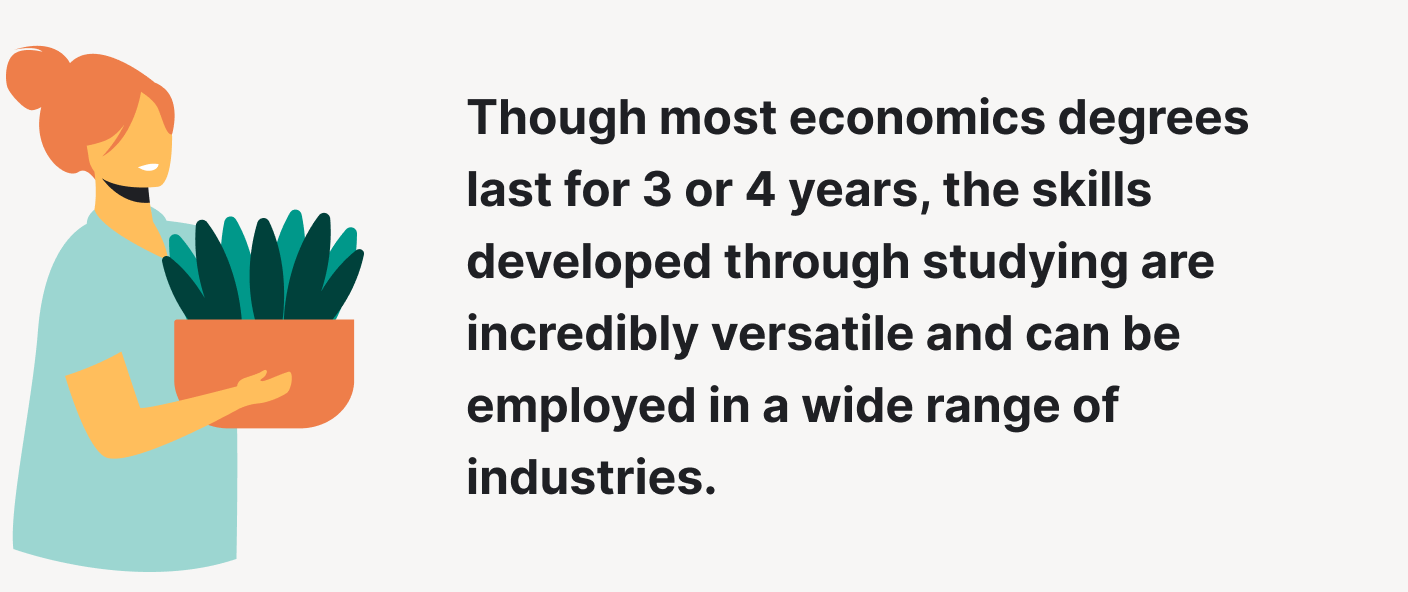
Economics studying is of utmost importance nowadays. It helps to gain a better understanding of processes that put everything in motion.
Economics is quite broad, so it has a great variety of subfields. And this is a fantastic opportunity for us to generate as many essay ideas as possible. Here, you will find great economic topics for your paper. As mentioned before, we have divided them into several sections to ease your selection process. There’s a wide selection of free college essays samples on economics in our database, too. So be sure to check that out.
🤝 Socio-Economic Essay Topics
- The economic impact of racial segregation in America in the 1950s.
- Designing a just socio-economic system.
- Socio-economic status of Hong Kong in modern-day China. Explain how the city of Hong Kong gained a special status in China. Why did it emerge as one of the most important cities in its economy? Comment on the significance of Hong Kong in the international economic arena.
- Economic growth in the United States in the post-World War 2 period.
- Mobile banking in Saudi Arabia: towards understanding the factors that affect the sector.
- The importance of Dior’s bar suit to the women’s fashion industry.
- Economic problems in the 1980’s Soviet Union. Talk about the significant problems with the economy the USSR had in the 1980s. What role did they play in its collapse?
- What socio-economic problems did segregation in South Africa cause?
- History of economic development in the UAE. Discuss the economic miracle in the UAE and Dubai. Explain how the government could turn the city of Dubai into one of the most famous tourist destinations. What strategies were applied?
- Gender inequality and socio-economic development .
- The problem of poverty in Venezuela.
- How the socio-economic and political position of women changed between 1880 and 1940.
- The economic impact of COVID-19 on global trade.

- How do the three main economic groups interact with each other? There are three critical economic groups: – Consumers – Producers – Government Analyze the interaction of these groups with each other.
- Extended essay: how the study of economic data helped our society to advance?
- Western industrialization socio-economic impacts.
- Inequality at the top: not all billionaires have the same powers. Analyze billionaires’ net worth, liquidity, political power, and wealth security. Explain why they have unequal social status. What factors determine the influence of billionaires?
- An analysis of systems that help us measure agricultural development in a country.
- Is social media a useful tool for brand promotion?
- The phenomenon of dualism in economic development.
🗺️ International Economics Essay Topics
- Globalization and its impact on international economic relations. Define the term globalization. What role does globalization play in international economic relations? Provide specific examples of globalization’s impact on the global political economy.
- The lack of justice for the cheap international labor market. Discuss the issue of cheap labor in various countries. Why do some workers often lack fundamental human rights while others abuse moral norms? Analyze the causes and effects of inequality in the workplace.
- Japan macroeconomics: problems and possible solutions.
- The issue of mercantilism in the history of Great Britain. Analyze the rise and development of mercantilism in the history of Great Britain. To solidify your ideas, provide persuasive arguments, and appropriate examples of mercantilism.
- Why does the problem of environmental protection remain unresolved among global economies?
- Nissan Motor company’s international business.
- International environmental concerns in economics: the case of China .
- The issue of international criminal justice in industry. Explain why international businesses often avoid criminal justice after wrongdoings. Select one case of unethical behavior of a company’s CEO or regular employee. Briefly introduce the problem. What were the causes and effects? How was the issue resolved? Express your own opinion regarding the lack of criminal justice in business.
- The economy of Singapore and its role in international trade.
- International microeconomics trade dispute case study: US-China dispute on the exportation of raw materials.
- The phenomenon of the “gig economy” and its impact on the global economy.
- The effect of population growth in the international economy.
- International economics in the context of globalization.
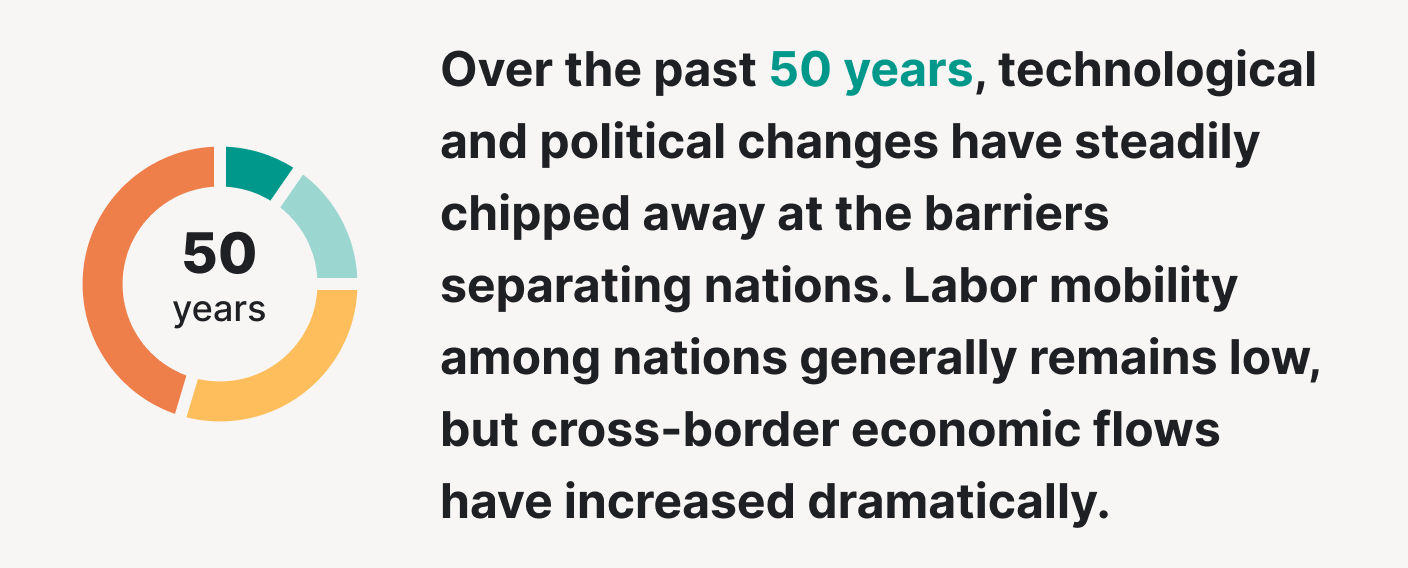
- How does Brexit affect the economy of the European Union? Analyze the immediate impact of Brexit on the EU’s economy. Predict future advantages and disadvantages of Brexit for both: Great Britain and the EU.
- South Africa: international agribusiness, trade, and financing.
- Historical essay: the economy of the Dutch East India company.
- The issue of Mozambique’s economy and possible solutions. Investigate the issue of extreme poverty in Mozambique. What are some possible solutions to the problem of poverty? Base your suggestions on the country’s cultural, historical, and geographical aspects.
- Imbalances in the global economy. Discuss the imbalances between trading countries on the scale of the global economy. What solutions would you suggest to deal with this issue?
- How will global economies adapt to China’s growing power?
- Etihad Airways company managerial economics.
🛠️ Labor Economics Essay Topics
- Ford Motor company’s labor economics.
- Labor economics: child labor.
- The UPS firm perspective: the labor market.
- Gender inequality of wage rate in modern business. Research how and why gender inequality is still an issue in the modern world of economics. What are some ways to deal with the problem? Present your ideas accurately and effectively. Provide solid arguments and appropriate examples to prove your position.
- What are the best ways to increase labor productivity in business?
- Labor unions adverse effects on economics.
- The decrease of the labor force in modern industries. Talk about the rising rates of robotization in the majority of industries. How will it affect the traditional labor force? Comment on the problem of unemployment caused by labor automatization.
- Violations of labor rights of workers.
- Modern labor essay: how can an entrepreneur guarantee the minimum wage to their workers?
- How can labor geography help develop a special economic zone? Talk about labor geography and its effects on developing an exclusive economic zone. How does the geopolitical location of a particular country influence its level of economic development?
- Entrepreneurship in the organic cosmetics sphere.
- Gender-oriented labor trade unions. A case study. Discuss the gender-oriented trade unions and analyze their impact on our society.
- Child labor in the Turkish cotton industry.

- The connection between economic growth and demography. Analyze the connection between economic growth and its demographic context. Investigate both sides: – The issue of overpopulation – The problem of low birth rate. From an economic perspective, what problem is more dangerous?
- The issue of sex discrimination in the workplace.
- The effects of Landrum-Griffin Labor Act. Explore the labor Act of Landrum-Griffin that was passed in the US Congress in 1959. Discuss its implications and consequences. Discuss its implications and consequences.
🌆 Urban Economics Essay Topics
- Cities and their role in aggregate economics.
- Urbanization in Hong Kong and its effects on citizens.
- The urban planning of the city of New York: a critical analysis. Analyze the urban history of NY. How has the city been developing? Discuss revolutionary solutions to the past and problems of modern times.
- The impact of a city’s design on the local traffic.
- Dubai’s spatial planning: creative solutions for building a city in the desert.
- Globalization, urban political economy, and economic restructuring.
- How do urban areas affect local wildlife? Comment on how modern production technologies in urban areas impact the natural diversity of wildlife. What impact does the rapid economic progress have on the environment? Suggest possible solutions.
- Urban sociology: does the city make us better people?
- Why should people be more careful about investing in real estate? Discuss the issues of overinvestment into real estate. Consider the economic crisis of 2008 as an example.
- How can regional authorities help improve a city?
- Urban life and its effects on education.
- The economic development of a city’s metropolitan area: challenges and solutions.
- Main factors for the emergence of cities in the Middle Ages.
- The ethics of relocation: is it justified? Talk about the case of relocating locals when building projects of great magnitude. To what extent can it be justified? Mention its economic and ethical side.
- The difficulties behind the construction of “green” buildings. Discuss the relatively new phenomenon of environmentally friendly buildings. Analyze both sides: the pros and cons. What obstacles lie behind the “green” building? What opportunities do the “green” buildings offer? Elaborate on your ideas by providing clear arguments or counterarguments.
- What factors play a critical role in the success of retail productivity in cities?
⚽ Sports Economics Essay Topics
- Do teams with higher budgets perform better on the field?
- Corruption in European football leagues: a critical analysis. Investigate the corruption issue in the European football leagues. State reasons and solutions for the problem.
- The managerial catastrophe of Arsenal F.C.
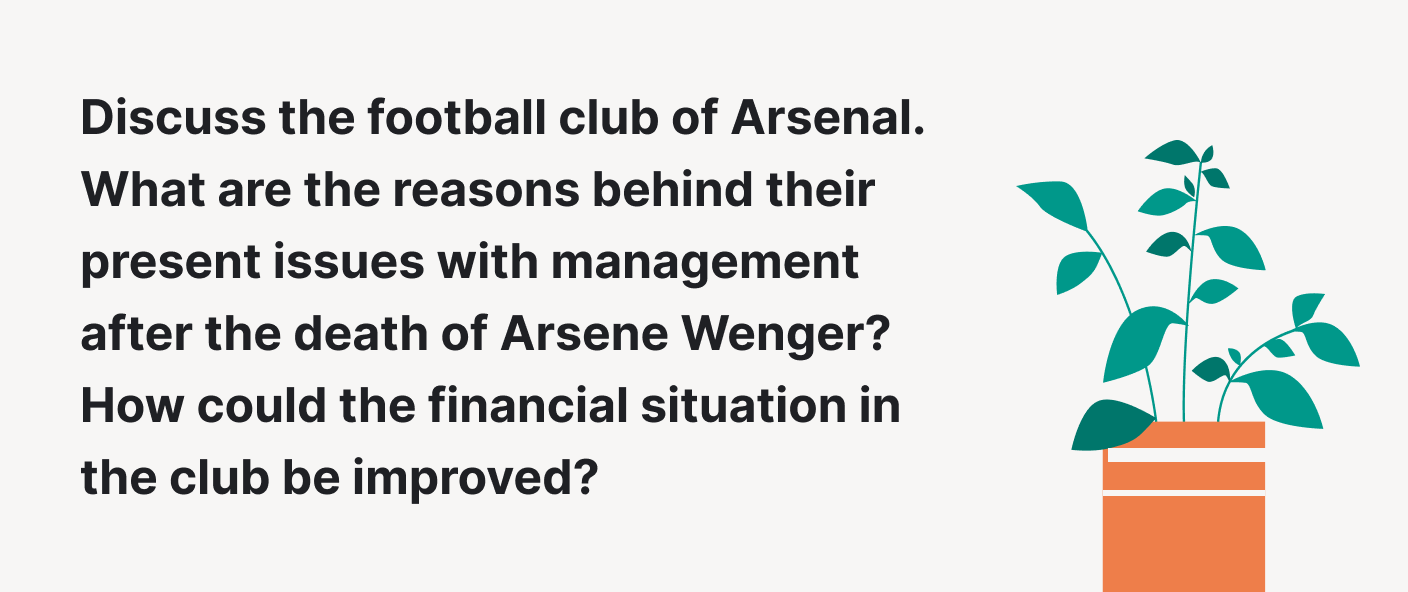
- The NextG sports company’s communication planning.
- Roger D. Blair’s Sports Economics literary review. Write a literary analysis of Sports Economics by Roger D. Blair. Discuss his opinion on the economy of sports. Do you agree or disagree with his position? Provide compelling supportive arguments or strong counterarguments.
- How significant is the impact factor of a local team on a city’s economy?
- Kinsmen Sports Centre: marketing metrics innovation.
- What role does statistical data play in sports? Analyze the part of economic statistical data in different sports organizations. How can statistics help to develop an effective financing plan? Comment on the impact of financing on the performance of a sports club.
- Sports and energy drinks marketing analysis.
- Is there a connection between the lack of money and any contemporary issues in a sports team?
- Performance-enhancing drugs in sports.
- The business of FIFA: a financial analysis. Investigate the finances of FIFA. What economic factors make them so influential in the modern world of football?
- The global sports retail industry.
- The Olympics: logistics and economy. Discuss the logistics behind the Olympics Games event. How the Olympic Games impact the economy of the host country?
💉 Health Economics Essay Topics
- Is bioprinting the new future of medicine? Analyze the new market of organ printing and discuss its challenges. Investigate bioprinting from an economic perspective. Will the outputs cover the inputs? How will bioprinting impact the financial aspect of the health care sector?
- Cost-effectiveness of pharmaceutical products in the United States. Comment on the immense cost-effectiveness of pharmaceuticals. What do you think is the price of pharmaceutical products reasonable? Is it ethical to set extremely high prices on the medicals?
- An economic evaluation of the antibiotics market.
- Health economics-SIC and NAICS.
- The financial side of cancer treatment: is it too expensive? Analyze the market for cancer treatment programs in various countries. Explore its costs and complications. What are some possible ways to reduce the price of cancer treatment and make it more affordable?
- The issue of fast food consumption: a multibillion-dollar market . Fast food has always been one of the notable causes of obesity, diabetes, and other illnesses. Investigate the economic aspect of the issue. Are high profits from fast food production worth peoples’ health conditions?
- History and evolution of healthcare economics.
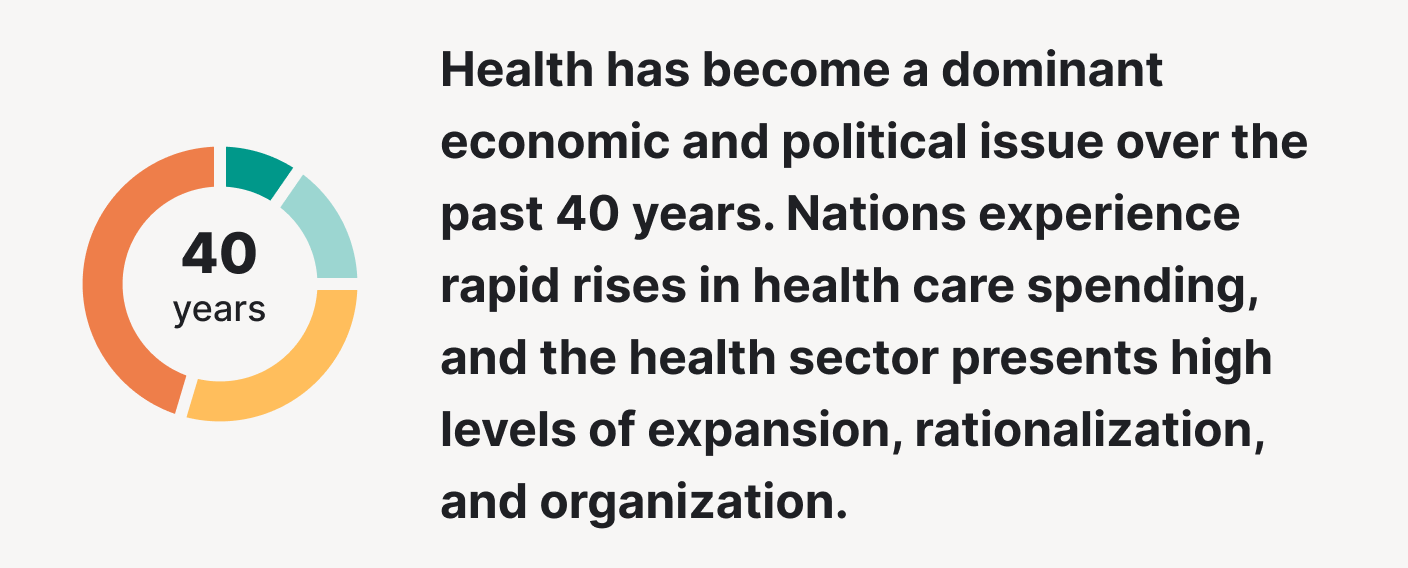
- The financial management of a hospital: a case study.
- The issue of public healthcare in the USA. Write about the long-standing issue of medical sector operation in the USA. Analyze its history, financial, and social aspects.
- Demand in healthcare economics.
- What are the economic outcomes of a global pandemic? Taking the COVID-19 outbreak as an example, conduct research on the effects of a pandemic on the economy. How does it affect local economies? What impact does the quarantine have on the international economy? Provide appropriate examples to support your ideas.
💼 Business Economics Essay Topics
- When does an advertising campaign become unnecessary?
- Sustainable development of a nation’s economic stability. Discuss how a country can create a sustainable economy. Provide bright examples to solidify your position.
- How can a small business compete with monopolies?
- What are the limitations of the Lewis Model?
- The phenomenon of inflation: inevitable liability or a land of opportunity for our economies? Explore the process of inflation in modern economies. Does it only have adverse effects on the countries’ economies? Are there any advantages of inflation? Analyze it from a positive perspective.
- Economics, business, and sugar in the UK.
- The shadow economy of the finance sector. Dive into the backstage of the finance sector and research various “grey” areas where business can be done.
- Chinese and Japanese business systems comparison.
- Oil demand and its changes in the XXI century: a critical analysis. Analyze the oil sector and write about its fluctuation in the XXI century. How did the changes in oil demand affect the global economy?
- The social and economic impact of mass emigration.
🌠 40 More Good Economic Essay Topics
Scrolled through our ideas, but can’t find a suitable topic for yourself? No worries! We have more issues to share with you.
So, don’t stress out. Take a look at our list of economical essay topics. Here are 40 more ideas focusing on globalization and the history of economics.
🏤 Economic Globalization Essay Topics
- The impact of globalization on the tourist industry in the Caribbean . Analyze both: the positive and negative effects of globalization on the Caribbean. To make your paper well-structured, explore two advantages and two disadvantages. Don’t forget to improve your essay with strong evidence and appropriate examples!
- Toyota Motor Corporation: impacts of globalization.
- What are the effects of globalization on developing countries? To what extent do developing countries profit from globalization? Research the subject by comparing various examples.
- Defining globalization and its effects on current trade.
- Economic growth as a result of globalization: proper financial strategies. How can a country successfully achieve prosperity with globalization? Discuss proper economic strategies.
- The socio-political significance of the IT industry’s globalization.
- Human trafficking in developing nations as a result of globalization.
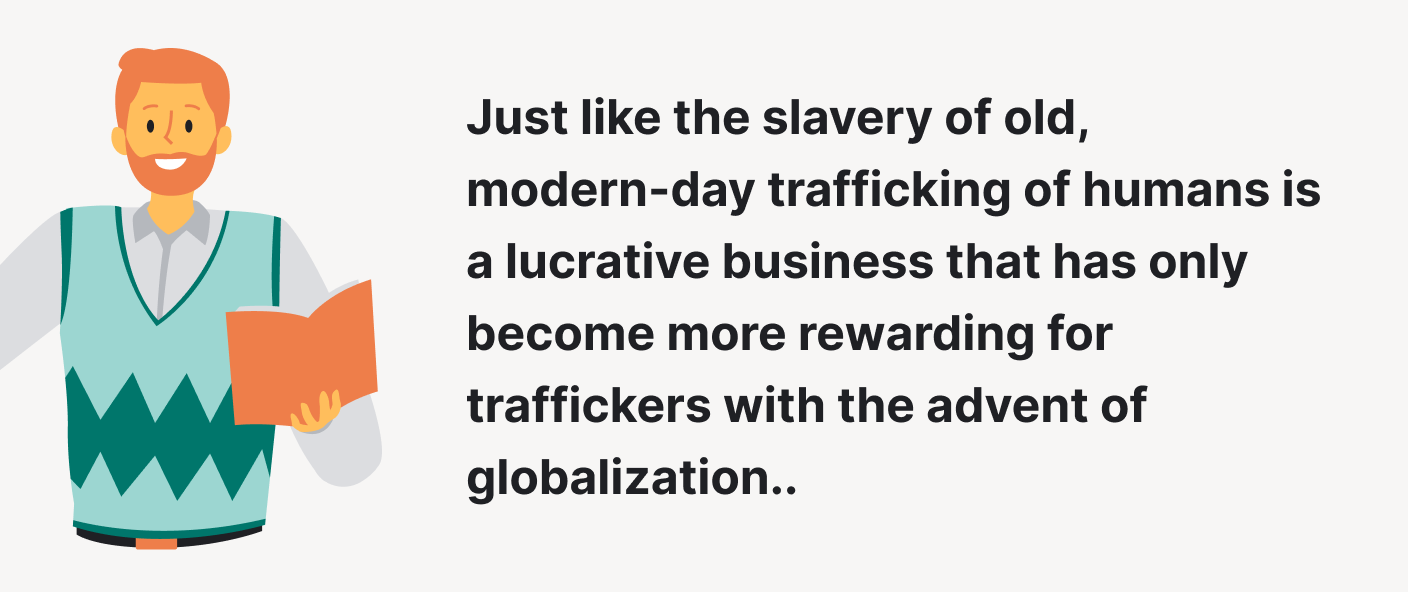
- Globalization and criminal justice policy.
- What are the advantages and disadvantages of globalization?
- Globalization challenges and countermeasures.
- The effect of globalization on worldwide trade and employment rates.
- Economic integration within the European Union: a critical analysis. Talk about the history of economic integration within the EU. What are the negative and positive outcomes of economic integration?
- Globalization and food in Japan.
- Does globalization bring negative effects to cultural heritage and identity?
- The Industrial Revolution as the first step towards globalization. Focus on the Industrial Revolution in Europe. Discuss its precursors and consequences. Why is the revolution considered to be a starting point of globalization? Provide specific examples of globalization processes that occurred in the economic sector after the Industrial revolution.
- Globalization 2.0 an analysis of a book by David Rieff.
- Globalization effects on fundamentalism growth.
- Does direct investment by foreign businesses come with strings attached? Dive into the shady area of globalization and discuss how to direct foreign investment can bring problems of geopolitical scale.
- Effects of globalization on sexuality.
- Alibaba’s globalization strategy: an economic analysis.
🧮 Economic History Essay Topics
- The rapid economic growth of Europe during the Age of Discovery. Analyze the factors that brought economic growth to Europe during the Age of Discovery. What factors contributed to the dynamic economic progress of that time?
- Brazil’s economic history.
- History of capitalism: from the Renaissance to the United States of America. Discuss the origins of capitalism and its centuries-long path towards XXth century America. How the establishment of capitalism impacted the economy of the USA?
- Max Weber: economic history, the theory of bureaucracy, and politics as a vocation.
- 2008 Economic Crisis: origins and fallout. Talk about the 2008 Financial Crisis. Discuss its causes and outcomes. What should have been done differently to avoid the global crisis? Comment on the economic strategies countries used to recover from it.
- The economic marvel of Communist China: from rags to riches.
- What made world economic growth of the Renaissance possible?
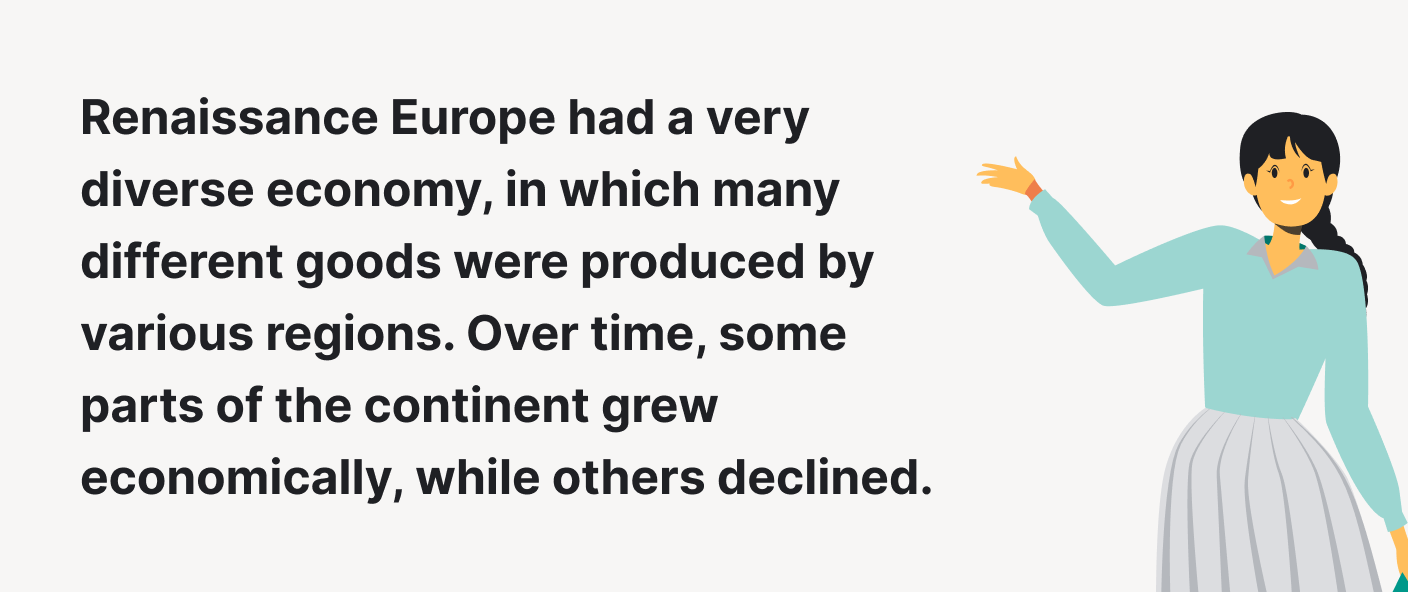
- The economic history of Canada: how did the settlers facilitate economic growth?
- What did the major powers of the XIXth century base their economies on?
- The Rothschilds: political and financial role in the Industrial Revolution. Research the dynasty of Rothschilds and how they came to power. What was their role in Europe’s Industrial Revolution?
- The link between the “oil curse” and the economic history of Latin America.
- Roman Empire’s monetary policy: a socio-economic analysis.
- How did the demand for different goods change their value in the 2000s years? Analyze the demand for goods in the 2000s years and their change in value. Why do these fluctuations in demand for products and services occur?
- The history of economic thought.
- Soviet Union’s economic timeline: from the new Economic Policy to Reformation. Discuss the economic issues of the Soviet Union from the historical perspective. Why did the Soviet Union collapse? What improvements in the financial sector should have been done?
- History of France economics over the past 20 years.
- The history of economic analysis.
- The concept of serfdom and slavery as the main economic engine of the past. Dive into the idea of feudalism and serfdom. Discuss its social and economic aspects.
- The World Bank’s structure, history, activities.
- The history of Islamic banking: concepts and ideas.
💫 How to Write an Economics Essay?
Generally, essay writing on economics has the same structure as any other essay. However, there are some distinctive features of economic papers. Thus, it is essential to figure them out from the very beginning of your work.
You might be wondering what those aspects of the economic paper are. Well, we have an answer.
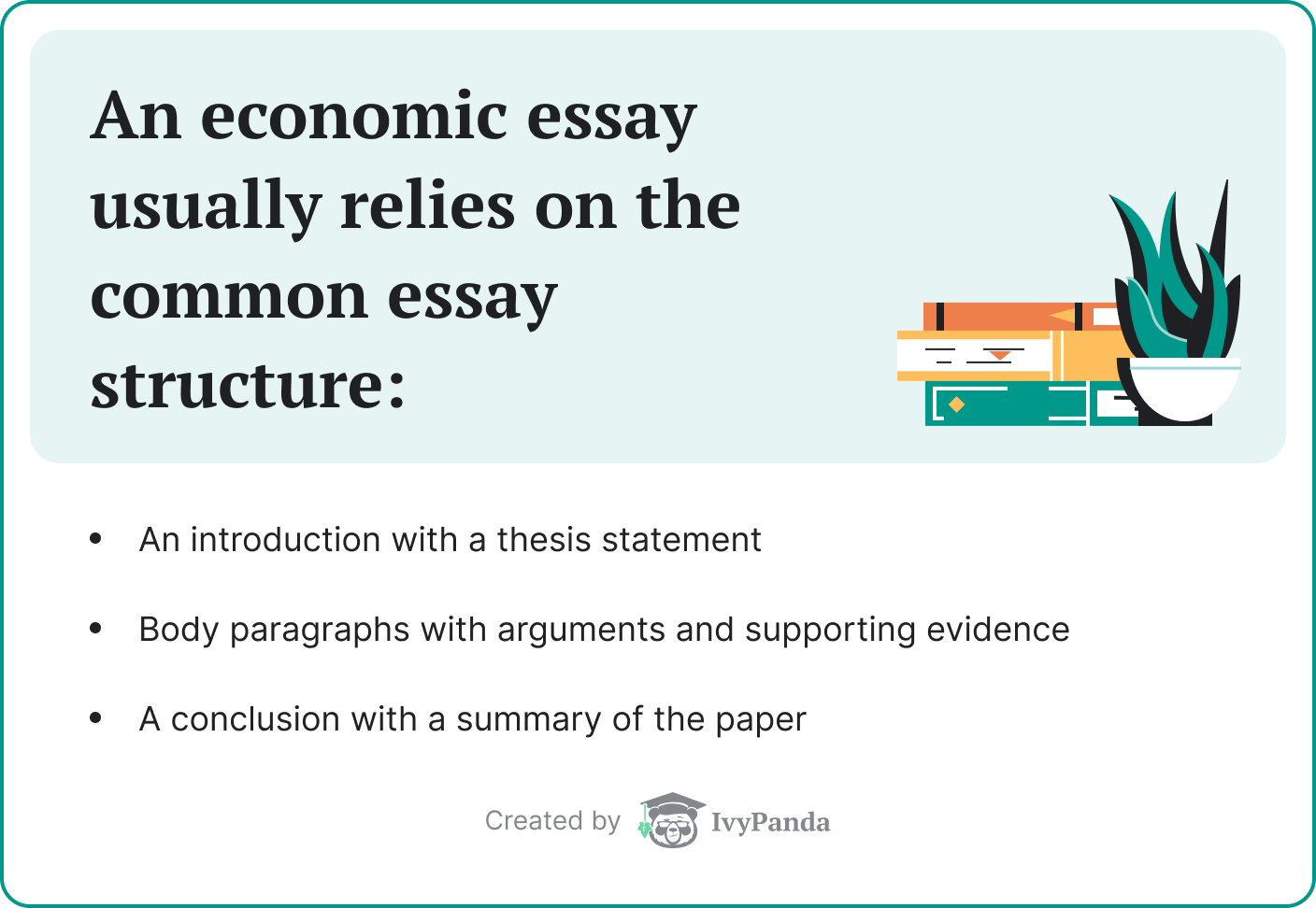
Below, you will find a detailed plan that explains the fundamental concepts of the essay writing process. So, don’t hesitate to use our tips! They are indeed helpful.
Pick a topic and dissect it. Picking the right topic is the very basis of writing a successful essay. Think of something that you will be interested in and make sure you understand the issue clearly. Also, don’t forget to check our ultimate economics essay topics and samples list!
Research it. After selecting the right idea from our economical essay topics, research your subject thoroughly. Try to find every fascinating and intriguing detail about it. Remember that you can always ask your fellow students, friends, or a teacher for help.
Come up with a thesis statement. A thesis statement is an essential element of your essay. It will determine your focus and guide the readers throughout your paper. Make your thesis secure and try to catch the reader’s attention using context and word choice.
Outline your essay. Never underestimate the power of a well-structured outline! Creating an essay outline can significantly help you to determine your general plan. Evaluate which economic framework you will be using to address the issue. State the main points of your thesis and antithesis. Make sure that they answer the central question of your work.
Write your introduction. First and foremost, a practical introduction should capture the readers’ attention and state the essay’s key topic. So, put enough effort to develop an outstanding introduction. It will create the first impression of your paper.
Moreover, an introduction should include a thesis statement. As we have mentioned above, a thesis plays a crucial role. Thus, make sure it is clearly stated.
Another significant feature of the introduction is its coherence with the body of your essay. Consequently, the introductory paragraph’s last statement has to present the subject of the next section, generically. Also, keep in mind that no more than three key points can be discussed in a paper, even if it is an extended essay.
Thoroughly work on the body paragraphs. Usually, the body of the essay contains several paragraphs. The number of these paragraphs will depend on the nature of your question. Be sure to create one section for every critical point that you make. This will make your paper properly-structured, and the reader will quickly get your ideas. For your convenience, we created a plan to develop your ideas in each paragraph, So, use it and make your writing process easier!
- Argument. Present your argument in the topic sentence of the paragraph in a way that directly answers the question. A hint: the most effective way to introduce the critical point is to place the topic sentence at the beginning of the paragraph. This will help the readers to concentrate their attention on a specific idea.
- Comment and discussion. Explain the meaning of your argument and provide an economic analysis. Present clear evidence and persuasive arguments to solidify your position.
- Connection. Link your comments with the vital point of the paragraph. Demonstrate the coherence of your evidence with the point.
- Diagrams, tables, charts. If necessary, provide the reader with visual aids. Sometimes, an appropriate diagram or a suitable chart can say more than words. Besides, your paper will look more professional if you use any kind of visual aids.
Conclude your essay. In your conclusion, summarize and synthesize your work by restating your thesis. Also, it is crucial to strengthen it by mentioning the practical value of your findings. Remember to make your essay readable by choosing appropriate wording and avoiding too complex grammar constructions.

Thank you for visiting our page! Did you enjoy our article and learned something new? We are glad to help you. Don’t forget to leave a comment and share the article with others!
🔗 References
- High School Economics Topics: Econlib, The Library of Economics and Liberty
- Guide to Writing an Economics Essay: The Economics Tutor
- How to Write the Introduction of Your Development Economics Paper: David Evans, Center For Global Development
- Senior Essay: Department of Economics, Yale University
- Developing A Thesis: Maxine Rodburg and The Tutors of the Writing Center at Harvard University
- Academic Essay Writing, Some Guidelines: Department of Economics, Carleton University
- The Writing Process: Writing Centre Resource Guide, LibGuides at Dalhousie University
- Research Papers: KU Writing Center, the University of Kansas
- Unpacking the Topic: University of Southern Queensland
- Economic Issues: PIIE, Peterson Institute for International Economics
- Areas of Research: EPI, Economic Policy Institute
- Top 100 Economics Blogs Of 2023: Prateek Agarwal, Intelligent Economist
- Current Environmental Economic Topics, Environmental Economics: US EPA, United States Environmental Protection Agency
- Hot Topics in the U.S. Economy: The Balance
- Share via Facebook
- Share via Twitter
- Share via LinkedIn
- Share via email
You might also like
![essay about economics 187 Impressive Higher English Persuasive Essay Topics [2024]](https://ivypanda.com/blog/wp-content/uploads/2020/10/front-view-of-books-with-blue-background-309x208.jpg)
187 Impressive Higher English Persuasive Essay Topics [2024]
![essay about economics 227 Amazing College Persuasive Essay Topics [Free Ideas]](https://ivypanda.com/blog/wp-content/uploads/2020/10/teenager-student-girl-over-yellow-pointing-finger-to-the-side-309x208.jpg)
227 Amazing College Persuasive Essay Topics [Free Ideas]
![essay about economics 193 Sports Persuasive Essay Topics [with Tips & Examples]](https://ivypanda.com/blog/wp-content/uploads/2020/10/sport-composition-with-modern-elements-309x208.jpg)
193 Sports Persuasive Essay Topics [with Tips & Examples]

Tips for writing economics essays
Some tips for writing economics essays Includes how to answer the question, including right diagrams and evaluation – primarily designed for A Level students.
1. Understand the question
Make sure you understand the essential point of the question. If appropriate, you could try and rephrase the question into a simpler version.
For example:
Q. Examine the macroeconomic implications of a significant fall in UK House prices, combined with a simultaneous loosening of Monetary Policy.
In plain English.
- Discuss the effect of falling house prices on the economy
- Discuss the effect of falling interest rates (loose monetary policy) on economy
In effect, there are two distinct parts to this question. It is a valid response, to deal with each separately, before considering both together.
It helps to keep reminding yourself of the question as you answer. Sometimes candidates start off well, but towards the end forget what the question was. Bear in mind, failure to answer the question can lead to a very low mark.
2. Write in simple sentences
For clarity of thought, it is usually best for students to write short sentences. The main thing is to avoid combining too many ideas into one sentence. If you write in short sentences, it may sound a little stilted; but it is worth remembering that there are no extra marks for a Shakespearian grasp of English. (at least in Economics Exams)
Look at this response to a question:
Q. What is the impact of higher interest rates?
Higher interest rates increase the cost of borrowing. As a result, those with mortgages will have lower disposable income. Also, consumers have less incentive to borrow and spend on credit cards. Therefore consumption will be lower. This fall in consumption will cause a fall in Aggregate Demand and therefore lead to lower economic growth. A fall in AD will also reduce inflation.
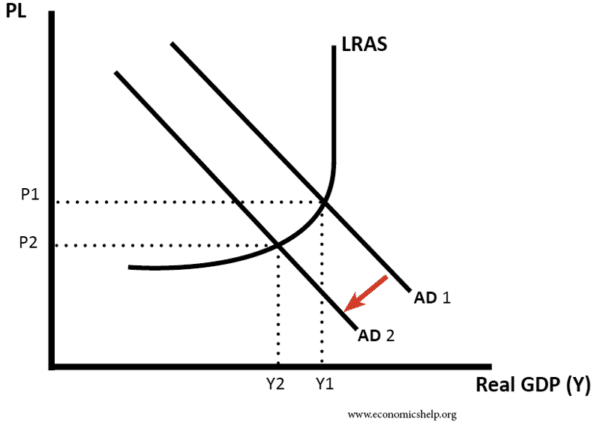
I could have combined 1 or 2 sentences together, but here I wanted to show that short sentences can aid clarity of thought. Nothing is wasted in the above example.
Simple sentences help you to focus on one thing at once, which is another important tip.
3. Answer the question
Quite frequently, when marking economic essays, you see a candidate who has a reasonable knowledge of economics, but unfortunately does not answer the question. Therefore, as a result, they can get zero for a question. It may seem harsh, but if you don’t answer the question, the examiner can’t give any marks.
At the end of each paragraph you can ask yourself; how does this paragraph answer the question? If necessary, you can write a one-sentence summary, which directly answers the question. Don’t wait until the end of the essay to realise you have answered a different question.
Discuss the impact of Euro membership on UK fiscal and monetary policy?
Most students will have revised a question on: “The benefits and costs of the Euro. Therefore, as soon as they see the Euro in the title, they put down all their notes on the benefits and costs of the Euro. However, this question is quite specific; it only wishes to know the impact on fiscal and monetary policy.
The “joke” goes, put 10 economists in a room and you will get 11 different answers. Why? you may ask. The nature of economics is that quite often there is no “right” answer. It is important that we always consider other points of view, and discuss various different, potential outcomes. This is what we mean by evaluation.
Macro-evaluation
- Depends on the state of the economy – full capacity or recession?
- Time lags – it may take 18 months for interest rates to have an effect
- Depends on other variables in the economy . Higher investment could be offset by fall in consumer spending.
- The significance of factors . A fall in exports to the US is only a small proportion of UK AD. However, a recession in Europe is more significant because 50% of UK exports go to EU.
- Consider the impact on all macroeconomic objectives . For example, higher interest rates may reduce inflation, but what about economic growth, unemployment, current account and balance of payments?
- Consider both the supply and demand side . For example, expansionary fiscal policy can help to reduce demand-deficient unemployment, however, it will be ineffective in solving demand-side unemployment (e.g. structural unemployment)
Example question :
The effect of raising interest rates will reduce consumer spending.
- However , if confidence is high, higher interest rates may not actually discourage consumer spending.
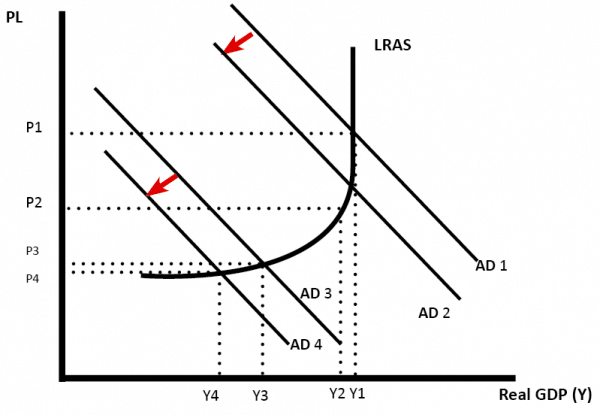
If the economy is close to full capacity a rise in interest rates may reduce inflation but not reduce growth. (AD falls from AD1 to AD2)
- However , if there is already a slowdown in the economy, rising interest rates may cause a recession. (AD3 to AD3)
Micro-evaluation
1. The impact depends on elasticity of demand
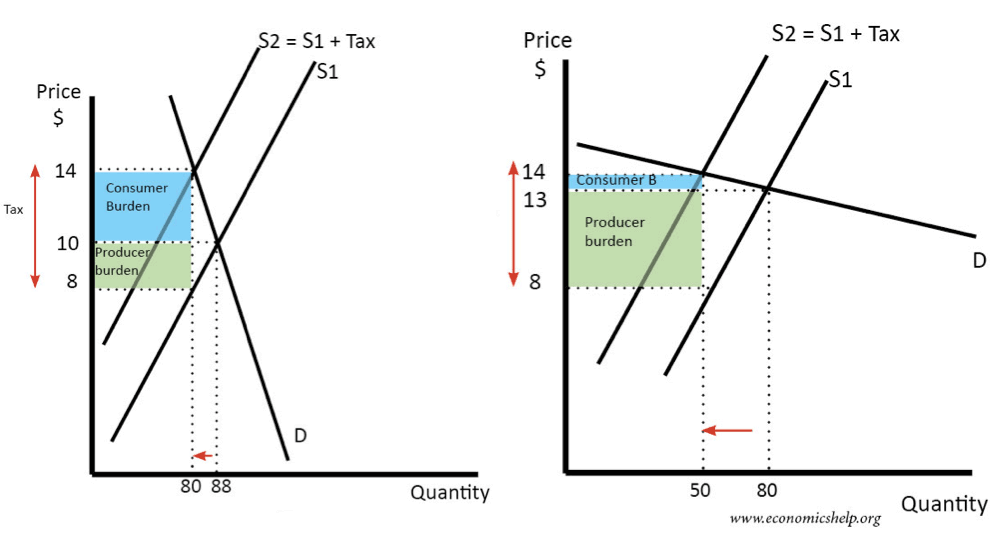
In both diagrams, we place the same tax on the good, causing supply to shift to the left.
- When demand is price inelastic, the tax causes only a small fall in demand.
- If demand is price elastic, the tax causes a bigger percentage fall in demand.
2. Time lag
In the short term, demand for petrol is likely to be price inelastic. However, over time, consumers may find alternatives, e.g. they buy electric cars. In the short-term, investment will not increase capacity, but over time, it may help to increase a firms profitability. Time lags.
3. Depends on market structure
If markets are competitive, then we can expect prices to remain low. However, if a firm has monopoly power, then we can expect higher prices.
4. Depends on business objectives
If a firm is seeking to maximise profits, we can expect prices to rise. However, if a firm is seeking to maximise market share, it may seek to cut prices – even if it means less profit.
5. Behavioural economics
In economics, we usually assume individuals are rational and seeking to maximise their utility. However, in the real world, people are subject to bias and may not meet expectations of classical economic theory. For example, the present-bias suggest consumers will give much higher weighting to present levels of happiness and ignore future costs. This may explain over-consumption of demerit goods and under-consumption of merit goods. See: behavioural economics
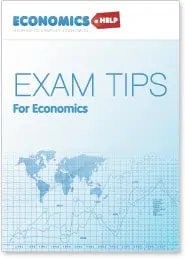
Exam tips for economics – Comprehensive e-book guide for just £5
8 thoughts on “Tips for writing economics essays”
I really want to know the difference between discussion questions and analysis questions and how to answer them in a correct way to get good credit in Economics
Analysis just involves one sided answers while Discussion questions involve using two points of view
This is a great lesson learnd by me
how can I actually manage my time
The evaluation points in this article are really useful! The thing I struggle with is analysis and application. I have all the knowledge and I have learnt the evaluation points like J-curve analysis and marshall learner condition, but my chains of reasoning are not good enough. I will try the shorter sentences recommended in this article.
What kind of method for costing analysis is most suitable for a craft brewery, in order to analyze the cost of production of different types of beer_
Really useful!Especially for the CIE exam papers
Does anyone know how to evaluate in those advantages/disadvantages essay questions where you would basically analyse the benefits of something and then evaluate? Struggling because wouldn’t the evaluation just be the disadvantages ?? Like how would you evaluate without just stating the disadvantage?
Leave a comment Cancel reply
Suggestions or feedback?
MIT News | Massachusetts Institute of Technology
- Machine learning
- Social justice
- Black holes
- Classes and programs
Departments
- Aeronautics and Astronautics
- Brain and Cognitive Sciences
- Architecture
- Political Science
- Mechanical Engineering
Centers, Labs, & Programs
- Abdul Latif Jameel Poverty Action Lab (J-PAL)
- Picower Institute for Learning and Memory
- Lincoln Laboratory
- School of Architecture + Planning
- School of Engineering
- School of Humanities, Arts, and Social Sciences
- Sloan School of Management
- School of Science
- MIT Schwarzman College of Computing
The power of economics to explain and shape the world
Press contact :.

Previous image Next image
Nobel Prize-winning economist Esther Duflo sympathizes with students who have no interest in her field. She was such a student herself — until an undergraduate research post gave her the chance to learn first-hand that economists address many of the major issues facing human and planetary well-being. “Most people have a wrong view of what economics is. They just see economists on television discussing what’s going to happen to the stock market,” says Duflo, the Abdul Latif Jameel Professor of Poverty Alleviation and Development Economics. “But what people do in the field is very broad. Economists grapple with the real world and with the complexity that goes with it.”
That’s why this year Duflo has teamed up with Professor Abhijit Banerjee to offer 14.009 (Economics and Society’s Greatest Problems), a first-year discovery subject — a class type designed to give undergraduates a low-pressure, high-impact way to explore a field. In this case, they are exploring the range of issues that economists engage with every day: the economic dimensions of climate change, international trade, racism, justice, education, poverty, health care, social preferences, and economic growth are just a few of the topics the class covers. “We think it’s pretty important that the first exposure to economics is via issues,” Duflo says. “If you first get exposed to economics via models, these models necessarily have to be very simplified, and then students get the idea that economics is a simplistic view of the world that can’t explain much.” Arguably, Duflo and Banerjee have been disproving that view throughout their careers. In 2003, the pair founded MIT’s Abdul Latif Jameel Poverty Action Lab, a leading antipoverty research network that provides scientific evidence on what methods actually work to alleviate poverty — which enables governments and nongovernmental organizations to implement truly effective programs and social policies. And, in 2019 they won the Nobel Prize in economics (together with Michael Kremer of the University of Chicago) for their innovative work applying laboratory-style randomized, controlled trials to research a wide range of topics implicated in global poverty. “Super cool”
First-year Jean Billa, one of the students in 14.009, says, “Economics isn’t just about how money flows, but about how people react to certain events. That was an interesting discovery for me.”
It’s also precisely the lesson Banerjee and Duflo hoped students would take away from 14.009, a class that centers on weekly in-person discussions of the professors’ recorded lectures — many of which align with chapters in Banerjee and Duflo’s book “Good Economics for Hard Times” (Public Affairs, 2019). Classes typically start with a poll in which the roughly 100 enrolled students can register their views on that week’s topic. Then, students get to discuss the issue, says senior Dina Atia, teaching assistant for the class. Noting that she finds it “super cool” that Nobelists are teaching MIT’s first-year students, Atia points out that both Duflo and Banerjee have also made themselves available to chat with students after class. “They’re definitely extending themselves,” she says. “We want the students to get excited about economics so they want to know more,” says Banerjee, the Ford Foundation International Professor of Economics, “because this is a field that can help us address some of the biggest problems society faces.” Using natural experiments to test theories
Early in the term, for example, the topic was migration. In the lecture, Duflo points out that migration policies are often impacted by the fear that unskilled migrants will overwhelm a region, taking jobs from residents and demanding social services. Yet, migrant flows in normal years represent just 3 percent of the world population. “There is no flood. There is no vast movement of migrants,” she says. Duflo then explains that economists were able to learn a lot about migration thanks to a “natural experiment,” the Mariel boat lift. This 1980 event brought roughly 125,000 unskilled Cubans to Florida over a matter a months, enabling economists to study the impacts of a sudden wave of migration. Duflo says a look at real wages before and after the migration showed no significant impacts. “It was interesting to see that most theories about immigrants were not justified,” Billa says. “That was a real-life situation, and the results showed that even a massive wave of immigration didn’t change work in the city [Miami].”
Question assumptions, find the facts in data Since this is a broad survey course, there is always more to unpack. The goal, faculty say, is simply to help students understand the power of economics to explain and shape the world. “We are going so fast from topic to topic, I don’t expect them to retain all the information,” Duflo says. Instead, students are expected to gain an appreciation for a way of thinking. “Economics is about questioning everything — questioning assumptions you don’t even know are assumptions and being sophisticated about looking at data to uncover the facts.” To add impact, Duflo says she and Banerjee tie lessons to current events and dive more deeply into a few economic studies. One class, for example, focused on the unequal burden the Covid-19 pandemic has placed on different demographic groups and referenced research by Harvard University professor Marcella Alsan, who won a MacArthur Fellowship this fall for her work studying the impact of racism on health disparities.
Duflo also revealed that at the beginning of the pandemic, she suspected that mistrust of the health-care system could prevent Black Americans from taking certain measures to protect themselves from the virus. What she discovered when she researched the topic, however, was that political considerations outweighed racial influences as a predictor of behavior. “The lesson for you is, it’s good to question your assumptions,” she told the class. “Students should ideally understand, by the end of class, why it’s important to ask questions and what they can teach us about the effectiveness of policy and economic theory,” Banerjee says. “We want people to discover the range of economics and to understand how economists look at problems.”
Story by MIT SHASS Communications Editorial and design director: Emily Hiestand Senior writer: Kathryn O'Neill
Share this news article on:
Related links.
- Class 14.009 (Economics and Society’s Greatest Problems)
- Esther Duflo
- Abhijit Banerjee
- Abdul Latif Jameel Poverty Action Lab
- Department of Economics
- Video: "Lighting the Path"
Related Topics
- Education, teaching, academics
- Climate change
- Immigration
- Health care
- School of Humanities Arts and Social Sciences
Related Articles

Popular new major blends technical skills and human-centered applications

Report: Economics drives migration from Central America to the U.S.

MIT economists Esther Duflo and Abhijit Banerjee win Nobel Prize
Previous item Next item
More MIT News

A first-ever complete map for elastic strain engineering
Read full story →

“Life is short, so aim high”

Shining a light on oil fields to make them more sustainable

MIT launches Working Group on Generative AI and the Work of the Future
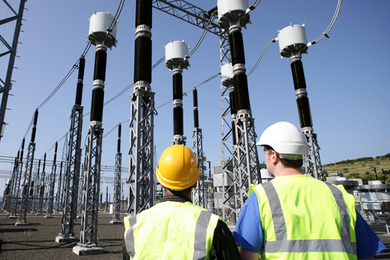
Atmospheric observations in China show rise in emissions of a potent greenhouse gas
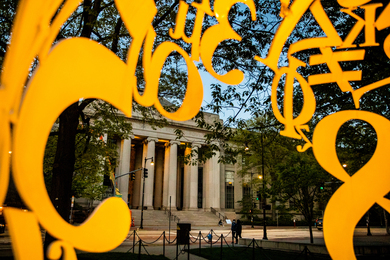
Second round of seed grants awarded to MIT scholars studying the impact and applications of generative AI
- More news on MIT News homepage →
Massachusetts Institute of Technology 77 Massachusetts Avenue, Cambridge, MA, USA
- Map (opens in new window)
- Events (opens in new window)
- People (opens in new window)
- Careers (opens in new window)
- Accessibility
- Social Media Hub
- MIT on Facebook
- MIT on YouTube
- MIT on Instagram
Economics Essay Examples

Ace Your Essay With Our Economics Essay Examples
Published on: Jun 6, 2023
Last updated on: Jan 31, 2024

Share this article
Are you struggling to understand economics essays and how to write your own?
It can be challenging to grasp the complexities of economic concepts without practical examples.
But don’t worry!
We’ve got the solution you've been looking for. Explore quality examples that bridge the gap between theory and real-world applications. In addition, get insightful tips for writing economics essays.
So, if you're a student aiming for academic success, this blog is your go-to resource for mastering economics essays.
Let’s dive in and get started!
On This Page On This Page -->
What is an Economics Essay?
An economics essay is a written piece that explores economic theories, concepts, and their real-world applications. It involves analyzing economic issues, presenting arguments, and providing evidence to support ideas.
The goal of an economics essay is to demonstrate an understanding of economic principles and the ability to critically evaluate economic topics.
Why Write an Economics Essay?
Writing an economics essay serves multiple purposes:
- Demonstrate Understanding: Showcasing your comprehension of economic concepts and their practical applications.
- Develop Critical Thinking: Cultivating analytical skills to evaluate economic issues from different perspectives.
- Apply Theory to Real-World Contexts: Bridging the gap between economic theory and real-life scenarios.
- Enhance Research and Analysis Skills: Improving abilities to gather and interpret economic data.
- Prepare for Academic and Professional Pursuits: Building a foundation for success in future economics-related endeavors.

Paper Due? Why Suffer? That's our Job!
If youâre wondering, âhow do I write an economics essay?â, consulting an example essay might be a good option for you. Here are some economics essay examples:
Short Essay About Economics
A Level Economics Essay Examples
Here is an essay on economics a level structure:
Band 6 Economics Essay Examples
Here are some downloadable economics essays:
Economics essay pdf
Economics essay introduction
Economics Extended Essay Examples
In an economics extended essay, students have the opportunity to delve into a specific economic topic of interest. They are required to conduct an in-depth analysis of this topic and compile a lengthy essay.
Here are some potential economics extended essay question examples:
- How does foreign direct investment impact economic growth in developing countries?
- What are the factors influencing consumer behavior and their effects on market demand for sustainable products?
- To what extent does government intervention in the form of minimum wage policies affect employment levels and income inequality?
- What are the economic consequences of implementing a carbon tax to combat climate change?
- How does globalization influence income distribution and the wage gap in developed economies?
IB Economics Extended Essay Examples
IB Economics Extended Essay Examples
Economics Extended Essay Topic Examples
Extended Essay Research Question Examples Economics
Tips for Writing an Economics Essay
Writing an economics essay requires specific expertise and skills. So, it's important to have some tips up your sleeve to make sure your essay is of high quality:
- Start with a Clear Thesis Statement: It defines your essay's focus and argument. This statement should be concise, to the point, and present the crux of your essay.
- Conduct Research and Gather Data: Collect facts and figures from reliable sources such as academic journals, government reports, and reputable news outlets. Use this data to support your arguments and analysis and compile a literature review.
- Use Economic Theories and Models: These help you to support your arguments and provide a framework for your analysis. Make sure to clearly explain these theories and models so that the reader can follow your reasoning.
- Analyze the Micro and Macro Aspects: Consider all angles of the topic. This means examining how the issue affects individuals, businesses, and the economy as a whole.
- Use Real-World Examples: Practical examples and case studies help to illustrate your points. This can make your arguments more relatable and understandable.
- Consider the Policy Implications: Take into account the impacts of your analysis. What are the potential solutions to the problem you're examining? How might different policies affect the outcomes you're discussing?
- Use Graphs and Charts: These help to illustrate your data and analysis. These visual aids can help make your arguments more compelling and easier to understand.
- Proofread and Edit: Make sure to proofread your essay carefully for grammar and spelling errors. In economics, precision and accuracy are essential, so errors can undermine the credibility of your analysis.
These tips can help make your essay writing journey a breeze. Tailor them to your topic to make sure you end with a well-researched and accurate economics essay.
To wrap it up , writing an economics essay requires a combination of solid research, analytical thinking, and effective communication.
You can craft a compelling piece of work by taking our examples as a guide and following the tips.
However, if you are still questioning "how do I write an economics essay?", it's time to get professional help from the best essay writing service - CollegeEssay.org.
Our economics essay writing service is always ready to help students like you. Our experienced economics essay writers are dedicated to delivering high-quality, custom-written essays that are 100% plagiarism free.
Also try out our AI essay writer and get your quality economics essay now!
Barbara P (Literature)
Barbara is a highly educated and qualified author with a Ph.D. in public health from an Ivy League university. She has spent a significant amount of time working in the medical field, conducting a thorough study on a variety of health issues. Her work has been published in several major publications.
Paper Due? Why Suffer? That’s our Job!

- Privacy Policy
- Cookies Policy
- Terms of Use
- Refunds & Cancellations
- Our Writers
- Success Stories
- Our Guarantees
- Affiliate Program
- Referral Program
- AI Essay Writer
Disclaimer: All client orders are completed by our team of highly qualified human writers. The essays and papers provided by us are not to be used for submission but rather as learning models only.
- Liberty Fund
- Adam Smith Works
- Law & Liberty
- Browse by Author
- Browse by Topic
- Browse by Date
- Search EconLog
- Latest Episodes
- Browse by Guest
- Browse by Category
- Browse Extras
- Search EconTalk
- Latest Articles
- Liberty Classics
- Search Articles
- Books by Date
- Books by Author
- Search Books
- Browse by Title
- Biographies
- Search Encyclopedia
- #ECONLIBREADS
- College Topics
- High School Topics
- Subscribe to QuickPicks
- Search Guides
- Search Videos
- Library of Law & Liberty
- Home /
ECONLIB Guides
What Is Economics?

Introduction
Economics is about making choices. We make all kinds of choices every day. How much should I spend on gas? What’s the best route to work? Where should we go for dinner? Which job or career should I go for? What are the pros and cons of finishing college versus taking a job or inventing the next, best Internet startup? Which roommate should take care of washing the dishes? Can I get that dog as a pet? Should I get married, have children, and if so, when? Which politician should I vote for when they all claim they can improve the economy or make my life better? What is “the economy,” anyway? What if my personal or religious principles conflict with what people tell me is in my best economic interest?
Many people hear the word “economics” and think it is all about money. Economics is not just about money. It is about weighing different choices or alternatives. Some of those important choices involve money, but most do not. Most of your daily, monthly, or life choices have nothing to do with money, yet they are still the subject of economics. For example, your decisions about whether it should be you or your roommate who should be the one to clean up or do the dishes, whether you should spend an hour a week volunteering for a worthy charity or send them a little money via your cell phone, or whether you should take a job so you can help support your siblings or parents or save for your future are all economic decisions. In many cases, money is merely a helpful tool or just a veil, standing in for a partial way to evaluate some of the goals you really care about and how you make choices about those goals.
You might also think economics is all about “economizing” or being efficient–not making foolish or wasteful choices about how you spend or budget your time and money. That is certainly part of what economics is about. However, that’s just the tip of the iceberg. We all know that we can save money or time by being more efficient in our planning. A trip to the supermarket can be coordinated with a trip to take your child to school or to deposit a check at the bank across the street to save on gas. But we sometimes don’t choose the most efficient options. Why not? Economics is also about plumbing the depths of why we sometimes do and sometimes don’t make what seem like the most economizing or economical choices.
Is economics a science (like physics), or is it a social science, or even an art? What is the difference, and what do we know about what we can’t or don’t know for now? Can economic problems be solved by better government, more experts, bigger computers, more engineering, better education, less government, more dispersed knowledge, more markets? How can we make informed choices?
You’ve probably heard that economists disagree about a lot of things. Actually, what economists disagree about is politics or public policy, not economics. Exploring the interface between politics and economics is part of the fun.
On this page are some famous, standard definitions about what economics is all about.
Definitions and Basics
Economics is the study of given ends and scarce means. Lionel Robbins , biography, from the Concise Encyclopedia of Economics :
Robbins’ most famous book was An Essay on the Nature and Significance of Economic Science , one of the best-written prose pieces in economics. That book contains three main thoughts. First is Robbins’ famous all-encompassing definition of economics that is still used to define the subject today: “Economics is the science which studies human behavior as a relationship between given ends and scarce means which have alternative uses.”…
What is “political economy”? Chapter I, Principles of Economics , by Alfred Marshall.
Political Economy or Economics is a study of mankind in the ordinary business of life; it examines that part of individual and social action which is most closely connected with the attainment and with the use of the material requisites of wellbeing. Thus it is on the one side a study of wealth; and on the other, and more important side, a part of the study of man. For man’s character has been moulded by his every-day work, and the material resources which he thereby procures, more than by any other influence unless it be that of his religious ideals; and the two great forming agencies of the world’s history have been the religious and the economic. Here and there the ardour of the military or the artistic spirit has been for a while predominant: but religious and economic influences have nowhere been displaced from the front rank even for a time; and they have nearly always been more important than all others put together. Religious motives are more intense than economic, but their direct action seldom extends over so large a part of life. For the business by which a person earns his livelihood generally fills his thoughts during by far the greater part of those hours in which his mind is at its best; during them his character is being formed by the way in which he uses his faculties in his work, by the thoughts and the feelings which it suggests, and by his relations to his associates in work, his employers or his employees.
Isn’t economics nicknamed the “dismal science” because it is all about running out of resources and the inevitable decline of life as we know it? Who coined the phrase “the dismal science”? The Secret History of the Dismal Science: Economics, Religion, and Race in the 19th Century , by David M. Levy and Sandra J. Peart. Econlib, January 22, 2001.
Everyone knows that economics is the dismal science. And almost everyone knows that it was given this description by Thomas Carlyle, who was inspired to coin the phrase by T. R. Malthus’s gloomy prediction that population would always grow faster than food, dooming mankind to unending poverty and hardship. While this story is well-known, it is also wrong, so wrong that it is hard to imagine a story that is farther from the truth. At the most trivial level, Carlyle’s target was not Malthus, but economists such as John Stuart Mill, who argued that it was institutions, not race, that explained why some nations were rich and others poor….
Economics on One Foot , a LearnLiberty video.
Prof. Art Carden, in memory of Ayn Rand’s philosophy on one foot, presents economics on one foot.
In the News and Examples
Diane Coyle on the Soulful Science , EconTalk podcast.
Diane Coyle talks with host Russ Roberts about the ideas in her new book, The Soulful Science: What Economists Really Do and Why it Matters. The discussions starts with the issue of growth–measurement issues and what economists have learned and have yet to learn about why some nations grow faster than others and some don’t grow at all. Subsequent topics include happiness research, the politics and economics of inequality, the role of math in economics, and policy areas where economics has made the greatest contribution….
Isn’t economics all about supply and demand? Richard McKenzie on Prices , EconTalk podcast. June 23, 2008.
Richard McKenzie of the University California, Irvine and the author of Why Popcorn Costs So Much at the Movies and Other Pricing Puzzles, talks with EconTalk host Russ Roberts about a wide range of pricing puzzles. They discuss why Southern California experiences frequent water crises, why price falls after Christmas, why popcorn seems so expensive at the movies, and the economics of price discrimination….
Isn’t economics all about Adam Smith and the invisible hand? Adam Smith: The Invisible Hand , a LearnLiberty video.
Prof. James Otteson, using the ideas of Adam Smith, explains how the division of labor is a necessary and crucial element of wealthy nations.
Don’t all economists disagree? Henderson on Disagreeable Economists . EconTalk podcast, July 30, 2007.
David Henderson, editor of the Concise Encyclopedia of Economics and a research fellow at Stanford’s Hoover Institution, talks with EconTalk host Russ Roberts about when and why economists disagree. Harry Truman longed for a one-armed economist, one willing to go out on a limb and take an unequivocal position without adding “on the other hand…”. Truman’s view is often reflected in the public’s view that economic knowledge is inherently ambiguous and that economists never agree on anything. Henderson claims that this view is wrong–that there is substantial agreement among economists on many scientific questions–while Roberts wonders whether this consensus is getting a bit frayed around the edges. The conversation highlights the challenges the everyday person faces in trying to know when and what to believe when economists take policy positions based on research. Is it biased or science?
Humorous essay. Zero-sum games like income redistribution are more exciting than economic fundamentals like the gains from trade. Why is Economics So Boring? , by Donald Cox. Econlib, November 7, 2005.
Stan: Ollie, you know the worst part about being an economist? You meet someone at a cocktail party, you tell them you teach economics. Ollie: …and they say “Oh, yeah, I took that in college. I hated it. It was sooo boring!”… … getting the credit for Equation 14 is a zero sum game. And we care about zero sum games. There’s drama. There’s tension. There’s a loser for every winner. It makes for good TV, doesn’t it? But it’s not very common in reality. What common in reality is both sides are better off. The buyer and the seller of the car in the ad. That’s reality. No violence, no theft. Boring balloons. Boring happy people. Economics is boring….
Is economics just a fuss about language? The Economy: Metaphors We (Shouldn’t) Live By , by Max Borders.
“Argument is war.” That’s what cognitive linguists George Lakoff and Mark Johnson write in the opening chapter of their influential 1980 Metaphors We Live By. In that seminal book, Lakoff and Johnson offer a number of powerful lessons about figurative language: Metaphor is more than mere literary window dressing; metaphor is a fundamental aspect of human thought and language; and metaphors help us navigate the real world with a degree of efficiency that literal language can’t offer. It can even–for better or worse–change our perceptions of things….
A Little History: Primary Sources and References
Economics is sometimes called catallarchy or catallactics, meaning the science of exchanges. Where did this term first come from? Lecture I, Introductory Lectures on Political Economy , by Richard Whately.
It is with a view to put you on your guard against prejudices thus created, (and you will meet probably with many instances of persons influenced by them,) that I have stated my objections to the name of Political-Economy. It is now, I conceive, too late to think of changing it. A. Smith, indeed, has designated his work a treatise on the “Wealth of Nations;” but this supplies a name only for the subject-matter, not for the science itself. The name I should have preferred as the most descriptive, and on the whole least objectionable, is that of CATALLACTICS, or the “Science of Exchanges.”…
Advanced Resources
Is Economics All About Scarcity? , by Arnold Kling. Blog discussion on EconLog, January 17, 2007.
… I am two-handed on this issue. On the one hand, just because food, say, has become more abundant does not mean that we can ignore scarcity. At any moment in time, for a given state of know-how, the conventional definition of economics as dealing with the allocation of scarce resources among competing ends applies. On the other hand, some of the most interesting economic observations concern relative abundance. Look at our standard of living compared to 100 years ago. Look at South Korea compared with North Korea. Robert Lucas famously said that “The consequences for human welfare involved in questions like these are simply staggering: Once one starts to think about them it is hard to think of anything else.”…
Related Topics
Is Economics a Science? Wellbeing and Welfare Scarcity Incentives Efficiency Cost-Benefit Analysis Division of Labor and Specialization Money Management and Budgeting Productive Resources Property Rights
Essay on Economics
In this essay we will discuss about Economics. After reading this essay you will learn about: 1. Subject Matter of Economics 2. Economics as a Science 3. Economics as an Art 4. Neo-Classical View of Marshall 5. The Classical View of Adam Smith 6. Basic Concepts of Economics 7. Types of Goods in Economics 8. Utility in Economics.
- Essay on Utility in Economics
Essay # Subject Matter of Economics :
Broadly speaking, the formulation of a definition is a precise procedure of explaining the subject matter. The majority of economic thinkers from Adam Smith to Pigou have defined the subject matter of economics as the study of the causes of material welfare or as the science of wealth.
ADVERTISEMENTS:
Marshall, in particular, confined it to the consumption, production, exchange and distribution of wealth by men engaged in the ordinary business of life. Men who are rational beings and act under the existing social, legal and institutional set up. It excludes the behaviour and activities of socially undesirable and abnormal persons like drunkards, misers, thieves, etc.
Professor Robbins, however, finds this subject matter as too restricted in scope to embrace all the facts. He cites numerous examples to show that certain human activities possess a definite economic significance but have little or no connection with material welfare.
The same good or service may promote material welfare at one time and less than one set of circumstances and not at another time under different circumstances. Robbins is, therefore, of the view that for a good or service to have economic significance it must command a price.
And for a good or service to command a price, it is not essential that it must promote material welfare, rather it must be scarce and capable of being put to alternative uses. Thus economics is not concerned so much with the analysis of the consumption, production, exchange and distribution of wealth as with a special aspect of human behaviour-that of allocating scarce means among competing ends.
This fundamental problem is ever present in all times and places and in all sets of circumstances. Thus the subject matter of economics includes the daily activities of the household, of the competitive business world and the administration of public resources in order to solve the problem of scarcity of resources.
The subject matter of economics includes the study of the problems of consumption, production, exchange and distribution of wealth, as well as the determination of the values of goods and services, the volume of employment and the determinants of economic growth. Besides, it includes the study of the causes of poverty, unemployment, underdevelopment, inflation, etc. and steps for their removal.
Essay # Economics as a Science :
There is considerable disagreement among economists whether economics is a science and if it is so, is it a positive or a normative science? In order to answer these questions, it is essential to know what science is and to what extent the characteristics of science are applicable to economics.
A science is a systematized body of knowledge ascertainable by observation and experimentation. It is a body of generalisations, principles, theories or laws which traces out a causal relationship between cause and effect.
For any discipline to be a science:
(i) It must be a systematized body of knowledge;
(ii) Have its own laws or theories;
(iii) Which can be tested by observation and experimentation?
(iv) Can make predictions;
(v) Be self-corrective; and
(vi) Have universal validity. If these features of a science are applied to economics, it can be said that economics is a science.
Economics is a systematized body of knowledge in which economic facts are studied and analysed in a systematic manner. For instance, economics is divided into consumption, production, exchange, distribution and public finance which have their laws and theories on whose basis these departments are studied and analysed in a systematic manner.
Like any other science, the generalisations, theories or laws of economics trace out a causal relationship between two or more phenomena. A definite result is expected to follow from a particular cause in economics like all other sciences.
An example of a principle in chemistry is that, all other things being equal, a combination of hydrogen and oxygen in the proportion of 2: 1 will form water. In physics, the law of gravitation states that things coming from above must fall to the ground at a specific rate, other things being equal.
Similarly, in economics, the law of demand tells us that other things remaining the same, a fall in price leads to extension in demand and a rise in price to contraction in demand. Here rise or fall in price is the cause and, contraction or extension is its effect. Hence economics is a science like any other science which has its own theories and laws which establish a relation between cause and effect.
Economics is also a science because its laws possess universal validity such as the law of diminishing returns, the law of diminishing marginal utility, the law of demand, Gresham’s law, etc. Again, economics is a science because of its self-corrective nature.
It goes on revising its conclusions in the light of new facts based on observations. Economic theories or principles are being revised in the fields of macroeconomics, monetary economics, international economics, public finance and economic development. But certain economists do not accord economics the status of a science because it does not possess the other features of a science.
Science is not merely a collection of facts by observation. It also involves testing of facts by experimentation. Unlike natural sciences, there is no scope for experimentation in economics because economics is related to man, his problems and activities.
Economic phenomena are very complex as they relate to man whose activities are bound by his tastes, habits, and social and legal institutions of the society in which he lives. Economics is thus concerned with human beings who act irrationally and there is no scope for experimentation in economics.
Even though economics possesses statistical, mathematical and econometric methods of testing its phenomena but these are not so accurate as to judge the true validity of economic laws and theories. As a result, exact quantitative prediction is not possible in economics. For instance, a rise in price may not lead to contraction in demand rather it may expand it if people fear a shortage in anticipation of war.
Even if demand contracts as a result of the rise in price, it is not possible to predict accurately how much the demand will contract. Thus, as opined by Marshall: “In sciences that relate to man exactness is less attainable.” But this does not mean that economics is not a science.
It is definitely a science like any other science. Biology and Meteorology are those sciences in which the scope for predictability is less. The law of tides explains why the tide is strong at a new and full moon and weak at the moon’s first quarter.
At the same time, it is possible to predict the exact hour when the tide will rise. But it may not happen so. The tide may rise earlier or later than the predicted time due to some unforeseen circumstances. Marshall, therefore, compared the laws of economics with the laws of tides rather than with the simple and exact law of gravitation.
For the actions of men are so various and uncertain, that the best statement of tendencies, which we can make in a science of human conduct, must needs be inexact and faulty.
Essay # Economics as an Art:
Art is the practical application of scientific principles. According to J. N.Keynes, “An art is a system of rules for the attainment of given ends.” Science lays down certain principles while art puts these principles into practical use.
To analyse the causes and effects of poverty falls within the purview of science and to lay down principles for the removal of poverty is art. Art facilitates the verification of economic theories. As pointed out by the Italian economist Cossa, “Art directs, art un-poses, predicts or proposes rules. It solves general economic problems.” Economics is thus both a science and an art in this sense.
However, certain economists do not consider it advisable to treat economics as both a science and an art. For the pressure of practical problems will hinder the development of economics as a science. This will, in turn, react on the effectiveness of the corresponding art.
Therefore, any attempt to solve a particular economic problem in full will so complicate the problem that the work may become hopeless. For this reason, Marshall regarded economics as “a science pure and applied, rather than a science and an art.”
Economists today are realising more and more the need for practical application of the conclusions reached on important economic problems. Therefore, “Economics should not be considered as a tyrannical oracle whose word is final. But when the preliminary work has been truly done, Applied Economics will at certain times on certain subjects speak with the authority to which it is entitled.”
Economics is thus regarded both a science and an art, though economists prefer to use the term applied economics in place of the latter. Samuelson opines, “Economics is the oldest of the arts, the newest of sciences indeed the queen of all the social sciences.”
Economics—Positive or Normative Science :
Before we discuss whether economics is a positive or normative science, let us understand their meanings which are best described by J.N. Keynes (father of Lord Keynes) in these words:
“A positive science may be defined as a body of systematized knowledge concerning what is, a normative science as a body of systematized knowledge relating to criteria of what ought to be, and concerned with the ideal as distinguished from the actual.” Thus positive economics is concerned with “what is” and normative economics with “what ought to be.”
Economics as a Positive Science :
It was Robbins who in his An Essay on the Nature and Significance of Economic Science brought into sharp focus the controversy as to whether economics is a positive or a normative science.
Robbins’ View:
Robbins regards economics as a pure science of what is, which is not concerned with moral or ethical questions. Economics is neutral between ends. The economist has no right to pass judgment on the wisdom or folly of the ends itself.
He is simply concerned with the problem of scarce resources in relation to the ends desired. The manufacture and sale of cigarettes and wine may be injurious to health and therefore morally unjustifiable, but the economist has no right to pass judgment on this, since both satisfy human wants and involve economic activity.
Following the classical economists, Robbins regards the propositions involving the verb ought as different in kind from the proposition involving the verb is. He finds a ‘logical gulf’ between the positive and normative fields of enquiry as they “are not on the same plane of discourse.”
Since “Economics deals with ascertainable facts” and “ethics with valuations and obligations,” he finds no reason for “not keeping them separate, or failing to recognise their essential difference.” He, therefore, opines that “the function of economists consists in exploring and not advocating and condemning.”
Thus an economist should not select an end, but remain neutral, and simply point out the means by which the ends can be achieved.
Friedman’s View:
Like Robbins, Friedman also considers economics as a positive science. According to him, “the ultimate goal of a positive science is the development of a ‘theory’ or ‘hypothesis’ that yields valid and meaningful (not truistic) predictions about phenomena not yet observed.” In this context, economics provides systematic generalisations which can be used for making correct predictions.
Since the predictions of economics can be tested, economics is a positive science like physics which should be free from value judgments. According to Friedman, the aim of an economist is like that of a true scientist who formulates new hypotheses.
Hypotheses permit us to predict about future events or to explain only what happened in the past. But predictions of such hypotheses may or may not be limited by events. Thus economics claims to be a positive science like any other natural science.
Conclusion:
Thus economics is a positive science. It seeks to explain what actually happens and not what ought to happen. This view was held even by the nineteenth century economists. Almost all leading economists from Nassau Senior and J.S. Mill onwards had declared that the science of economics should be concerned with what is and not with what ought to be.

Economics as a Normative Science :
Economics is a normative science of “what ought to be.” As a normative science, economics is concerned with the evaluation of economic events from the ethical viewpoint. Marshall, Pigou, Hawtrey, Frazer and other economists do not agree that economics is only a positive science.
They argue that economics is a social science which involves value judgments’ and value judgments cannot be verified to be true or false. It is not an objective science like natural sciences. This is due to the following reasons.
First, the assumptions on which economic laws, theories or principles are based relate to man and his problems. When we try to test and predict economic events on their basis, the subjectivity element always enters.
Second, economics being a social science, economic theories are influenced by social and political factors. In testing them, economists are likely to use subjective value judgements.
Third, in natural sciences, experiments are conducted which lead to the formulation of laws. But in economics experimentation is not possible. Therefore, the laws of economics are at best tendencies.
Conclusion :
Thus the view that economics is only a positive science is divorced from reality. The science of economics cannot be separated from the normative aspect. Economics as a science is concerned with human welfare and involves ethical considerations. Therefore, economics is also a normative science.
As pointed out by Pigou, Marshall believed that “economic science is chiefly neither valuable neither as an intellectual gymnastics nor even as a means of winning truth for its own sake, but as a handmaid of ethics and a servant of practice.”
On these considerations, economics is not only “light-bearing,” but also “fruit- bearing.” Economists cannot afford to be mere spectators and arm-chair academicians. “An economist who is only an economist,” said Fraser “is a poor pretty fish.”
In this age of planning when all nations aspire to be welfare states, it is only the economist who is in a position to advocate, condemn and remedy the economic ills of the modern world. “When we elect to watch the play of human motives that are ordinary—that are something mean and dismal and ignoble,” wrote Prof. Pigou, “our impulse is not the philosopher’s impulse, knowledge for the sake of knowledge but rather the physiologist’s knowledge for the healing that knowledge may help to bring.” It is not enough for the economist to explain and analyse the problems of unequal distribution of wealth, industrial peace, social security, etc. Rather his work is to offer suggestions for the solution of such problems.
Had he remained a mere theoretician, poverty and misery and class-conflicts would have been the lot of mankind. The fact that economists are called upon to pronounce judgements and tender advice on economic problems shows that the normative aspect of the economic science has been gaining ground ever since the laissez-faire spirit became dead.
Wootton is right when she says, “It is very difficult for economists to divest their discussions completely of all normative significance.” Myrdal is more forthright when he says that economics is necessarily value-loaded and “a ‘disinterested social science’ has never existed and, for logical reasons, cannot exist.”
About the relation between normative and positive economics, Friedman observes: “The conclusions of positive economics seem to be, and are, immediately relevant to important normative problems, to questions of what ought to be done and how any given goal can be attained.”
Normative economics cannot be independent of positive economics, though positive economics is free from value judgements. Economics is, therefore, not only a positive science of “what is” but also a normative science of “what ought to be.”
Essay # Robbins Scarcity Definition of Economics:
It was Lord Robbins who with the publication of his Nature and Significance of Economic Science in 1932 not only revealed the logical inconsistencies and inadequacies of the earlier definitions but also formulated his own definition of economics. According to Robbins, “Economics is the science which studies human behaviour as a relationship between ends and scarce means which have alternative uses.”
This definition is based on the following related postulates:
1. Economics is related to one aspect of human behaviour, of maximising satisfaction from scarce resources.
2. Ends or wants are scarce. When a particular want is satisfied others crop up to take its place. Multiplicity of wants makes it imperative for human beings to work ceaselessly for their satisfaction but they are usable to satisfy all.
3. The obvious reason for the non-satisfaction of unlimited wants is the scarcity of means at the disposal of mankind. The time and means available for satisfying these ends are scarce or limited.
4. The scarce means are capable of alternative uses. Land is capable of being used for growing rice, sugarcane, wheat, maize, etc. Likewise, coal can be made use of in factories, railways, for generation of electricity, etc. At a time, the use of a scarce resource for one end prevents its use for any other purpose.
5. The ends are of varying importance which necessarily leads to the problem of choice—of selecting the uses to which scarce resources can be put.
6. Economics is related to all kinds of behaviour that involve the problem of choice. This clearly distinguishes economics from technical, political, historical or other aspects. The problem of how to build a college building with given resources is technical.
But the problem of choosing the best combination of resources or the problem of allocating given building resources between an auditorium, library, laboratory, and lecture rooms, cycle-shed and canteen is economic. Thus economics is related to the valuation process which studies the production and distribution of goods and services for fulfilling the needs of mankind.
To conclude, economics is essentially a valuation process which is concerned with multiple ends and scarce means being put to alternative uses in order of their importance. In the ultimate analysis, the economic problem is one of economizing scarce means in relation to numerous ends.
Superiority of Robbins’ Definition :
Robbins’ definition is superior to the earlier definitions in more than one way.
Firstly, it does not contain such vague expressions as ‘material welfare’ and ‘material requisites of well are being’ which had made the neo-classical formulations classificatory. His definition, therefore, is analytical for it does not attempt to pick out certain kinds of behaviour, but focuses attention on a particular aspect of behaviour, the form imposed by the influence of scarcity.
Secondly, Robbins emphasizes that economics is a science. It is a systematized body of knowledge which gives its proud possessor a framework within which to analyse the problems associated with the study. Like other pure sciences, economics is neutral between ends.
The ends may be noble or ignoble, material or immaterial, economic or non-economic, economics is not concerned with them as such. Economics has thus nothing to do with Ethics. For, according to Robbins, “Economics deals with ascertainable facts. Ethics with valuation and obligations. The two Fields of inquiry are not on the same plane of discourse.”
Thirdly, Robbins has made economics a valuation process. Whenever the ends are unlimited and the means are scarce, they give rise to an economic problem. In such a situation, there is little need for defining economics as the study of the causes of material welfare. The problems of production and distribution of wealth are also of economizing scarce resources in relation to varied ends.
Lastly, there is universality in Robbin’s scarcity definition of economics. It is as much applicable to a Robinson Crusoe economy as to a communist economy and a capitalist economy. Its laws are like the laws of life and are independent of all legal and political frameworks. All this led economists to describe Robbins’ definition as the “dominant academic doctrine” of the times.
Criticisms of Robbins’ Definition :
Many economists have criticized Robbins’ definition on the following grounds:
1. Artificial Relation between Ends and Means:
Some critics characterize the relationship between ends and scarce means as presented by Robbins as “artificial schemaIn his definition, Robbins fails to explain fully the nature of ‘ends’ and the difficulties associated with it.”
2. Difficult to Separate Ends from Means:
Robbins’ assumption of definite ends is also unacceptable because immediate ends may act as intermediaries to further ends. In fact, it is difficult to separate ends from means distinctly. Immediate ends may be the means to the achievement of further ends, and means by themselves may be the ends of earlier actions.
3. Economics not Neutral between Ends:
Economists have criticized Robbins’ definition for its ethical neutrality. Robbins’ contention that “Economics is neutral between ends” is unwarranted. Unlike physical sciences, economics is concerned not with matter but with human behaviour. It is, therefore, not possible for economists to dissociate economics from Ethics.
4. Neglects the Study of Welfare:
Robbins’ formulation of economizing scarce means in relation to ends for the solution of all economic problems is simply a valuation problem. This has tended to narrow the jurisdiction of economics. According to Boulding, “Prof. Robbins in defining economics as a valuation problem seems to deprive economics of the right to study welfare.” Economics will be an incomplete body of knowledge without the study of welfare which Robbins neglects.
5. Economics not Merely a Positive but also a Normative Science:
By concentrating exclusively on the valuation problem, Robbins has made economics a positive science. But economists like Souter, Parsons, Wootton, and Macfie regard it not only a positive science but also a normative science. According to Macfie, “Economics is fundamentally a normative science, not merely a positive science like chemistry.”
6. Robbins’ Definition too Narrow and too Wide:
Robertson regards Robbins’ definition “at once too narrow and too wide.” It is too narrow since it does not include organisational defects which lead to idle resources. On the other hand, the problem of allocating scarce means among given ends is such that it may arise even in fields which lie outside the jurisdiction of economics.
The captain of a team in a playground or an army commander in battlefield may be faced with the problem of scarce resources in the event of a member being injured. Thus, Robbins’ scarcity formulation is applicable even to non-economic problems thereby making the scope of economics too wide.
7. Economics Concerned with Social Behaviour rather than Individual Behaviour:
Robbins’ conception of economics is essentially a micro analysis. It is concerned with individual behaviour, of economizing ends with the limited means at his disposal. But economics is not concerned with individualistic ends and means alone.
It has nothing to do with a Robinson Crusoe economy. Our economic problems are related to social rather than individual behaviour. Robbins’ definition is, therefore, steeped in classical tradition and fails to emphasize the macro-economic character of economics.
8. Fails to Analyse the Problems of Unemployment of Resources:
Robbins’ scarcity formulation possesses little practical usefulness as it fails to analyse the causes of general unemployment of resources. Unemployment is caused not by scarcity of resources but by their abundance. It is, therefore, only in a fully employed economy that the problem of allocating scarce resources among alternative uses arises.
Thus the scarcity definition of Robbins, applicable as it is to a fully employed economy, is unrealistic for analysing the economic problems of the real world.
9. Does not Offer Solutions to the Problems of LDCs:
Robbins’ conception of economics offers no solution to the problems of underdeveloped countries. The problems of underdeveloped countries are concerned with the development of unused resources. Resources are in abundance in such economies but they are either unutilized, or underutilised or misutilised.
Robbins’ scarcity formulation, however, takes the resources as given and analyses their allocation among alternative uses.
10. Neglects the Problems of Growth and Stability:
Robbins’ scarcity definition neglects the problems of growth and stability which are the corner stone’s of the present day economics.
Of the two definitions of welfare and scarcity, it is not possible to say with precision which is better than the other.
As Boulding opines:
“To define it as a study of mankind in the ordinary business of life, is surely too broad. To define it as the study of material wealth is too narrow. To define it as the study of human valuation and choice is again probably too wide, and to define it as the study of that part of human activity subject to the measuring rod of money is again too narrow.” He, therefore, agrees with Jacob Viner that “Economics is what economists do.”
However, the truth is that keeping in view the present day trend of establishing welfare states in the world; the welfare definitions are more practicable whereas the scarcity definitions are more scientific.
A satisfactory definition must combine both these conceptions of economics. We may define economics as a social science concerned with the proper use and allocation of resources for the achievement and maintenance of growth and stability.
Essay # Neo-Classical View of Marshall :
It was, however, the neo-classical school led by Alfred Marshall which gave economics a respectable place among social sciences. Marshall laid emphasis on man and his welfare. Wealth was regarded as the source of human welfare, not an end in itself but a means to an end.
According to Marshall, “Political Economy or Economics is a study of mankind in the ordinary business of life; it examines that part of individual and social action which is most closely connected with the attainment and with the use of the material requisites of wellbeing. Thus it is on the one side a study of wealth; and on the other, and more important side, a part of the study of man.”
Certain logical inferences can be drawn from Marshall’s definition.
First, economics is concerned with man’s ordinary business of life. It is related to his wealth-getting and wealth-using activities. Or, as Marshall put it: It “deals with his [man’s] efforts to satisfy his wants, in so far as the efforts and wants are capable of being measured in terms of wealth or its general representative, i.e. money.”
Secondly, economics is a social science. It “is a study of men as they live and move and think in the ordinary business of life.” Thus, economics is concerned with the economic aspects of social life. It excludes the activities of socially undesirable and abnormal persons like thieves, misers, etc.
Thirdly, it is related to those economic activities which promote material welfare. Non-economic activities and activities having ignoble ends are excluded from the study of economics. Lastly, by using the broad term ‘Economics’ in place of the narrower term ‘Political Economy’, Marshall lifted economics to the realm of a science and divested it of all political influences.
Marshall, however, emphasised that economics is concerned with wealth simply by accident and its “true philosophic raison d’etre must be sought elsewhere.” Robbins, therefore, in his Essay on the Nature and Significance of Economic Science finds fault with Cannan’s enunciation of the welfare conception of economics on the following grounds.
1. Distinction between Material and Non-Material things Faulty:
Robbins criticizes the distinction between material and non-material things as established by the neo-classical economists. The latter include only those activities within the scope of economics which lead to the production and consumption of material goods and services.
Robbins, however, regards all goods and services which command a price and enter into the circle of exchange as economic whether they are material or non-material.
The services of teachers, lawyers, actors, etc. have each their economic aspect, because they are scarce and possess value. To say that services are non-material “is not only perverse, it is also misleading. For it is not the materiality of even material means of gratification,” says Robbins, “which gives them their status as economic goods; it is their relation to valuations. The ‘materialist’ definition of Economics, therefore, misrepresents the science as we know it.”
2. Economics not concerned with Material Welfare:
Robbins also objects to the use of the word welfare along with material. For the neo-classical economists, economics is concerned with the causes of material welfare. To Robbins, however, there are certain material activities but they do not promote welfare.
For example, the manufacture and sale of wine is an economic activity but it is not conducive to human welfare. Such goods are significant from the economic point of view because they are scarce and have value.
3. Contradiction:
There is a contradiction in the “non-material definition of productivity”, used by Marshall. He regards the services of opera singers and dancers as productive so long as they are demanded by the people. But since they are non-material, they do not promote human welfare. As such, their services are not the subject matter of economics.
Robbins, however, points out that “the services of the opera dancer are wealth. Economics deals with the pricing of their services, equally with the pricing of the services of a cook. He, therefore, concludes: “Whatever Economics is concerned with, it is not concerned with the causes of material welfare as such.”
4. Concept of Economic Welfare Vague:
The idea of economic welfare is vague. Money cannot be regarded as an accurate measure of welfare, for the conception of welfare is subjective and relative. The idea of welfare varies with each individual. Wine may give pleasure to a drunkard, but it may be harmful for the novice.
Again, it may be useful for people living in Siberia and Iceland but injurious for those living in hot climates. This interpersonal comparison of utility implies value judgment, which transports economics to the realm of Ethics. But Robbins has nothing to do with Ethics. To him, Economics is entirely neutral between ends. The ends may be noble or base, the economist is not concerned with them as such.
5. Welfare Definition & Classificatory and Not Analytical:
Robbins criticizes the material welfare definitions as being classificatory rather than analytical. These definitions deal with certain kinds of human behaviour—those directed towards the procurement of material welfare.
But other kinds of activities concerned with a particular aspect of human behaviour lie outside the jurisdiction of economics. Whereas the neoclassical described certain activities being “economic” and “non-economic”, Robbins finds no valid reason for making this distinction as every human activity has an economic aspect when it is undertaken under the influence of scarcity.
6. Economics not a Social Science but a Human Science:
Robbins does not agree with Marshall that economics is a social science— “a study of men as they live and move and think in the ordinary business of life.” Rather he regards economics as a human science. Economics is as much concerned with an exchange economy as with a Robinson Crusoe economy. The central problem in economics, according to Robbins, is that of valuation which is one of allocation of scarce means among alternative ends.
Since the generalisations of the theory of value are as applicable to the behaviour of an isolated man or to the executive authority of a communist society, as to the behaviour of man in an exchange economy. Therefore, economics should be regarded as a human science.
Essay # The Classical View of Adam Smith :
The classical economists beginning with Adam Smith defined economics as the science of wealth. Adam Smith defined it as the “nature and causes of wealth of nations,” whereby it “proposes to enrich both the people and the sovereign.”
Among his followers, J.B. Say in France defined economics as “the study of the laws which govern wealth;” to Nassau Senior at Oxford, “the subject treated by political economists…is not happiness, but wealth;” whereas to F.A. Walker in America, “Economics is that body of knowledge which relates to wealth.”
According to J.S. Mill, “Writers on Political Economy profess to teach the nature of wealth and the laws which govern its production, distribution and exchange.” To J.E. Cairnes, “Political Economy is a science…it deals with the phenomena of wealth.” While B. Price declared in 1878 that “all are agreed that it is concerned with wealth.”
Its Criticisms :
The classical view was misleading and had serious defects. This conception of economics as a science of wealth laid exclusive stress on material wealth. Following Smith and Say, the Earl of Lauderdale (1804) and McCulloch (1827) regarded economics as related to material wealth, wealth being “the object of man’s desires.”
In an age when religious sentiments ran high, this conception of economics was interpreted as concerning only the acquisition of riches or money. This led economics to be branded as the science of Mormonism, of bread and butter, a dismal science, the science of getting rich.
Bailey called it “a mean, degrading, sordid inquiry.” To Carlyle it was a “pig-science.” Ruskin lamented in the Preface to his Unto the Last that economists were in “an entirely damned state of soul.” Even economists like Jevons and Edge worth were despaired of this wealth-oriented conception of economics. Edge worth regarded it as “dealing with the lower elements of human nature.”
The main drawback in wealth definition of economics had been its undue emphasis on wealth-producing activities. Wealth was considered to be an end in itself. Moreover, as pointed out by Macfie the “fatal word ‘material’ is probably more responsible for the ignorant slanders on the ‘dismal science’ than any other description.”
By stressing on the word ‘material wealth’ the classical economists narrowed the scope of economics by excluding all economic activities which are related to the production of non-material goods and services, such as of doctors, teachers, etc.
Essay # Basic Concepts of Economics:
Ordinarily, the concept of value is related to the concept of utility. Utility is the want satisfying quality of a thing when we use or consume it. Thus utility is the value-in-use of a commodity. For instance, water quenches our thirst. When we use water to quench our thirst, it is the value-in-use of water.
In economics, value means the power that goods and services have to exchange other goods and services, i.e. value-in-exchange. If one pen can be exchanged for two pencils, then the value of one pen is equal to two pencils. For a commodity to have value, it must possess the following three characteristics.
a. Utility:
It should have utility. A rotten egg has no utility because it cannot be exchanged for anything. It possesses no value-in-exchange.
b. Scarcity:
Mere utility does not create value unless it is scarce. A good or service is scarce (limited) in relation to its demand. All economic goods like pen, book, etc. are scarce and have value. But free goods like air do not possess value. Thus goods possessing the quality of scarcity have value.
c. Transferability:
Besides the above two characteristics, a good should be transferable from one place to another or from one person to another. Thus a commodity to have value-in-exchange must possess the qualities of utility, scarcity and transferability.
2. Value and Price :
In common language, the terms ‘value’ and ‘price’ are used as synonyms (i.e. the same). But in economics, the meaning of price is different from that of value. Price is value expressed in terms of money. Value is expressed in terms of other goods. If one pen is equal to two pencils and one pen can be had for Rs.10. Then the price of one pen is Rs.10 and the price of one pencil is Rs.5.
Value is a relative concept in comparison to the concept of price. It means that there cannot be a general rise or fall in values, but there can be a general rise or fall in prices. Suppose 1 pen = 2 pencils. If the value of pen increases it means that one pen can buy more pencils in exchange.
Let it be 1 pen= 4 pencils. It means that the value of pencils has fallen. So when the value of one commodity raises that of the other good in exchange falls. Thus there cannot be a general rise or fall in values. On the other hand, when prices of goods start rising or falling, they rise or fall together.
It is another thing that prices of some goods may rise or fall slowly or swiftly than others. Thus there can be a general rise or fall in prices.
3. Wealth :
In common use, the term ‘wealth’ means money, property, gold, etc. But in economics it is used to describe all things that have value. For a commodity to be called wealth, it must prossess utility, scarcity and transferability. If it lacks even one quality, it cannot be termed as wealth.
Forms of Wealth:
Wealth may be of the following types:
1. Individual Wealth:
Wealth owned by an individual is called private or individual wealth such as a car, house, company, etc.
2. Social Wealth:
Goods which are owned by the society are called social or collective wealth, such as schools, colleges, roads, canals, mines, forests, etc.
3. National or Real Wealth:
National wealth includes all individual and social wealth. It consists of material assets possessed by the society. National wealth is real wealth.
4. International Wealth:
The United Nations Organisation and its various agencies like the World Bank, IMF, WHO, etc. are international wealth because all countries contribute towards their operations.
5. Financial Wealth:
Financial wealth is the holding of money, stocks, bonds, etc. by individuals in the society. Financial wealth is excluded from national wealth. This is because money, stocks, bonds, etc. which individuals hold as wealth are claims against one another.
Some differences :
Wealth is different from capital, income and money.
Wealth and Capital:
Goods which have value are termed as wealth. But capital is that part of wealth which is used for further production of wealth. Furniture used in the home is wealth but given on rent is capital. Thus all capital is wealth but all wealth is not capital.
Wealth and Income:
Wealth is a stock and income is a flow. Income is the earning from wealth. The shares of a company are wealth but the dividend received on them is income.
Wealth and Money:
Money consists of coins and currency notes. Money is the liquid form of wealth. All money is wealth but all wealth is not money.
4. Stocks and Flows :
Distinction may be made here between a stock variable and a flow variable. A stock variable has no time dimension. Its value is ascertained at some point in time. A stock variable does not involve the specification of any particular length of time. On the other hand, a flow variable has a time dimension. It is related to a specified period of time.
So national income is a flow and national wealth is a stock. Change in any variable which can be measured over a period of time relates to a flow. In this sense, in ventories are stocks but change in inventories in a flow.
A number of other examples of stocks and flows can also be given. Money is a stock but the spending of money is flow. Government debt is stock. Saving and investment and operating surplus during a year are flows but if they relate to the past year, they are stocks.
But certain variables are only in the form of flows such as NNP, NDP, value added, dividends, tax payments, imports, exports, net foreign investment, social security benefits, wages and salaries, etc.
5. Optimisation :
Optimisation means the most efficient use of resources subject to certain constraints it is the choice from all possible uses of resources which gives the best results, it is the task of maximisation or minimisation of an objective function it is a technique which is used by a consumer and a producer as decision-maker.
A consumer wants to buy the best combination of a consumer good when his objective function is to maximise his utility, given his fixed income as the constraints. Similarly, a producer wants to produce the most suitable level of output to maximise his profit, given the raw materials, capital, etc. as constraints.
As against this, a firm cans hence the objective of minimisation of its cost of production by choosing the best combination of factors of production, given the manpower resources, capital, etc. as constraints. Thus optimisation is the determination of the maximisation or minimisation of an objective function.
Essay # Types of Goods in Economics:
1. material and non-material goods:.
Goods may be material and non-material. Material goods are those which are tangible. They can be seen, touched and transferred from one place to another. For example, cars, shoes, cloth, machines, buildings, wheat, etc., are all material goods.
On the other hand, non-material goods are intangible for they do not possess any shape or weight and cannot be seen, touched or transferred. Services of all types are non-material goods such as those of doctors, engineers, actors, lawyers, teachers, etc. The characteristics common to both material and non-material goods are that they have value and satisfy human wants.
Economic and Non-economic Goods:
Material goods are further divided into economic and non-economic goods. Economic goods are those which have a price and their supply is less in relation to their demand or is scarce. The production of such goods requires scarce resources having alternative uses. For example, land is scarce and is capable of producing rice or sugarcane.
If the farmer wants to produce rice he will have to forgo the production of sugarcane. The price of rice equals the production of sugarcane forgone by the farmer. Thus economic goods relate to the problem of economizing scarce resources for the satisfaction of human wants. In this sense, all material goods are economic goods.
Non-economic goods are called free goods because they are free gifts of nature. They do not have any price and are unlimited in supply. Examples of non-economic goods are air, water, sunshine, etc. The concept of non-economic goods is relative to place and time. Sand lying near the river is a free good but when it is collected in a truck and carried to the town for house construction, it becomes an economic good.
It is now scarce in relation to its demand and fetches a price. There was a time when water could be had free from the wells and rivers. Now when it is stored and pumped through pipes to houses it is sold at a price to consumers.
Thus what is a free good today may become an economic good with technological advancement. For example, air which is a free good becomes an economic good when we install air conditioners, room coolers and fans.
Consumers’ Goods and Producers’ goods:
Economics goods are further divided into consumers’ goods and producers’ goods.
1. Consumers’ Goods:
Consumers’ goods are those final goods which directly satisfy the wants of consumers. Such goods are bread, milk, pen, clothes, furniture, etc. Consumers’ goods are further sub-divided into single-use consumers’ goods and durable use consumers’ goods.
(a) Single-use Consumers’ Goods:
These are goods which are used up in a single act of consumption. Such goods are foodstuffs, cigarettes, matches, fuel, etc. They are the articles of direct consumption because they satisfy human want directly. Similarly, the services of all types such as those of doctors, actors, lawyers, waiters, etc. are included under single use goods.
(b) Durable-use Consumers’ Goods:
These goods can be used for a considerable period of time. It is immaterial whether the period is short or long. Such goods are pens, tooth brushes, clothes, scooters, TV sets, etc.
2. Capital or Producers’ Goods:
Capital goods are those goods which help in the production of other goods that satisfy the wants of the consumers directly or indirectly, such as machines, plants, agricultural and industrial raw materials, etc. Producers’ goods are also classified into single-use producers’ goods and durable- use producers’ goods.
(a) Single-use Producers’ Goods:
Theses goods are used up in a single act of production. Such goods are raw cotton, coal used in factories, paper used for printing books, etc. When once used, these goods lose their original shape.
(b) Durable-use Producers’ Goods:
These goods can be used time and again. They do not lose their usability through a single use but are used over a long period of time. Capital goods of all types such as machines, plants, factory buildings, tools, implements, tractors, etc. are examples of durable-use producers’ goods.
The distinction between consumers’ goods and capital goods is based on the uses to which these goods are put. There are many goods such as electricity, coal, etc. which are used both as consumers’ goods and capital goods.
The distinction between single-use goods and durable-use goods has great significance from the point of the economy. The demand for single-use goods is more regular and steady over time and can be predicted in advance.
On the other hand, the demand for durable-use goods is irregular and uncertain. It takes much longer time to adjust supply to changes in demand in the case of such goods. This is partly the cause for trade cycles in an economy which produces durable-use goods in large quantities.
2. Intermediate Goods:
Goods sold by one firm to another for resale or for further production are called intermediate goods. They are single-use producers’ goods that are transformed to manufacture final goods. Intermediate goods are also termed as inputs.
Cotton from the fields is sold to the spinning mill where it is transformed into yarn. In turn, the yarn leaves the spinning mill by way of sale to the textile mill where it disappears into a new product, cloth. Again, cloth is sold by the mill to the trader to be sold as final goods.
3. Final Goods:
On the other hand, goods sold not for resale or for further production but for personal consumption or for investment are called final goods. On the basis of this definition, a particular good or service may be classified intermediate good or final good.
For instance, the water sold by the municipal corporation to commercial and industrial undertaking is an intermediate good because it is used by them for further production.
On the other hand, the water sold to individual households is final good because it is used for personal consumption. Similarly, the postal services sold to business houses are intermediate goods and those to households are final goods.
Thus the services of government enterprises and of non-profit institutions should be classified as intermediate or final goods according to the definition given above. What these enterprises and institutions purchase from firms are intermediate goods because they are used in the services they render to final consumers.
When the government buys cement, steel and other raw materials to build roads and bridges, consumers use the services of the roads and bridges which are final goods. The distinction between intermediate and final goods is of much importance in the computation of national income. It is especially so while computing national income by the product method or value added method.
Essay # Utility in Economics:
Meaning of utility:.
The want satisfying power of a commodity is called utility. It is a quality possessed by a commodity or service to satisfy human wants. Utility can also be defined as value-in-use of a commodity because the satisfaction which we get from the consumption of a commodity is its value-in-use.
Types of Utility :
Utility may take any of the following forms:
(1) Form Utility:
When utility is created and or added by changing the shape or form of goods, it is form utility. When a carpenter makes a table out of wood, he adds to the utility of wood by converting it into a more useful commodity like furniture. He has created form utility.
(2) Place Utility:
When the furniture is taken from the factory to the shop for sale, it leads to place utility. This is because it is transported from a place where it has no buyers to a place where it fetches a price.
(3) Time Utility:
When a farmer stores his wheat after harvesting for a few months and sells it when its price rises, he has created time utility and added to the value of wheat.
(4) Service Utility:
When doctors, teachers, lawyers, engineers, etc. satisfy human wants through their services, they create service utility. It is acquired through specialised knowledge and skills.
(5) Possession Utility:
Utility is also added by changing the possession of a commodity. A book on economic theory has little utility for a layman. But if it is owned by a student of economics, possession utility is created.
(6) Knowledge Utility:
When the utility of a commodity increases with the increase in knowledge about its use, it is the creation of knowledge utility through propaganda, advertisement, etc.
(7) Natural Utility:
All free goods such as water, air, sunshine, etc., possess natural utility. They have the capacity to satisfy our wants.
Characteristics of Utility :
The following are the characteristics of utility:
1. Utility and Usefulness:
Anything having utility does not mean that it is also useful. If a good possesses want satisfying power, it has utility. But the consumption of that good may be ‘useful’ or ‘harmful’. For example, the consumption of wine possesses utility for a man habitual to drinking because it satisfies his want to drink. But the use of wine is harmful for health, but it has utility. Thus utility is not usefulness.
2. Utility and Satisfaction:
Utility is the quality or power of a commodity to satisfy human wants, whereas satisfaction is the result of utility. Apples lying in the shop of a fruit seller have utility for us, but we get satisfaction only when we purchase and consume them. It means utility is present even before the actual consumption of a commodity and satisfaction is obtained only after its consumption. Utility is the cause and satisfaction is the effect or result.
3. Utility and Pleasure:
It is not necessary that a commodity processing utility also gives pleasure when we consume it. Utility is free from pain or pleasure. An injection possesses utility for a patient, because it can relieve him of his illness. But injection gives him no pleasure; instead it gives him some pain. Quinine is bitter in taste but it has the utility to treat the patient from malaria. So, there is no relationship between utility and pleasure.
4. Utility is Subjective:
Utility is a subjective and psychological concept. It means utility of a commodity differs from person to person. Opium is of great utility for a man accustomed to opium, but it has no utility for a man who is not accustomed to opium. In the same manner, utility of different commodities differs from person to person. Therefore, utility is subjective.
5. Utility is Relative:
Utility is a relative concept. A commodity may possess different utility at different times or at different places or for different persons. In olden days, a Tonga had greater utility. But now with the invention of bus, its utility has become less. A rain coat has greater utility in hilly areas during rainy season than in plain areas. A fan has greater utility in summer than in winter.
6. Utility is Abstract:
Utility is abstract which cannot be seen with eyes, or touched or felt with hands. For example, the argumentative power of an advocate is abstract. Similarly, utility is abstract. Utility of a commodity can neither be seen not touched or felt with hands.
Measurement of Utility :
According to Marshall, the utility of a commodity can be measured in terms of money. If a consumer is willing to pay Rs.2 for an orange and Re 1 for a banana, then the utility of an orange is equal to Rs.2 and that of a banana is Re. 1 to him.
It means that the utility of one orange is equal to 2 bananas. In other words, the utility of an orange to the consumer is twice that of the banana. But this analysis does not hold when there are two different consumers offering two different prices for the same commodity.
Suppose Bhanu offers Rs.2 for a banana for which Gautam is prepared to pay Re. 1.The higher price paid by Bhanu does not mean that he gets more utility and Gautam less utility. Thus money does not measure the utility from a commodity. It simply measures the intensity of our desire for a commodity. Despite this weakness, money is used as a measure of utility.
Cardinal and Ordinal Utility:
The terms ‘cardinal’ and ‘ordinal’ have been borrowed from mathematics. The numbers 1, 2, 3, 4, etc. are cardinal numbers. According to the cardinal system, the utility of a commodity is measured in units and that utility can be added, subtracted and compared.
For example, if the utility of one apple is 10 units, of banana 20 units and of orange 40 units, the utility of banana are double that of apple and of orange four times the apple and twice the banana.
The ordinal numbers are 1st, 2nd, 3rd, 4th, etc. which may stand for 1, 2, 4, 6 or 30, 40, 60, 80, etc. They tell us that the consumer prefers the first to the second and the third to the second and first, and so on. But they cannot tell by how much he prefers one to the other.
The entire Marshallian utility analysis is based on the cardinal measurement of utility. According to Hicks, utility cannot be measured cardinally because utility which a commodity possesses is subjective and psychological. He, therefore, rejects the quantitative measurement of utility and measures utility ordinally in terms of the indifference curve technique.
Related Articles:
- Economics: Definition, Criticisms, Scope and Problems
- Scarcity: Definition, Important Characteristics and Criticism
- An Outstanding Essay on Economics
- Essay on Welfare Economics
Final dates! Join the tutor2u subject teams in London for a day of exam technique and revision at the cinema. Learn more →
Reference Library
Collections
- See what's new
- All Resources
- Student Resources
- Assessment Resources
- Teaching Resources
- CPD Courses
- Livestreams
Study notes, videos, interactive activities and more!
Economics news, insights and enrichment
Currated collections of free resources
Browse resources by topic
- All Economics Resources
Resource Selections
Currated lists of resources
Economics Revision Essay Plans
Last updated 17 Dec 2019
- Share on Facebook
- Share on Twitter
- Share by Email
This series of resources provides revision essay plans for a wide variety of essay topics, including synoptic questions.
For the 2019 papers check out our collection of videos on building A* evaluation into your answers
Have you tried our series of more than 50 Quizlet revision activities? Click here to access!
Essay Plan: Limits on Monopoly Power
Topic Videos
Chains of Reasoning and Evaluation: Fuel Prices in the UK
Exam Support
EU Customs Union Membership (Revision Essay Plan)
Practice Exam Questions
Market for Electric Vehicles (Revision Essay Plan)
Mergers and consumer welfare (revision essay plan), air pollution and policies to control (revision essay plan), policies to improve competitiveness (revision essay plan), economic effects of higher interest rates (revision essay plan), current account deficit & policies (revision essay plan), unemployment and policy trade-offs (revision essay plan), case for cutting the national debt (revision essay plan), micro-finance (2019 revision update), essay on advertising and economic welfare, essay on oligopoly and collusion, policies to control inflation.
Study Notes
Why is high inflation a problem?
Revision essay: exchange rate depreciation and macroeconomic objectives, to what extent should full-employment be the main macro policy objective, housing supply (revision essay plan), minimum alcohol pricing (revision essay plan), oligopoly and collusion (revision essay plan), building confidence in writing synoptic 25 mark essays (edexcel), behavioural and neo-classical economics (revision essay plan), barriers to entry and economic profit (revision essay plan), micro and macro impact of a plastic tax (revision essay plan), edge revision webinar: market failure and government intervention, farm subsidies (revision essay plan), competitiveness of the uk motor industry (revision essay plan), labour migration (revision essay plan), financial market failure (revision essay plan), tariff on chinese steel (revision essay plan), policies to improve food affordability (revision essay plan), reducing a trade deficit (revision essay plan), museums and government subsidy (revision essay plan), fiscal policy and inequality (revision essay plan), globalisation and inequality (revision essay plan), economic inactivity (revision essay plan), competition and consumer welfare (essay technique video), essay plan: is the euro the main cause of the crisis in greece and italy, china: successes and failures essay plan, our subjects.
- › Criminology
- › Economics
- › Geography
- › Health & Social Care
- › Psychology
- › Sociology
- › Teaching & learning resources
- › Student revision workshops
- › Online student courses
- › CPD for teachers
- › Livestreams
- › Teaching jobs
Boston House, 214 High Street, Boston Spa, West Yorkshire, LS23 6AD Tel: 01937 848885
- › Contact us
- › Terms of use
- › Privacy & cookies
© 2002-2024 Tutor2u Limited. Company Reg no: 04489574. VAT reg no 816865400.

- News and Events
- How to Apply
- Adirondack Cup
- Careers and Graduate Study
- Financial Aid
- Institutional Investor All America Student Analyst Competition
- Internships
- Omicron Delta Epsilon
- Research Resources
- Resources By Concentration
- How to Write an Abstract or Synopsis
- Writing a Book Review
Writing a Short Essay
- Writing Your Senior Thesis
- Bibliography, Footnotes, and Endnotes
Economics and Finance

This guide to essay writing outlines just one way to structure an essay. It is by no means the only way, and your professor may or may not require you to structure your essays this way. It follows the general pattern "tell what you're about to say, say it, and then tell what you've just said." Sound a bit repetitive? It is, a little, but it helps make your ideas clear.
I. The Introduction
First Paragraph.
The first few sentences should introduce the general topic of the paper.
Example: "John Maynard Keynes revolutionized economics with the publication of his General Theory in 1936. Among the most controversial of his ideas is the view that full-employment is impossible without extensive government intervention in the economy."
After one to three introductory sentences, introduce the second most important point to be made in the essay. This will be the second issue discussed at length in the body of the essay. The last point mentioned in the introductory paragraph should be the most important point, and the first point discussed in the body of the essay. Thus, the last sentence of the introductory paragraph introduces the topic of the next paragraph in a general way. In the introductory paragraph, one, or, at most, two sentences are needed to introduce an issue. Furthermore, no more than three or four important points can be discussed adequately in an essay -- even in a very long essay.
On occasion it is useful to include two introductory paragraphs. The first should discuss why the essay topic is important; the second should introduce the three important issues to be discussed at length in the body of the essay.
II. The Body of the Essay
A few paragraphs for each important issue.
The first several paragraphs after the introduction should discuss the most important point of the essay. In an argumentative essay, it should be the strongest argument supporting the writer's viewpoint. In a more narrative type of essay, this might be the most important factor influencing a particular event, or the key issue over which economists (for example) differ. Please keep in mind that there is no such thing as a "neutral" or "objective" report.
The next several paragraphs after those making the most important point, should take up the second most important point. After that, the third most important point should be discussed. One of these might be a refutation of a viewpoint at odds with that of the writer; or an explanation of why some apparently important factors are of only secondary importance.
Each and every paragraph in the body (and conclusion) of the essay must begin with a "topic" sentence. It should state the topic of the paragraph -- one topic per paragraph please!
III. The Conclusion
The last several paragraphs.
The conclusion should summarize what has been said in the body of the essay. It should tie together the three (or four) important points made.
It is often a good idea to mention one or two important implications or unanswered questions that follow from the essay.
Above all, there should be no surprises for the reader in the conclusion. Introduce no new points. If there is something that hasn't been mentioned already, it should follow logically and clearly from something in the body of the essay.
IV. The Outline
Always make an outline of an essay before writing it . An essay can be written by making successively more detailed outlines. Identify the three important points, and break each of them down into several parts (A.,B., and C.). These will become topic sentences for paragraphs. Then "flesh-out" each paragraph. The reader should be able to reconstruct your initial outline easily.
I. Introduction -- first paragraph.
II. Most important point -- next several paragraphs.
A. Paragraph Topic Sentence (first sentence)
1. Second sentence.
2. Third sentence.
III. Next most important point.
IV. Third most important point.
V. Conclusion
Some general writing tips for academic papers.
Always reread what you have written several times.
Can the same thing be said in fewer words?
Does anything need more explanation?
Is the body of your essay overly repetitious?
Do you give too much detail in the introduction?
Would the outline of the essay be clear to the reader?
Is the grammar correct? Is the spelling correct?
Does each of your paragraphs have a topic sentence? Are any paragraphs too long, or too short (less than two sentences)?
Is the argument logical and clear? Does it say what you want it to say?
Always write in the third person (he, she, it). Never write in the first (I, we) or second (you) person. The subject of a sentence should never be "I" or "you."
Use gender-neutral pronouns when referring to people in general, or "the human race". "He" must have a masculine antecedent, and "she" must have a feminine antecedent. Otherwise, use "he or she", "s/he", "they", or "people" or "a person".
Back to Top
Some content on this page is saved in PDF format. To view these files, download Adobe Acrobat Reader free. If you are having trouble reading a document, request an accessible copy of the PDF or Word Document.
This page may contain some content saved in PDF format. To view these files, download Adobe Acrobat Reader free. If you are having trouble reading a document, request an accessible copy of the PDF or Word Document.

- 1300 Elmwood Avenue ● Buffalo NY 14222 ● (716) 878-4000
- Contact Us | Find People | MYBUFFSTATE
- Buffalo State Home
- Accessibility
- Accreditation
- Equity and Diversity
Why I Chose to Study Economics: A Student Shares Her Story
Just before my senior year of high school, I decided on a whim that I wanted to take the AP Economics course that my high school offered. Going into it, I had next to no knowledge about any economic topic.
At the time, my older sister, who was in college, had taken an economics course and told me that she found it interesting. This was definitely a contributing factor to my decision, since my older sister and I have always shared a lot of common interests.

Kaitlyn Hoevelmann took an economics class in high school and never looked back. Now, she enjoys putting her double major in economics and journalism to work at the St. Louis Fed. Learn about our diverse career and internship opportunities.
I felt drawn to the subject, and I was lucky that my school had the resources to offer the class.
Economics immediately became my favorite subject after that. I looked forward to class every day and joined Future Business Leaders of America (FBLA) to compete in the economics category. First, I had to take a test for the district level, and the people with the top scores would be sent to the state competition.
I had to take the test only a few months into the semester—we spent all of that time studying macroeconomics, and the test covered both macroeconomics and microeconomics, so I spent hours outside of school reading books and taking practice tests to try and learn as much as I could in a condensed amount of time.
I attribute the beginning of my persistent interest in economics to these moments spent learning on my own late at night or between homework assignments. I ended up placing in the district competition and qualifying for state, where I took another test and placed in the top 10.
I decided sometime during the school year that I wanted to major in economics in college. When I was admitted into the University of Missouri’s (Mizzou) journalism school, I decided to double major in economics and journalism. Since then, I have had a great deal of fun taking different economics courses in school, and I have had many brilliant economics professors to look up to and learn from.
I also have enjoyed my position as a peer learning assistant for an introductory economics course at Mizzou designed for journalism students. In this position, I have held office hours for students to come to me for help, graded assignments and hosted review sessions.
I find the subject complex and challenging, and it is my personal mission to understand as much as I can and constantly learn more. It feels like each question and topic I face is a puzzle that needs to be solved, and I enjoy putting the pieces together.
Another experience that led me to study economics—and to the St. Louis Fed in particular—is when I went there on a field trip with my AP Economics class. We visited the Economy Museum and heard from an economist.
Based on the beautiful lobby, the friendly atmosphere and the great work that is done here, I knew the first step in my career would be getting accepted into the summer internship program at the Fed . I reached this goal in 2019, the summer after my sophomore year at Mizzou.
I’d like to someday dedicate my career to making economics more understandable and accessible to people, since it’s incredibly important in everyday life to understand the economy and the way it works.
More to Explore
Editor’s note: Kaitlyn has written about a range of economics topics. Check out her work:
- What’s a Countercyclical Capital Buffer?
- The Economic Costs of the Opioid Epidemic
- How Payday Loans Work
Plus, listen to our Women in Economics podcast to hear real stories about prominent professionals making their marks in the field of economics.

Kaitlyn Hoevelmann was a Public Affairs writer at the St. Louis Fed.
Related Topics
This blog explains everyday economics, consumer topics and the Fed. It also spotlights the people and programs that make the St. Louis Fed central to America’s economy. Views expressed are not necessarily those of the St. Louis Fed or Federal Reserve System.
Media questions
All other blog-related questions
- Browse All Articles
- Newsletter Sign-Up
Economics →
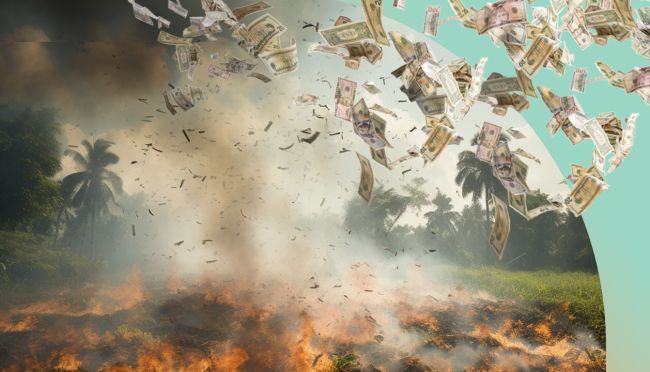
- 29 Jan 2024
- Research & Ideas
Do Disasters Rally Support for Climate Action? It's Complicated.
Reactions to devastating wildfires in the Amazon show the contrasting realities for people living in areas vulnerable to climate change. Research by Paula Rettl illustrates the political ramifications that arise as people weigh the economic tradeoffs of natural disasters.

- 10 Jan 2024
Technology and COVID Upended Tipping Norms. Will Consumers Keep Paying?
When COVID pushed service-based businesses to the brink, tipping became a way for customers to show their appreciation. Now that the pandemic is over, new technologies have enabled companies to maintain and expand the use of digital payment nudges, says Jill Avery.
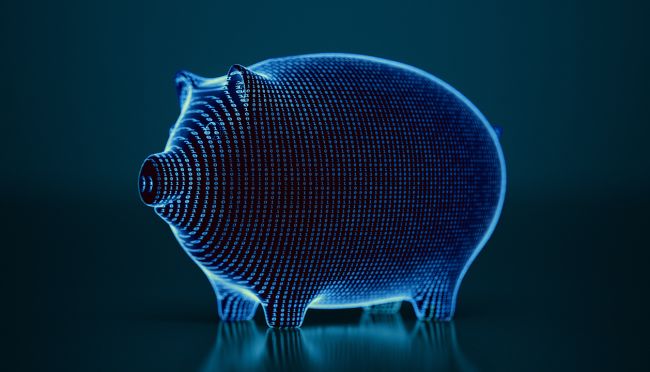
- 17 Aug 2023
‘Not a Bunch of Weirdos’: Why Mainstream Investors Buy Crypto
Bitcoin might seem like the preferred tender of conspiracy theorists and criminals, but everyday investors are increasingly embracing crypto. A study of 59 million consumers by Marco Di Maggio and colleagues paints a shockingly ordinary picture of today's cryptocurrency buyer. What do they stand to gain?
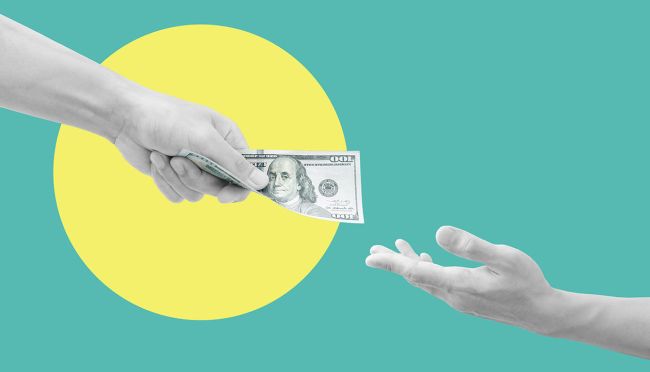
- 15 Aug 2023
Why Giving to Others Makes Us Happy
Giving to others is also good for the giver. A research paper by Ashley Whillans and colleagues identifies three circumstances in which spending money on other people can boost happiness.

- 13 Mar 2023
What Would It Take to Unlock Microfinance's Full Potential?
Microfinance has been seen as a vehicle for economic mobility in developing countries, but the results have been mixed. Research by Natalia Rigol and Ben Roth probes how different lending approaches might serve entrepreneurs better.

- 23 Jan 2023
After High-Profile Failures, Can Investors Still Trust Credit Ratings?
Rating agencies, such as Standard & Poor’s and Moody's, have been criticized for not warning investors of risks that led to major financial catastrophes. But an analysis of thousands of ratings by Anywhere Sikochi and colleagues suggests that agencies have learned from past mistakes.

- 29 Nov 2022
How Much More Would Holiday Shoppers Pay to Wear Something Rare?
Economic worries will make pricing strategy even more critical this holiday season. Research by Chiara Farronato reveals the value that hip consumers see in hard-to-find products. Are companies simply making too many goods?

- 21 Nov 2022
Buy Now, Pay Later: How Retail's Hot Feature Hurts Low-Income Shoppers
More consumers may opt to "buy now, pay later" this holiday season, but what happens if they can't make that last payment? Research by Marco Di Maggio and Emily Williams highlights the risks of these financing services, especially for lower-income shoppers.

- 01 Sep 2022
- What Do You Think?
Is It Time to Consider Lifting Tariffs on Chinese Imports?
Many of the tariffs levied by the Trump administration on Chinese goods remain in place. James Heskett weighs whether the US should prioritize renegotiating trade agreements with China, and what it would take to move on from the trade war. Open for comment; 0 Comments.

- 05 Jul 2022
Have We Seen the Peak of Just-in-Time Inventory Management?
Toyota and other companies have harnessed just-in-time inventory management to cut logistics costs and boost service. That is, until COVID-19 roiled global supply chains. Will we ever get back to the days of tighter inventory control? asks James Heskett. Open for comment; 0 Comments.

- 09 Mar 2022
War in Ukraine: Soaring Gas Prices and the Return of Stagflation?
With nothing left to lose, Russia's invasion of Ukraine will likely intensify, roiling energy markets further and raising questions about the future of globalization, says Rawi Abdelal. Open for comment; 0 Comments.

- 10 Feb 2022
Why Are Prices So High Right Now—and Will They Ever Return to Normal?
And when will sold-out products return to store shelves? The answers aren't so straightforward. Research by Alberto Cavallo probes the complex interplay of product shortages, prices, and inflation. Open for comment; 0 Comments.
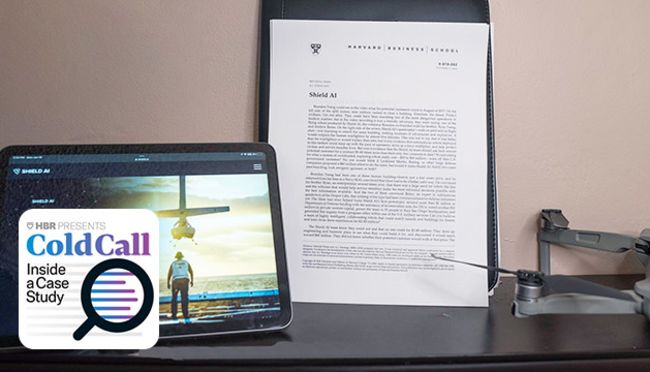
- 11 Jan 2022
- Cold Call Podcast
Can Entrepreneurs and Governments Team Up to Solve Big Problems?
In 2017, Shield AI’s quadcopter, with no pilot and no flight plan, could clear a building and outpace human warfighters by almost five minutes. It was evidence that autonomous robots could help protect civilian and service member lives. But was it also evidence that Shield AI—a startup barely two years past founding—could ask their newest potential customer, the US government, for a large contract for a system of coordinated, exploring robots? Or would it scare them away? Harvard Business School professor Mitch Weiss and Brandon Tseng, Shield AI’s CGO and co-founder, discuss these and other challenges entrepreneurs face when working with the public sector, and how investing in new ideas can enable entrepreneurs and governments to join forces and solve big problems in the case, “Shield AI.” Open for comment; 0 Comments.

- 06 May 2021
How Four Women Made Miami More Equitable for Startups
A case study by Rosabeth Moss Kanter examines what it takes to break gender barriers and build thriving businesses in an emerging startup hub. Open for comment; 0 Comments.

- 20 Apr 2021
- Working Paper Summaries
The Emergence of Mafia-like Business Systems in China
This study sheds light on the political pathology of fraudulent, illegal, and corrupt business practices. Features of the Chinese system—including regulatory gaps, a lack of formal means of property protection, and pervasive uncertainty—seem to facilitate the rise of mafia systems.
- 02 Feb 2021
Nonprofits in Good Times and Bad Times
Tax returns from millions of US nonprofits reveal that charities do not expand during bad times, when need is the greatest. Although they are able to smooth the swings of their activities more than for-profit organizations, nonprofits exhibit substantial sensitivity to economic cycles.
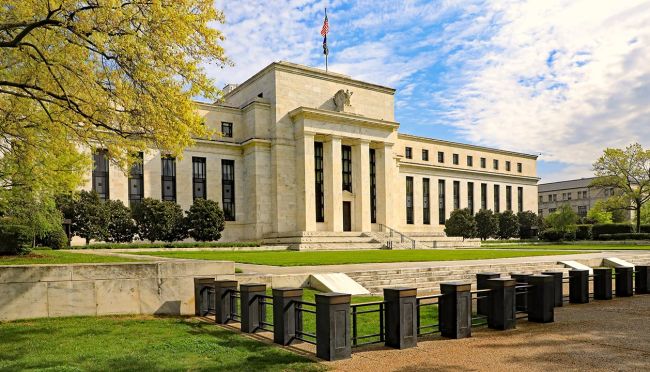
- 01 Feb 2021
Has the New Economy Finally Arrived?
Economists have long tied low unemployment to inflation. James Heskett considers whether the US economic policy of the past four years has shaken those assumptions. Open for comment; 0 Comments.
- 06 Jan 2021
Aggregate Advertising Expenditure in the US Economy: What's Up? Is It Real?
We analyze total United States advertising spending from 1960 to 2018. In nominal terms, the elasticity of annual advertising outlays with respect to gross domestic product appears to have increased substantially beginning in the late 1990s, roughly coinciding with the dramatic growth of internet-based advertising.

- 11 Dec 2020
Economic Jitters Push Pandemic Job Seekers to Big Companies, Not Startups
Small companies are receiving fewer applications, particularly from experienced professionals, according to research by Shai Bernstein and colleagues. How can startups overcome pandemic fears and compete for talent? Open for comment; 0 Comments.
- 08 Dec 2020
Party-State Capitalism in China
China’s political economy has evolved from “state capitalism” to a distinctly party-driven incarnation. Party-state capitalism, via enhanced party monitoring and industrial policy, deepens ambiguity between the state and private sectors, and increases pressure on foreign capital, prioritizing the regime’s political survival above all.
How to Write an Introduction for an Economics Essay
Louise balle, 29 sep 2017.

An economics essay discusses a topic of importance in a domestic or international economy in current events or from history. The introduction to your economics essay should indicate that you have thoroughly researched the economic principles or news. You must also present an introduction that is riveting, draws the reader in and inspires him to read more of your essay. This is where the challenge lies – to create a compelling introduction. For example, focus on a principle of economics, and then illustrate that principle with specifics. To discuss the principle of demand, you could discuss marketers who created demand for a simple product in which the marketing enhanced the original product -- such as the very successful campaign in which an ordinary rock was marketed and sold as a pet. The pet also came with an instruction booklet on how to raise the pet, as well as other accessories.
In the introduction, give the reader a few of the most important takeaways he'll have after reading your entire essay. Keep your introduction to three paragraphs or less. The introduction is a short lead-in that makes the reader more interested in the rest of the content.
Start with an interesting fact or historical note about the topic. For example, if the essay is about why a nation's real estate market collapsed, give real data about the severity of the event, such as the number of people who lost their homes or who were plagued with bad loans. A startling statistic will help bring the issue into perspective for the reader and hold her interest.
Summarize the overall premise of the economics essay. Discuss the purpose of the economics essay -- for example, your purpose might be to explain why it's important for a nation's government to take a specific action to improve its economy.
Mention new developments or policies that relate to the subject matter. For instance, if the government considers implementing financial controls on a key industry, discuss the plans and how it could affect this topic.
Ask questions pertaining to the topic that you will later answer in the body of the economics essay. For instance, if you plan to discuss why a nation's real estate market ran into problems and when it will likely rebound, ask those questions, rhetorically, in your introduction so that the reader knows you plan to address them later.
- 1 Prevent Conflict: Example of an Economics Essay Introduction
About the Author
Louise Balle has been writing Web articles since 2004, covering everything from business promotion to topics on beauty. Her work can be found on various websites. She has a small-business background and experience as a layout and graphics designer for Web and book projects.
Related Articles

Possible Topics to Write a Senior Economic Thesis On

Transitions For Essays

Tools for Economic Analysis

How to Write a Good Argumentative Essay Introduction

How to Write About an Ethical Dilemma

What Are the Problems of Teaching Economics?

What Is Better: a BA or BS in Economics?

How to Write a Persuasive Essay for Middle School

How to Develop a Problem Statement

How to Write a Policy Report

Seminar Topics for MBA Students

What is a Dissertation?

Conclusion to Globalization Projects

Microeconomics Research Paper Topics

Tips for High School Students on Creating Introductions...

How to Structure a Thesis

Topics for a Compare & Contrast Essay on Education

Definition of Micro & Macro Economics

What Is the Difference Between a Capstone and a Thesis?
Regardless of how old we are, we never stop learning. Classroom is the educational resource for people of all ages. Whether you’re studying times tables or applying to college, Classroom has the answers.
- Accessibility
- Terms of Use
- Privacy Policy
- Copyright Policy
- Manage Preferences
© 2020 Leaf Group Ltd. / Leaf Group Media, All Rights Reserved. Based on the Word Net lexical database for the English Language. See disclaimer .
Home — Essay Samples — Education — College Goals — Why Economics Major
Why Economics Major
- Categories: Academic Interests College Education College Goals
About this sample

Words: 822 |
Published: Aug 31, 2023
Words: 822 | Pages: 2 | 5 min read
Table of contents
Unveiling the fascination with economics as a major, passion for understanding the dynamics of resource allocation, analytical and critical thinking skills, societal impact of economic policies and systems, diverse applications of economics, economics as a lens to understand human behavior, quantitative skills and data analysis, global perspective and international economics, career opportunities and long-term goals, conclusion: embracing the path of exploring economics.

Cite this Essay
Let us write you an essay from scratch
- 450+ experts on 30 subjects ready to help
- Custom essay delivered in as few as 3 hours
Get high-quality help

Dr. Heisenberg
Verified writer
- Expert in: Education

+ 120 experts online
By clicking “Check Writers’ Offers”, you agree to our terms of service and privacy policy . We’ll occasionally send you promo and account related email
No need to pay just yet!
Related Essays
3 pages / 1391 words
2 pages / 1057 words
2 pages / 1110 words
1 pages / 591 words
Remember! This is just a sample.
You can get your custom paper by one of our expert writers.
121 writers online
Still can’t find what you need?
Browse our vast selection of original essay samples, each expertly formatted and styled
Related Essays on College Goals
Winston Churchill famously stated, "Success is not final, failure is not fatal: it is the courage to continue that counts." These words have played somewhat of an important part in my life. When I pursue something I want, [...]
As high school students prepare to venture into college, one of the most important decisions they will make is choosing a major. This decision will impact their academic journey, future career, and personal fulfillment. [...]
I am sensitive to numbers and curious about mathematical logic behind a phenomenon since childhood. Thus I chose my undergraduate major in Computer Science. I took a number of theoretical mathematical courses while I am always [...]
I am a senior undergraduate Civil Engineering student at the American University of Beirut expecting to graduate in June 2018 and willing to undertake graduate studies in Management, Technology, and Entrepreneurship at École [...]
The Higher Education Commission in Pakistan is an autonomous body established in 2002 under the Pakistani government, whose role is to provide policy, guidelines, and criteria for member universities, giving both the university [...]
The average student loan debt in the United States is $25,000. This is a large burden to have even for those that are able to land a high-paying job when they join the workforce after graduating college. The financial burden is [...]
Related Topics
By clicking “Send”, you agree to our Terms of service and Privacy statement . We will occasionally send you account related emails.
Where do you want us to send this sample?
By clicking “Continue”, you agree to our terms of service and privacy policy.
Be careful. This essay is not unique
This essay was donated by a student and is likely to have been used and submitted before
Download this Sample
Free samples may contain mistakes and not unique parts
Sorry, we could not paraphrase this essay. Our professional writers can rewrite it and get you a unique paper.
Please check your inbox.
We can write you a custom essay that will follow your exact instructions and meet the deadlines. Let's fix your grades together!
Get Your Personalized Essay in 3 Hours or Less!
We use cookies to personalyze your web-site experience. By continuing we’ll assume you board with our cookie policy .
- Instructions Followed To The Letter
- Deadlines Met At Every Stage
- Unique And Plagiarism Free
Effects of COVID-19 Shutdowns on Domestic Violence in the U.S.
This chapter examines the impact of COVID-19 shutdowns on domestic violence (DV) in the United States. Despite widespread concerns that pandemic shutdowns could increase DV, initial studies found mixed evidence that varied across data sources and locations. We review the evolving literature on the effects of the pandemic and highlight results from studies that examine multiple measures of DV across a common set of large cities. These studies show that the conflicting early results are due to opposite effects of pandemic shutdowns on two measures of DV in police data: an increase in domestic violence 911 calls and a decrease in DV crime reports. In theory, this divergence can come from either higher DV reporting rates, possibly because of additional media attention to DV and greater third-party calling, or from lower policing intensity for DV crimes. Prior evidence from police data and other sources supports the conclusion that the increase in calls came from greater reporting, while the incidence of criminal DV decreased. Finally, we present new evidence drawing on police and hospitals records from across the state of California to show that DV crimes and hospital emergency department (ED) visits were both lower during pandemic shutdowns.
We acknowledge financial support from the IZA COVID-19 Research Thrust and from the Bill and Melinda Gates Foundation, through the NBER Gender in the Economy Study Group Research Grants on Women, Victimization, and COVID-19. We have no competing interests to disclose. The views expressed herein are those of the authors and do not necessarily reflect the views of the National Bureau of Economic Research.
MARC RIS BibTeΧ
Download Citation Data
Working Groups
More from nber.
In addition to working papers , the NBER disseminates affiliates’ latest findings through a range of free periodicals — the NBER Reporter , the NBER Digest , the Bulletin on Retirement and Disability , the Bulletin on Health , and the Bulletin on Entrepreneurship — as well as online conference reports , video lectures , and interviews .

- Share full article
Advertisement
Subscriber-only Newsletter
Paul Krugman
Are immigrants the secret to america’s economic success.

By Paul Krugman
Opinion Columnist
When we accuse a politician of dehumanizing some ethnic group, we’re usually being metaphorical. The other day, however, Donald Trump said it straight out : Some migrants are “not people, in my opinion.”
Well, in my opinion, they are people. I’d still say that even if the migrant crime wave Trump and his allies harp on were real, and not a figment of their imagination (violent crime has in fact been plummeting in many cities). And I’d say it even if there weren’t growing evidence that immigration is helping the U.S. economy — indeed, that it may be a major reason for our surprising economic success.
But as it happens, there is a lot of evidence to that effect.
Some background here: When Covid struck, there were widespread concerns that it might lead to long-term economic “ scarring .” Millions of workers were laid off; how many of them would either depart the labor force permanently or lose valuable skills? Investment and new business formation fell. It seemed plausible that even after the worst of the pandemic was behind us, America would have a smaller, less productive work force than previously expected.
None of that happened. If we compare the current state of the U.S. economy with Congressional Budget Office projections made just before the pandemic, we find that real G.D.P. has risen by about a percentage point more than expected, while employment exceeds its projected level by 2.9 million workers.
How did we do that? American workers and businesses turned out to be more resilient and adaptable than they were given credit for. Also, our policymakers didn’t make the mistakes that followed the 2008 financial crisis, when an underpowered fiscal stimulus was followed by a premature turn to austerity that delayed a full recovery for many years. Instead, the Biden administration went big on spending, probably contributing to a temporary burst of inflation but also helping to ensure rapid recovery — and at this point the inflation has largely faded away while the recovery remains.
Beyond that, the very surge in immigration that has nativists so upset has played a big role in increasing the economy’s potential.
The budget office recently upgraded its medium-term economic projections, largely because it believes that increased immigration will add to the work force. It estimates that the immigration surge will add about 2 percent to real G.D.P. by 2034.
But are immigrants taking jobs away from native-born Americans? No. A recent analysis by Goldman Sachs contains this really interesting chart:
In case you’re wondering, “SA by GS” refers to the fact that official data aren’t adjusted for seasonal fluctuations, so Goldman Sachs has done its own seasonal adjustment.
This chart shows no rise in native-born unemployment during the immigration surge. It does show a rise in foreign-born unemployment, which I’ll come back to. But for now let’s just note that there is no good evidence that immigrants are taking away jobs from workers born in America.
Still, doesn’t immigration put downward pressure on wages? That sounds as if it could be true — in particular, you might think that immigrants with relatively little formal education compete with less educated native-born workers. I used to believe this myself.
But many (although not all) academic studies find that immigration has little effect on the wages of native-born workers, even when those workers have similar education levels. Instead of being substitutes for native-born workers, immigrants often seem to complement them, bringing different skills and concentrating in different occupations.
In some ways the current immigration surge, probably consisting mainly of less educated workers (especially among the undocumented), is a test case. Have wages for lower-wage workers declined? On the contrary, what we’ve seen recently is a surprising move toward wage equality, with big gains at the bottom :
Overall, then, immigration appears to have been a big plus for U.S. economic growth, among other things expanding our productive capacity in a way that reduced the inflationary impact of Biden’s spending programs.
It’s also important to realize that immigration, if it continues (and if a future Trump administration doesn’t round up millions of people for deportation), will help pay for Social Security and Medicare. C.B.O. expects 91 percent of adult immigrants between 2022 and 2034 to be under 55, compared with 62 percent for the overall population. That means a substantial number of additional workers paying into the system without collecting retirement benefits for many years.
Finally, let me return to that Goldman Sachs chart on unemployment rates, which shows no rise in unemployment among the native-born but a significant rise among the foreign-born. Believe it or not, that’s probably good news.
Goldman argues that the rise in foreign-born unemployment reflects a longstanding tendency for recent immigrants to have relatively high unemployment, presumably because it takes some time for many of them to get settled into sustained employment; unemployment is much lower among immigrants who have been here three years or more.
Why is this probably good news? The overall U.S. unemployment rate has crept up recently — not enough to trigger the Sahm rule , which links rising unemployment to recessions, but enough to make me and others a bit nervous .
Goldman argues, however, that this time is different. All of the rise in unemployment is among foreign-born workers — and this, they suggest, means that we aren’t seeing the kind of weakening in demand for labor that presages recessions. What we’re seeing instead, they argue, is an increase in labor supply, with many of the new workers taking some time to find their feet. If so, the Sahm rule, which has been spectacularly successful in the past, may currently be misleading.
I hope they’re right.
The bottom line is that while America’s immigration system is dysfunctional and really needs more resources — resources it would be getting if Republicans, pushed by Trump, hadn’t turned their backs on a bill they helped devise — the recent surge in immigration has actually been good for the economy so far, and gives us reason to be more optimistic about the future.
A summary of that Goldman Sachs study.
Another time dark-skinned immigrants (that is, Italians) were accused of fostering violent crime .
There are more bad economists — in the sense of being bad people — than I would ever have suspected.
New business creation is surging .
Facing the Music
“Dune: Part Two” is terrific, but I wanted more Sardaukar chanting .
Paul Krugman has been an Opinion columnist since 2000 and is also a distinguished professor at the City University of New York Graduate Center. He won the 2008 Nobel Memorial Prize in Economic Sciences for his work on international trade and economic geography. @ PaulKrugman
Search Results
The impact of Brexit on UK trade and labour markets
Prepared by Katrin Forster-van Aerssen and Tajda Spital
Published as part of the ECB Economic Bulletin, Issue 3/2023 .
1 Introduction
It has been almost two and a half years since the United Kingdom signed its post-Brexit trade deal with the European Union (EU), which was expected to have multifaceted impacts on the UK economy. The EU-UK Trade and Cooperation Agreement (TCA) was signed on 30 December 2020 and came into effect provisionally on 1 January 2021. Leaving the EU’s Single Market and the EU Customs Union represented a profound change in the economic relationship. This change was expected to have an impact on trade flows between the EU and the United Kingdom, but also on migration flows, foreign direct investment, regulation, the financial sector, science and education, and other areas of the UK economy.
While it will take some time for all the effects to emerge, this article focuses on recent developments in UK trade and labour markets, where the impacts of Brexit have been widely discussed. The coronavirus (COVID-19) pandemic is a confounding factor, but the available data allow a first stocktake of the effects of Brexit. While significant uncertainties regarding the precise magnitudes remain, the available evidence suggests that Brexit has been a drag on UK trade and has contributed to a fall in labour supply, both of which are likely to weigh on the United Kingdom’s long-run growth potential. [ 1 ]
2 Developments in UK trade flows since the implementation of the TCA
While the pandemic and supply chain disruptions have affected trade globally over recent years, Brexit had an additional impact on UK trade. The global recession and subsequent recovery in the wake of the pandemic, together with disruptions in global supply chains, have generally increased trade volatility globally over recent years. For the United Kingdom, the extensive and drawn-out negotiations on the withdrawal arrangements and on the future trading relationship generated even greater uncertainty, as also reflected in a sharp depreciation of the country’s exchange rate, which had already negatively affected investment, imports and exports during the period before the United Kingdom’s formal exit from the EU. [ 2 ] The United Kingdom’s investment growth rate was low long before Brexit, which also underlies the United Kingdom’s stagnating productivity growth. Following the Brexit referendum, a prolonged period of uncertainty about the EU-UK relationship further dampened investment. Exports have also been affected by the reduced attractiveness of the United Kingdom as an investment destination for foreign companies. [ 3 ]
Since January 2021, EU-UK trade has been governed by the EU-UK TCA, which formalised the trade and regulatory relations. The TCA ensures zero tariffs and zero quotas on goods traded between the EU and the United Kingdom. To qualify for tariff-free access, however, UK goods need to meet rule-of-origin requirements, which are set out in detailed annexes to the TCA. Thus, unlike in the Single Market, companies face additional administrative burdens and delays at the border owing to customs and regulatory checks. The United Kingdom and the EU have implemented the agreement at different speeds. While EU countries immediately applied full customs requirements and checks on imports from the United Kingdom, the United Kingdom delayed the introduction of full customs requirements on UK imports from the EU until January 2022, with additional health, safety and security checks delayed until the end of 2023.
UK goods trading volumes with the EU fell significantly after the implementation of the TCA, remaining below their pre-pandemic level until the beginning of 2022. On the import side, despite the delayed application of TCA provisions by the United Kingdom, there was a striking decline in UK imports from the EU over the first months of 2021, which contrasted with a rise in goods imports from non-EU countries (Chart 1, panels a and c). This could point to some substitution between EU and non-EU imports, with goods being redirected away from transits via EU countries. However, different cyclical conditions during the pandemic (owing to differences in case numbers and restrictions) and different exposures to global supply bottlenecks may also have played a major role. As the gap between imports from EU and non-EU partners has closed over recent months, the impact of all these factors appears to have been rather short-lived. [ 4 ] On the export side, UK exports to EU countries fell sharply immediately after the introduction of the TCA, as many exporters were struggling to meet the new paperwork requirements for documenting compliance with EU standards (Chart 1, panel b). Subsequently, UK goods exports to the EU recovered somewhat and have since moved broadly in line with exports to non-EU partners, although they remain relatively subdued compared with pre-Brexit trends (chart 1, panel d). Brexit thus remains a major factor. According to a recent survey by the British Chambers of Commerce of more than 1,100 businesses to mark two years since the TCA was signed, 77% of firms trading with the EU said the deal was not helping them to increase sales or grow their business. More than half of the firms reported difficulties in adapting to the new rules for exporting goods (45% for services). [ 5 ]
UK trade in goods with EU and non-EU countries

Source: ONS. Notes: The post-transition period started in January 2021, when the TCA entered into force provisionally. The latest observations are for January 2023.
Services trade with the EU has remained somewhat weaker than trade with non-EU partners. Most of the initially stronger decline in services trade with the EU appeared to be pandemic-related, particularly given the higher share of the travel and transportation sectors in EU trade than in non-EU trade and the travel restrictions during the pandemic (Chart 2). Together with the recovery in tourism, UK services trade has bounced back, well exceeding pre-pandemic levels. This also reflects the post-pandemic increase in travel prices. Other important categories of services exports to the EU, such as financial services, fell further than, or failed to grow as much as, exports to the rest of the world until the end of 2021 and have remained below their pre-pandemic levels. Brexit thus appears to have played some role, possibly also owing to the lack of agreements covering trade in services. In the area of financial services, which account for around 20% of total UK services exports, the TCA’s provisions were limited. The United Kingdom and EU had agreed that, alongside the TCA, they would conclude a Memorandum of Understanding on regulatory cooperation, but this has still not been signed. Since Brexit, the importance of the EU as a UK trading partner has declined, with the EU accounting for 29% of total UK financial services exports in 2022, compared with 37% in 2019.
UK trade in services and UK services exports for selected sectors

Source: ONS. Notes: The decomposition of services trade into exports to the EU and non-EU partners and imports from the EU and non-EU partners is only available in terms of values. The latest observations are for January 2023 for volumes and the fourth quarter of 2022 for services export values.
The UK current account deficit has widened since the implementation of the TCA, mostly driven by developments in the goods balance. In the first quarter of 2022, the UK current account deficit reached a record high of 7.7% of GDP, which was due to a worsening in both the trade deficit and the income balance (Chart 3). While most of the recent widening of the trade deficit could be attributed to high energy prices, the deterioration of the goods balance since the implementation of the TCA has generally been the main driver behind the developments in the UK current account. The services balance has remained fairly stable since the beginning of 2021, at around 6% of UK GDP, marking an end to the previously observed trend of rising surpluses in the UK services balance.
UK current account
a) Decomposition of the UK current account
(percentages of GDP)

b) Goods and services balances

Source: ONS. Note: The latest observations are for the fourth quarter of 2022.
The post-pandemic recovery in UK trade has lagged behind that of other advanced economies. While the United Kingdom saw a collapse in exports that was similar to other countries at the start of the pandemic, it benefited much less from the subsequent recovery in global trade (Chart 4). By the end of 2021, other advanced economies’ exports had rebounded almost to their pre-pandemic levels, while UK exports remained around 10% below that level. As a result, UK trade as a share of GDP fell by 11% between 2019 and the end of 2021 – a significantly stronger decline than that observed in the euro area or the United States. By the end of 2022, the gap between UK exports and those of other advanced countries appeared to have closed, which may indicate that the disturbances linked to the Brexit transition period are dissipating. However, this needs to be interpreted with caution. Temporary catch-up effects from the pandemic and recent changes in UK trade statistics may also account for this development.
Goods export volumes in advanced economies
(index: 2019=100, monthly data)

Source: CPB Netherlands Bureau for Economic Policy Analysis. Note: The latest observations are for January 2023.
3 Weakness in UK trade compared to other advanced economies: the role of Brexit
Two main approaches have been taken in the literature to isolate the impact of Brexit from pandemic-related effects. Various researchers have used a difference-in-difference approach, using different datasets and specifications. For example, Freeman et al., Du and Shepotylo, and Du et al. compare the evolution of UK-EU trade with UK trade with the rest of the world. Kren and Lawless, by contrast, use EU trade with the rest of the world as a comparison group. [ 6 ] Using high-frequency product-level data on trade in goods, a comprehensive set of product-time and product-partner fixed effects are applied to control for changes in trade patterns other than Brexit, in particular the changes in trade flows as a result of the COVID-19 pandemic. Following an alternative approach, Springford provided several updates of estimates of Brexit impacts using a “doppelgänger” method in which an algorithm selects countries whose economic performance closely matched that of the United Kingdom before Brexit. [ 7 ]
Taking into account the differences in methodologies, the available empirical evidence suggests that Brexit has reduced UK-EU trade in both directions. Table 1 provides an overview of recent results obtained using various approaches. Estimates of the decline in UK trade with the EU range from around 10% to 25%. [ 8 ] As the updates by Springford and Du et al. show, the results also depend on the time horizon being considered. As both UK and EU firms are still adjusting to the new environment, the gap between estimates may narrow again over time. Apart from providing estimates of Brexit effects since 2021, the available studies generally find no evidence of anticipation effects, i.e. a decline in UK-EU trade as a proportion of total UK trade prior to the provisional implementation of the TCA at the start of 2021. Across EU Member States, Brexit has led to a significant decline in trade with the United Kingdom in almost all cases, although at varying magnitudes. The decline has been most noticeable for those countries that historically accounted for a higher share of trade (i.e. trade in both directions with Ireland, exports to Cyprus and Malta, imports from Belgium and the Netherlands). [ 9 ] At the product level, it appears that there has been a substantial reduction in the number of products exported from the United Kingdom to the EU. The same is not found for exports of products from the EU to the United Kingdom. Overall, this is broadly consistent with the increased customs requirements on the EU side having a greater impact on low-value trade flows, often stopping such flows completely. At the same time, there has been an increasing concentration of export sales among fewer, larger exporters.
A selection of recent (i.e. post-Brexit) estimates of Brexit impacts on EU-UK goods trade

Source: Authors’ compilation.
A comparison of these results with those from analyses performed prior to Brexit suggests that the initial impacts following the TCA have been more severe than expected. Ahead of Brexit, many Brexit scenario simulations were performed with different types of models, assuming different levels of tariffs and non-tariff barriers. [ 10 ] For instance, based on a New Keynesian DSGE model, which assumes a free trade agreement scenario for goods trade with the euro area similar to the terms of the TCA, it was typically expected that Brexit would lead to a decrease in total UK exports and imports (in the long run) of roughly 3%, with minor effects on goods exports to the euro area but more sizeable declines in services exports to the euro area. [ 11 ] The available evidence so far suggests that the initial adverse impact on UK goods exports has been more sizeable, indicating that UK exporters, at least initially, have been struggling to meet the increased administrative requirements following the introduction of customs checks at the EU border. As developments in services appear to have been strongly driven by pandemic-related factors, further analyses would be needed to disentangle the impact of Brexit from the impact of the pandemic on this sector. [ 12 ]
4 Recent developments in the UK labour market
The UK labour market has become increasingly tight since the post-pandemic reopening, which also coincided with a fall in the number of EU migrants working in the United Kingdom. Following the post-pandemic recovery in demand in the second quarter of 2021, UK employers faced an unusually tight labour market, with a historically high number of vacancies and a low unemployment rate. Labour market tightness, measured as vacancies per unemployed person, has shown limited signs of easing, while companies have continued to struggle with recruitment difficulties (Chart 5, panel a).
Recent UK labour market developments
a) Labour market tightness and unemployment
(left-hand scale: percentages; right-hand scale: ratio of vacancies to unemployment, monthly data)

b) Labour demand and supply
(index: February 2020=100, monthly data)

Source: ONS. Notes: All series are shown as three-month moving averages. Labour market tightness is measured as vacancies per unemployed person. Data refer to UK population above 16 years old. The latest observations are for January 2023.
Weakness in labour supply has been the main driver of UK labour market tightness, while the surge in post-pandemic aggregate demand has played only a limited role. Many other advanced economies also experienced tight post-pandemic labour markets. In the same way as the initial collapse in aggregate demand at the start of the pandemic reduced recruitment of new workers, the reopening of the economy accelerated demand and encouraged companies to rehire staff. However, the persistence and the extent of labour market tightness make the United Kingdom an outlier, comparable only to the US economy. [ 13 ] One reason could be the sluggish recovery in UK labour supply, which has lagged behind other advanced economies (Chart 6). During the pandemic, many people became inactive, and, unlike the employment rate, the participation rate in the workforce has not reached pre-pandemic levels as the economy has recovered (Chart 5, panel b). A historical shock decomposition using a Bayesian vector autoregression (BVAR) analysis illustrates that the surge in UK post-pandemic labour market tightness can be attributed mainly to a smaller pool of available workers. While a faster than expected recovery was responsible for the initial rise in demand after the reopening of the economy, the analysis suggests that labour supply played a particularly important role. In contrast, aggregate supply constraints and labour mismatches appear to have been less significant (Chart 7). [ 14 ] The tightness of the UK labour market has therefore raised questions about the role of Brexit in UK labour shortages. The next section outlines the potential role of Brexit and changes in immigration policy in explaining these developments in labour supply.
Labour supply in advanced economies
(index: Q1 2020=100, quarterly data)

Sources: Organisation for Economic Co-operation and Development. Notes: Data for all countries refer to the active population between 15 and 64 years old that is either employed or actively seeking work. The latest observations are for the fourth quarter of 2022.
Labour market tightness, BVAR historical decomposition
(percentage deviation from the mean and percentage point contributions, monthly data)

Sources: ONS and ECB staff calculations. Notes: The chart shows the median posterior distribution of the historical decomposition of labour market tightness in deviation from its initial condition. Based on a BVAR estimation with sign restrictions, estimated using a monthly sample between January 2002 and January 2023. Structural shocks are identified using sign restrictions. In particular, aggregate demand shocks are identified by assuming that GDP and the consumer price index (CPI) move in the same direction, while aggregate supply shocks assume that they move in opposite directions. Labour supply shocks are assumed not to affect aggregate variables (GDP and CPI) on impact and to move tightness and wages in the same direction. Mismatch shocks affect wages and labour market tightness. Labour market tightness is measured in levels, while other variables are measured in month-on-month growth rates. The latest observations are for January 2023.
5 Weakness in UK labour supply: the role of Brexit
The Brexit referendum and the pandemic prompted a slowdown in EU employment growth as many EU workers found it less attractive to work in the United Kingdom. Prior to the 2016 referendum, successive EU enlargements had accelerated the movement of people between the United Kingdom and the rest of the EU. [ 15 ] The prospect of the Brexit referendum in June 2016 prompted a decline in EU net migration, as EU citizens found it less attractive to work in the United Kingdom. [ 16 ] The decline in new arrivals was accelerated by the onset of the pandemic in early 2020 and by the implementation of the TCA in January 2021. [ 17 ] The agreement introduced changes to UK immigration policy and ended automatic free movement for EU nationals not already settled in the United Kingdom. When looking at changes in the employment of EU citizens in the United Kingdom, it is evident that growth in such employment has slowed considerably since the Brexit referendum. A sharp fall at the onset of the pandemic was followed by a slow recovery in EU employment levels (Chart 8).
EU employment before and after the Brexit referendum
(index: Q2 2016=100, quarterly data)

Source: ONS. Notes: The chart shows employment of EU citizens in the United Kingdom before and after the Brexit referendum. The series is not seasonally adjusted. Data are shown on a quarterly basis and must be interpreted with some caution as they are based on Labour Force Survey responses weighted according to demographic trends from 2018 that pre-date the COVID-19 pandemic. “Trend 2004-2016” refers to the period between the first quarter of 2004 and the second quarter of 2016. “Trend 2016-2019” refers to the period between the third quarter of 2016 and the first quarter of 2020. The latest observation is for the fourth quarter of 2022.
The rise in UK vacancies and labour market tightness has been greatest in sectors that relied most heavily on EU workers, but this can also be attributed to a sharp recovery in demand in the sectors most affected by the pandemic. In the second half of 2021 there were many reports of UK labour shortages, ranging from lorry drivers to healthcare and hospitality workers. [ 18 ] At first glance, the sharp rises in vacancies appeared to be limited predominately to the occupations and sectors that relied most heavily on EU workers before the pandemic, as increased demand for labour potentially reflected the reduced supply of workers from the EU. These sectors also experienced a sharper increase in labour market tightness (Chart 9, panels a and b). This might imply a decline in matching efficiency in these industries, owing to an increase in skill and sectoral mismatches between those seeking work and available jobs. [ 19 ] The implications of Brexit were underlined by survey data, as, on average, 15% of UK companies cited lack of availability of EU workers as one of the reasons for their recruitment difficulties. This was particularly evident for sectors which had a high share of EU workers before the pandemic, such as accommodation and food services (Chart 10). [ 20 ] However, these sectors were also the ones most affected by the pandemic, since EU nationals were overrepresented in contact-intensive industries, which experienced the largest fall in employment during the lockdowns (Chart 9, panel c). Along with Brexit, the rapid recovery in post-pandemic consumer demand can therefore also explain a rapid surge in vacancies and labour market tightness, as firms in these sectors struggled to rehire previously laid-off staff. [ 21 ]
Labour market developments in sectors with traditionally high shares of EU workers

Source: ONS. Notes: The sectors that had the largest share of EU employees in 2015 were accommodation and food service activities (12.8%); manufacturing (10%); administrative and support service activities (9.8%); and transportation and storage (8.5%). “Other sectors” includes water supply, sewerage, waste management and remediation activities; construction; wholesale and retail trade, repair of vehicles; information and communication; financial and insurance activities; real estate activities; professional, scientific and technical activities; public administration and defence; education; human health and social work activities; and arts, entertainment and recreation. Some sectors are excluded owing to insufficient sample representation. Data for vacancies and tightness are shown as three-month moving averages. Data for unemployment are shown at quarterly frequency. The monthly series are not seasonally adjusted. The latest observations are for February 2023 for vacancies, January 2023 for labour market tightness and the fourth quarter of 2022 for employment.
Recruitment difficulties owing to reductions in EU applicants
(percentages of companies)

Source: Business Insights and Conditions Survey (ONS). Notes: The chart shows responses to the survey, which was performed at irregular intervals, in particular for sector-level data. The series display the share of businesses that reported difficulties recruiting employees and considered a reduced number of EU applicants to be one of the major factors. The latest observations are for 31 December 2022.
The slowdown in EU migration has to some extent been offset by an increase in non-EU migration. International migration was a key element in employment growth in most UK sectors before 2019. [ 22 ] Higher-skilled sectors recruited from both EU and non-EU countries, while lower-skilled sectors typically relied heavily on EU workers, given that lower-skilled workers from non-EU countries were generally not allowed to enter the UK labour market. [ 23 ] Following the Brexit referendum, the size of the EU migrant labour force began to shrink, while the share of non-EU employees was gradually increasing. The changes in total net migration indicate that by end of 2021, migration flows had returned to, or even surpassed, pre-pandemic levels. However, when only migrants seeking work are considered, the flows are much lower, albeit still relevant for labour market dynamics (Chart 11). [ 24 ] This raises the question of whether employers started to switch from EU to non-EU workers or whether the aggregate dynamics conceal asymmetries recorded at a sectoral level.
Net migration to the United Kingdom by nationality
a) Old data collection methodology
(thousands, annual data)

b) New data collection methodology
(thousands, quarterly data)

Source: Centre for International Migration (ONS). Notes: Panel a) displays annual data, while panel b) shows quarterly values since the second quarter of 2020. Each data point refers to year-end values in a particular quarter. Data on non-EU migration for work purposes in panel b) are approximated by ECB staff on the basis of the share of migration for work purposes in International Passenger Survey data. Such data are not available for EU migration under the new data collection methodology. In 2020 and 2021, study (45%) was the main reason for non-EU migration, while work (26%) and other reasons (29%) each accounted for a similar share. The latest available data show that other reasons accounted for a larger share (39%), probably reflecting an increased inflow of people arriving for humanitarian protection. The old estimates are produced using different methods from the new estimates, implying that comparisons between the two panels should be avoided. It should also be noted that the new estimates are experimental and provisional. These estimates are based on administrative and survey data from different sources, supported by statistical modelling where the data are incomplete. The latest observations are for the second quarter of 2022.
While on average the rise in non-EU arrivals has more than offset the fall in EU migration, the new migration policy has reduced labour supply in some sectors. The new migration rules had a particularly negative impact on labour supply in lower-skilled sectors. The reversal in migration flows could be explained by the new immigration system that liberalised access to the UK labour market for skilled non-EU citizens, while requiring visas for EU nationals who had previously faced no restrictions. Work permits have become attainable only for those above a certain skill and salary level. [ 25 ] This made most lower-skilled industries, which had previously relied predominantly on EU workers, ineligible to issue work visas, and prompted an increase in non-EU migration, easing shortages in some sectors and occupations (Chart 12, panel a). Sectors driving the surge in employment of non-EU citizens were, in most cases, not the same as those driving the decline in employment of EU citizens. As new visa conditions made hiring of lower-skilled EU workers more difficult, the absence of these workers became particularly apparent in sectors such as accommodation and food services (Chart 10). Firms in the hospitality industry were thus initially not able to replace workers from the EU, although the industry has observed an increase in non-EU employment over the past year (Chart 12, panel b). [ 26 ] In contrast, some other industries, such as health and social work, have not been negatively affected by the new migration rules or have even benefited from the inflow of skilled non-EU workers (Chart 12, panel c). [ 27 ] While on average the rise in non-EU employment has offset the fall in EU employment, the new migration policy has reduced labour supply in some sectors. [ 28 ] Nevertheless, the evidence available so far suggests that changes in migration flows are only one of multiple factors contributing to an increase in labour market tightness.
UK employment by nationality
(change since December 2019, thousands, monthly data)

Source: HM Revenue and Customs. Notes: The data are not seasonally adjusted and are shown as three-month moving averages. They include only payroll employment under the Pay As You Earn system and do not include other sources of employment, such as self-employment. However, the data do include individuals who were furloughed as part of the Coronavirus Job Retention Scheme. It should also be noted that these estimates are experimental and provisional. Changes in net UK employment are excluded to highlight the changes in employment of non-UK citizens. The accommodation and food sector represents 8% of total UK employment, while the health and social work sector accounts for 14%. The latest observations are for December 2022.
Brexit can only partially explain the weakness in the UK labour supply recovery, while an ageing population and pandemic effects appear to play an important role in explaining the decline in UK labour force participation. Changes in EU migration are not the only factor behind the recent changes in UK labour supply. Labour force growth had already started to decrease before the pandemic, as the United Kingdom’s “baby boomer” generation began to retire (as also observed in many other advanced economies), resulting in a marked shrinkage in the UK-born working-age population. Population ageing was countered to a certain extent by raising both male and female pension ages and through higher educational attainment, but the impact of these measures had largely dissipated by the onset of the pandemic. [ 29 ] Higher inactivity rates among those aged over 50 has contributed considerably to the increase in the inactive population (Chart 13, panel a). Other factors triggered by the pandemic have also contributed to the decline in labour participation. While the pandemic and prolonged waiting times for health services appear to have increased the number of people with long-term health issues among the inactive population, this increase is thought to be predominantly linked to individuals who were already inactive before the pandemic. When looking at flows out of the labour force, early retirement accounts for a much larger share (Chart 13, panel b). [ 30 ]
Other factors driving an increase in labour market inactivity
a) Inactive population by age cohort
(change since February 2020, thousands, monthly data)

b) Reasons for flows into inactivity for people aged between 50 and 70 years
(change compared to average for 2016-2019, thousands, annual data)

Source: Longitudinal Labour Force Survey (ONS). Notes: Data in panel a) are shown as three-month moving averages. Although the UK retirement age is currently 66, the only data available are for everyone above the age of 65. Data in panel b) refer to the change in the number of economically inactive people aged 50 to 70 years grouped by the reason for inactivity compared to the average between 2016-2019. The latest observations are for January 2023 for panel a) and December 2021 for panel b).
6 Conclusions
Almost two and a half years after the United Kingdom’s exit from the EU’s Single Market and the EU Customs Union, there is increasing evidence that Brexit has had negative effects on UK trade and the UK labour market. On the trade side, after controlling for pandemic-related effects, Brexit appears to have caused a significant decline in EU-UK trade in both directions, which, however, may recover to some extent over time, once UK and EU firms have fully adjusted to the new environment. The share of trade in GDP terms has also declined and a number of small and medium-sized UK companies have withdrawn from external trade with the EU. Regarding the labour market, there is evidence that the end of free movement for EU citizens has also contributed to the recent surge in labour shortages, particularly in sectors with lower-skilled workers. However, there have also been other, and potentially more important, drivers of the decline in UK labour force participation. Considerable uncertainty remains regarding the long-run impacts, including the extent to which the slowdown in EU trade and EU migration could weigh on potential labour supply and future productivity.
For further discussion on the impact on potential growth, see “ Monetary Policy Report ”, Bank of England, February 2023.
See, for instance, Graziano, A.G., Handley, K. and Limão, N., “Brexit uncertainty and trade disintegration”, The Economic Journal , Vol. 131, No 635, April 2021, pp. 1150-1185. For a review of developments in UK import demand and the balance of payments since the referendum, see the article entitled “ Understanding post-referendum weakness in UK import demand and UK balance of payments risks for the euro area ”, Economic Bulletin , Issue 3, ECB, 2021. Instead of benefiting from the sharp depreciation of the pound sterling, exports also suffered, given the high uncertainty and firms’ anticipation of the need to decouple.
See Driffield, N. and Karoglou, M., “Brexit and Foreign Investment in the UK”, Journal of the Royal Statistical Society Series A: Statistics in Society , Vol. 182, No 2, October 2018, pp. 559-582.
This development, however, needs to be interpreted with some caution, as data on goods imports from the EU were inflated in the first half of 2022 by delayed customs declarations from the second half of 2021. More generally, when interpreting recent developments in UK trade, it is important to note that in January 2022 HM Revenue and Customs implemented a data collection change affecting data on imports from the EU into the United Kingdom. This followed a similar data collection change in January 2021 for data on exports of goods to the EU from the United Kingdom. The Office for National Statistics (ONS) applied adjustments to 2021 EU imports to compare import and export statistics on a like-for-like basis. The full time series for imports from the EU still contains a discontinuity from January 2021.
See “ The Trade and Cooperation Agreement: Two Years On – Proposals for Reform by UK Business ”, British Chambers of Commerce, 2022.
See Freeman, R., Manova, K., Prayer, T. and Sampson, T., “ UK trade in the wake of Brexit ”, Discussion Paper , No 1847, Centre for Economic Performance, April 2022; Du. J. and Shepotylo, O., “ TCA, Non-tariff Measures and UK Trade ”, ERC Research Paper , No 98, Enterprise Research Centre, June 2022; Du, J., Satoglu, E.B. and Shepotylo, O., “ Post-Brexit UK Trade: An Update ”, Insight Paper , Centre for Business Prosperity, Aston University, November 2022; and Kren, J. and Lawless, M., “ How has Brexit changed EU-UK trade flows? ”, ESRI Working Paper , No 735, Economic and Social Research Institute, October 2022.
See Springford, J., “ The cost of Brexit to June 2022 ”, Insight , Centre for European Reform, December 2022. For more details on the methodology, see Springford, J., “ What can we know about the cost of Brexit so far? ”, Centre for European Reform, June 2022.
Results from a preliminary internal analysis performed in the context of the EU-UK network using aggregate data also lie within this range.
See Kren and Lawless, op. cit., Table 4.
For a summary of results of earlier analyses, see “ A review of economic analyses on the potential impact of Brexit ”, Occasional Paper Series , No 249, ECB, October 2020. Pre-Brexit studies were typically concerned with longer-run steady-state effects and most envisaged some stronger disruptions in advance of the referendum.
See Pisani, M. and Vergara Caffarelli, F., “ What will Brexit mean for the British and euro-area economies? A model-based assessment of trade regimes ”, Temi di Discussione (Working Papers) , No 1163, Banca d’Italia, January 2018.
There has been no recent analysis of Brexit impacts on services trade. Du and Shepotylo studied the impacts of the 2016 Brexit referendum on services trade in the United Kingdom and Ireland for the period up to the second quarter of 2020, finding that Brexit was already having adverse impacts on UK services trade ahead of the end of the transition period. See Du, J. and Shepotylo, O., “ Feeding the Celtic Tiger – Brexit, Ireland and Services Trade ”, Research Paper , Aston Business School, May 2021.
See also Gomez-Salvador, R. and Soudan, M., “ The US labour market after the COVID-19 recession ”, Occasional Paper Series , No 298, ECB, July 2022.
We introduce a BVAR model for the UK labour market that features structural identification via sign restrictions. The model includes four variables: output, inflation, labour market tightness and wages. With this set of variables, we aim to identify four shocks: an aggregate demand shock, an aggregate supply shock, a labour supply shock and a mismatch shock. A positive demand shock represents an upward shift in the demand curve, which pushes up output and inflation. A positive aggregate supply shock reflects changes in productivity or potential capacity in the economy, increasing output and reducing inflation through lower marginal costs for firms. A positive labour supply shock refers to an exogenous increase in labour supply which increases the number of participants in the labour market, leading to an increase in the number of job seekers. This makes it easier for firms to fill vacancies, leading to a decrease in labour market tightness and wages and an increase in output. A positive mismatch shock refers to exogenous changes in the process of matching jobs and workers, shifting the job creation curve upward and increasing both labour market tightness and wages in the economy.
The rapid increase in the movement of people can be attributed to several factors, such as the United Kingdom’s decision to immediately welcome nationals from the new Member States in 2004, the flexibility of the UK labour market, the appeal of London and the English language, and the attractiveness of UK universities. See Sumption, M., Forde, C., Alberti, G. and Walsh, P.W., “ How is the End of Free Movement Affecting the Low-wage Labour Force in the UK? ”, Report , The Migration Observatory at the University of Oxford and ReWAGE, August 2022.
The discouragement of EU workers can mainly be explained by the political and legal uncertainty related to Brexit, but also by the declining value of the pound sterling and the relatively better economic performance of other EU economies.
The pandemic-related exit of EU citizens partially reflected their high share of employment in high-contact services sectors, which were prone to furloughs and layoffs. In addition, the United Kingdom performed comparatively badly in terms of health sector capacities during the first wave of the pandemic.
For instance, severe shortages of lorry drivers affected the supply of retail goods, food products and fuel at petrol stations and restricted the capacity of UK ports. Shortages of butchers and workers in the meat processing industry forced farms to cull thousands of animals. In addition, there have been instances of severe recruitment difficulties in hospitality, construction, agriculture, and business and professional services.
See also “ Monetary Policy Report ”, Bank of England, February 2023.
Other sectors with above-average values were: manufacturing; transport and storage; water supply, sewerage, waste management and remediation activities; real estate activities; and education. For results from the Business Insights and Conditions Survey, see “ Business insight and impact on the UK economy: 9 February 2023 ”, statistical bulletin , ONS, February 2023.
Changes in employment do not reflect the 11.7 million jobs furloughed under the Coronavirus Job Retention Scheme, which applied from 1 March 2020 to 30 September 2021.
Workers from outside the United Kingdom accounted for 70% of the increase in employment between 2004 and 2019. The contribution from EU employment was slightly above 35%.
Some exceptions for employer-sponsored long-term visas were allowed for shortage occupations and for young people under the age of 26, while unsponsored long-term visas were available for “Global Talent”, entrepreneurs and Commonwealth citizens. Some non-EU workers were also eligible for temporary work visas. See Sumption, M. and Strain-Fajth, Z., “ Work visas and migrant workers in the UK ”, Briefing , The Migration Observatory at the University of Oxford, September 2022.
While net migration was positive in 2022, the sharp increase in non-EU inflows also reflects other factors, such as people arriving for humanitarian protection (from Ukraine and Hong Kong) and a post-pandemic surge in international students.
The new migration system introduced in January 2021 allows prospective economic migrants to apply for either a “Skilled Worker visa”, if they already have a job offer above a certain salary and skill threshold, or a “Seasonal Worker visa”, which is intended for short assignments in the agricultural and food-production sectors. The loss of free movement has therefore been offset by the more liberal regime for skilled work visas, primarily benefiting non-EU workers.
Initially, the biggest declines in EU employment were in accommodation and food services and in administrative and support services. In both sectors, employers relied heavily on EU citizens before Brexit and have not resorted to the work visa system since the pandemic, because relatively few of the jobs concerned meet the skill and salary criteria for work visas and because these employers have little experience of using the visa system in the past. See Sumption, M., Forde, C., Alberti, G. and Walsh, P.W., “ How is the End of Free Movement Affecting the Low-wage Labour Force in the UK? ”, op. cit. In 2022 these sectors recorded an increase in non-EU employment, which could be attributed to inflows of non-EU workers through the Youth Mobility Scheme, humanitarian protection visas or as dependants to the main applicants. Their flexible work rights made them likely to seek employment in low-skilled occupations. See “ Migration Advisory Committee (MAC) annual report, 2022 ”, corporate report , Migration Advisory Committee, January 2023.
The increase in non-EU workers was driven primarily by the health sector, as the high share of roles eligible for skilled work visas helped with a switch from lower levels of EU migration towards non-EU recruitment. Health sector employers are also larger on average and have more experience of using visa schemes.
Analysis comparing pre-pandemic counterfactuals to the actual outturns points to a net loss of workers accounting for 1% of the labour force. See Portes, J. and Springford, J., “ The Impact of the Post-Brexit Migration System on the UK Labour Market ”, Discussion Paper Series , No 15883, IZA Institute of Labor Economics, January 2023.
See Saunders, M., “ Some reflections on Monetary Policy past, present and future ”, speech at the Resolution Foundation, 18 July 2022.
See Boileau, B. and Cribb, J., “ The rise in economic inactivity among people in their 50s and 60s ”, IFS Briefing Note , No BN345, Institute for Fiscal Studies, June 2022.
Our website uses cookies
We are always working to improve this website for our users. To do this, we use the anonymous data provided by cookies. Learn more about how we use cookies
We have updated our privacy policy
We are always working to improve this website for our users. To do this, we use the anonymous data provided by cookies. See what has changed in our privacy policy
Your cookie preference has expired
5 major challenges that have China headed for a '100-year storm,' according to billionaire investor Ray Dalio
- The billionaire investor Ray Dalio says five major trends have China headed for a "100-year storm."
- They include a debt problem, an internal wealth gap, and increasingly fraught relations with the US.
- "The circumstances and the mood in China have indisputably changed to become more threatening," he said.
There are major economic and geopolitical challenges brewing a "100-year storm" in China, says the billionaire investor Ray Dalio.
In a LinkedIn post on Wednesday, Dalio listed five major forces casting a shadow on Beijing, detailing headwinds he says have been building up over the past four decades.
"When there is a lot of debt and big wealth gaps at the same time as there are great domestic and international power conflicts and/or great disruptive changes in nature (like droughts, floods, and pandemics, which China is especially prone to) and great changes in technology, there is an increased likelihood of a '100-year big storm,'" Dalio wrote. "That is the current environment in China."
Related stories
First, the debt problem . China has for the past few years been mired in a property crisis that has hamstrung its economy by sending real-estate prices, asset prices, and employment in a downward spiral. On top of that, the country has an aging population, which is weighing on the financial system, especially under the legacy of the one-child policy. Dalio said those trends were depressing economic activity, prices, and psychology.
Then there's a growing internal wealth gap that has spurred the government to push for more "common prosperity," Dalio said. He added that the shifting policy focus had been "fear-inducing," which has additionally soured the mood in China.
Next, there's the increasingly fraught relations with the US . The power conflict between the two countries has bled into investor sentiment, steering money away from China. Businesses have been caught in the crossfire too, trying to appease the US.
"In trade and capital flows, a cat-and-mouse game has developed that has led companies and people to move to neutral countries and to try to appear to be non-Chinese or not Chinese sympathizers, so much so that the Chinese are having problems getting other countries and companies to accept them being there and/or investing in them," Dalio wrote.
China is also dealing with a technological war with the US, Dalio wrote. Both countries are pouring money into technologies including AI and quantum computing, each trying to get the lead over the other, he said.
Finally, there are the risks of the climate crisis , including floods, droughts, and pandemics, all of which are likely to cost a lot, he said.
"The circumstances and the mood in China have indisputably changed to become more threatening," Dalio said.
Watch: Protesters in China are trying to break out of quarantine
- Main content

IMAGES
VIDEO
COMMENTS
WRITING ASSIGNMENTS IN ECONOMICS 970 In Sophomore Tutorial (Economics 970), you will receive several writing assignments including a term paper, an empirical exercise, short essays, response papers, and possibly a rewrite. Below is a description of these types: • Term Paper (10-15pp.). In all tutorials, you will be required to write a
undergraduate research papers), remember that you are crafting an economics research paper, not a newspaper column! Sharpening your economics writing skills is crucial in communicating top-notch research effectively. Remember, your paper's impact may suffer if your writing is: • grammatically flawed, • unclear, or • excessively ...
Economics is the study of how humans make decisions in the face of scarcity. These can be individual decisions, family decisions, business decisions or societal decisions. If you look around carefully, you will see that scarcity is a fact of life. Scarcity means that human wants for goods, services and resources exceed what is available.
II, "Researching Economic Topics," tries to explain the scholarly and analytical approach behind economics papers. The third part, "Genres of Economics Writing," briefly surveys some of the kinds of papers and essays economists write. It is in the fourth part, "Writing Economics," that the manual homes in on discipline-specific writing.
Economics is a social science that deals with the production, distribution, and consumption of goods and services. It is concerned with how individuals, businesses, and governments make decisions about allocating resources to satisfy their unlimited wants and needs. Economics as a science provides a framework for analyzing society's production ...
1. Read the question carefully. The first thing to do if you have an economics essay assigned is carefully read and analyse the question. It's essential that you fully understand what you are being asked and keep this in your mind throughout. Pick out the essential point from the question and highlight it.
Conclude your essay. In your conclusion, summarize and synthesize your work by restating your thesis. Also, it is crucial to strengthen it by mentioning the practical value of your findings. Remember to make your essay readable by choosing appropriate wording and avoiding too complex grammar constructions.
Top 10 Reasons For Studying Economics. Inflation explained by Victor Borge. Funny Exam Answers. Humorous look at Subprime crisis. A collection of macro-economic essays on topics Inflation, Economic growth, government borrowing, balance of payments. Evaluation and critical analysis of all latest issues of the current day.
Some tips for writing economics essays Includes how to answer the question, including right diagrams and evaluation - primarily designed for A Level students. 1. Understand the question. Make sure you understand the essential point of the question. If appropriate, you could try and rephrase the question into a simpler version. Q. Examine the ...
This is because economics writing is different from many other types of writing. It is essentially technical writing, where the goal is not to turn a clever phrase, hold the reader in suspense, or create multi-layered nuance, but rather to achieve clarity. Elegant prose is nice, but clarity is most important.
The economic dimensions of climate change, international trade, racism, justice, education, poverty, social preferences, and economic growth are just a few of the topics that Banerjee and Duflo cover in their class: Economics and Society's Greatest Problems.
Fiscal policy plays a crucial role in shaping economic conditions and promoting growth. During periods of economic downturn or recession, governments often resort to fiscal policy measures to stimulate the economy. This essay examines the significance of fiscal policy in economic stimulus, focusing on two key tools: government spending and ...
Economics is the study of given ends and scarce means. Lionel Robbins, biography, from the Concise Encyclopedia of Economics: Robbins' most famous book was An Essay on the Nature and Significance of Economic Science, one of the best-written prose pieces in economics. That book contains three main thoughts.
Among the main topics you can discuss in economics research are: Fundamental economics, cost to benefit analysis, and importance of decision-making; Microeconomics, market structure, and strategies, competition; Personal economics, spending habits, personal investment; Social economics, class structure, the cultural impact of economics.
In this essay we will discuss about Economics. After reading this essay you will learn about: 1. Subject Matter of Economics 2. Economics as a Science 3. Economics as an Art 4. Neo-Classical View of Marshall 5. The Classical View of Adam Smith 6. Basic Concepts of Economics 7. Types of Goods in Economics 8. Utility in Economics. Contents: Essay on Subject Matter of Economics Essay on Economics ...
Economics Revision Essay Plans. Last updated 17 Dec 2019. This series of resources provides revision essay plans for a wide variety of essay topics, including synoptic questions. For the 2019 papers check out our collection of videos on building A* evaluation into your answers. Have you tried our series of more than 50 Quizlet revision ...
A historical overview economics essay could take the form of a comprehensive overview of a specific time period (and its impact on society). An overview might also focus on one specific component of the economy (such as interest rates or technology) and trace its impact throughout a time period. Sample essays: An introduction to the history of…
The Outline. Always make an outline of an essay before writing it. An essay can be written by making successively more detailed outlines. Identify the three important points, and break each of them down into several parts (A.,B., and C.). These will become topic sentences for paragraphs. Then "flesh-out" each paragraph.
Why I Chose to Study Economics: A Student Shares Her Story. Just before my senior year of high school, I decided on a whim that I wanted to take the AP Economics course that my high school offered. Going into it, I had next to no knowledge about any economic topic. At the time, my older sister, who was in college, had taken an economics course ...
This study sheds light on the political pathology of fraudulent, illegal, and corrupt business practices. Features of the Chinese system—including regulatory gaps, a lack of formal means of property protection, and pervasive uncertainty—seem to facilitate the rise of mafia systems. 02 Feb 2021. Working Paper Summaries.
An economics essay discusses a topic of importance in a domestic or international economy in current events or from history. The introduction to your economics essay should indicate that you have thoroughly researched the economic principles or news. You must also present an introduction that is riveting, draws the reader in and inspires him to ...
AIMS AND SCOPE OF JOURNAL: The Annual Review of Economics covers significant developments in the field of economics, including macroeconomics and money; microeconomics, including economic psychology; international economics; public finance; health economics; education; economic growth and technological change; economic development; social economics, including culture, institutions, social ...
Choosing a major is a significant decision that shapes one's academic journey and future career path. In this essay, I will delve into my decision to major in economics, highlighting the motivations, interests, and goals that drive my pursuit of this field of study. By examining the various aspects of economics that intrigue me, I hope to shed ...
Essay from The Economist. You've seen the news, now discover the story.
Summary: We construct a country-level indicator capturing the extent to which aggregate bank credit growth originates from banks with a relatively riskier profile, which we label the Riskiness of Credit Origins (RCO). Using bank-level data from 42 countries over more than two decades, we document that RCO variations over time are a feature of ...
Download Family Resources and Human Capital in Economic Downturns [PDF - > 1MB] I study how recessions impact the human capital of young adults and how these effects vary over the parent income gradient. Using a novel confidential linked survey dataset from U.S. Census, I document that the negative effects of worse local unemployment shocks on ...
DOI 10.3386/w32259. Issue Date March 2024. This chapter examines the impact of COVID-19 shutdowns on domestic violence (DV) in the United States. Despite widespread concerns that pandemic shutdowns could increase DV, initial studies found mixed evidence that varied across data sources and locations. We review the evolving literature on the ...
Beyond that, the very surge in immigration that has nativists so upset has played a big role in increasing the economy's potential. The budget office recently upgraded its medium-term economic ...
The new migration system introduced in January 2021 allows prospective economic migrants to apply for either a "Skilled Worker visa", if they already have a job offer above a certain salary and skill threshold, or a "Seasonal Worker visa", which is intended for short assignments in the agricultural and food-production sectors.
There are major economic and geopolitical challenges brewing a "100-year storm" in China, says the billionaire investor Ray Dalio. In a LinkedIn post on Wednesday, Dalio listed five major forces ...